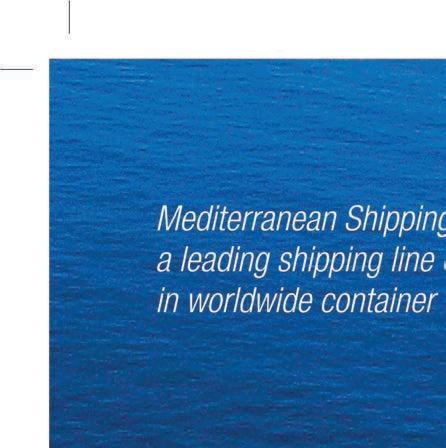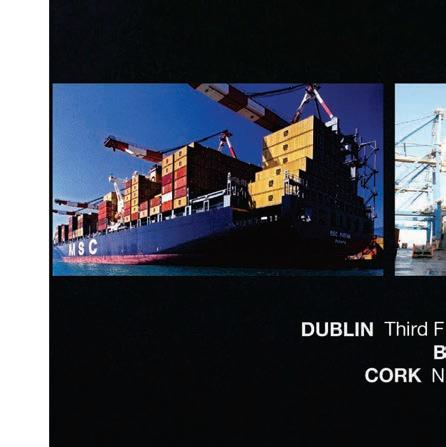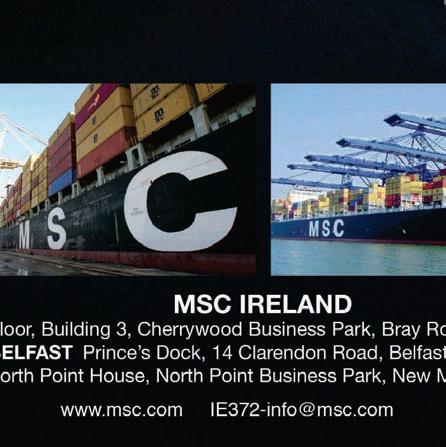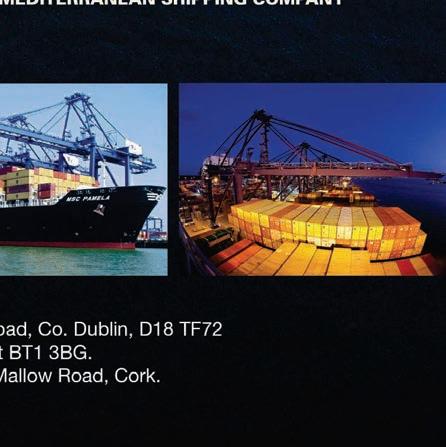






NI Chamber’s new President Kailash Chada on why it is time for brave decision making.

























Convenient travel from the of Belfast to the UK, Europe, and beyond heart


CIPR NI MAGAZINE OF THE
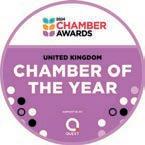
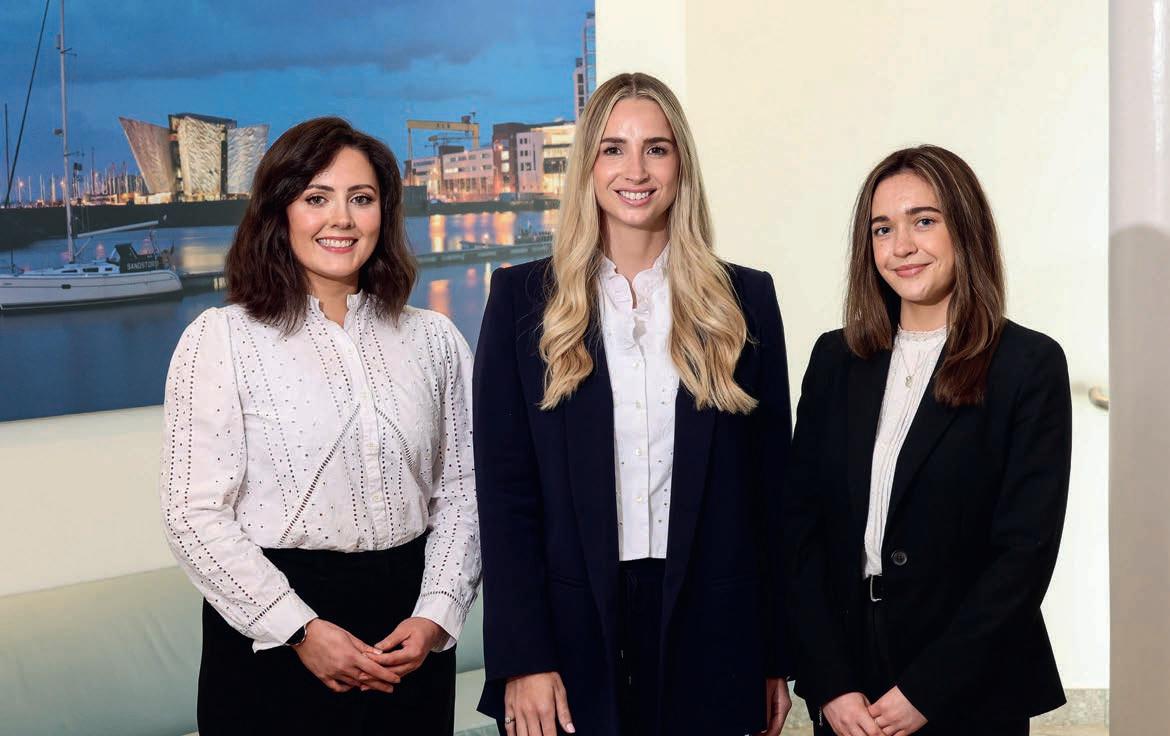
Managing Editor: Olivia Stewart Interviews: Emma Deighan Publisher: Chris Sherry Advertising Managers: Lorraine Gill & Julie Patterson Editorial Assistant: Joanne Harkness Email addresses: olivia.stewart@northernirelandchamber.com / l.gill@ulstertatler.com / j.patterson@ulstertatler.com Websites: www.northernirelandchamber.com / www.ulstertatler.com Publisher: Ulster Tatler Group, Unit 26 Ormeau Businss Park, Belfast, BT7 2JA Tel: 028 9066 3311 Printed by: W&G Baird, Antrim. Front Cover Photo by: Khara Pringle.
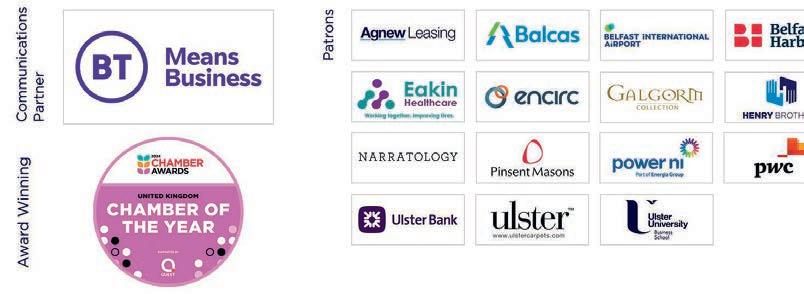
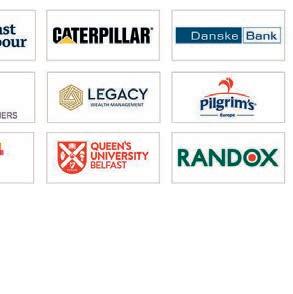


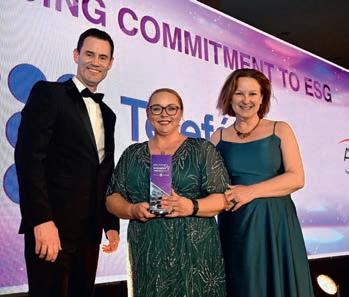
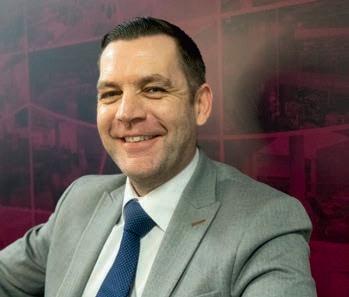
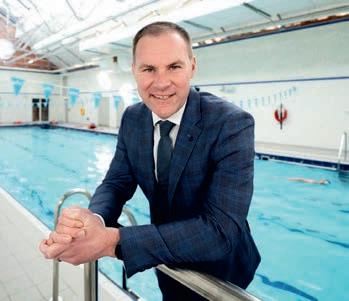
62
65
78
76-77
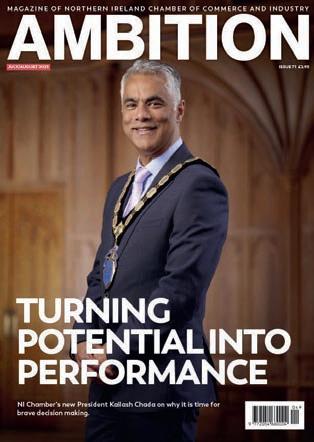

Northern Ireland stands at a tipping point. Our outdated, underfunded wastewater infrastructure is no longer a problem that can be patched up – it is now so inadequate it is actively damaging our economy, choking the construction sector, and placing our ability to meet basic housing needs in jeopardy.
A joint position paper recently commissioned by NI Chamber, the Construction Employers Federation (CEF), and the Northern Ireland Federation of Housing Associations (NIFHA) lays bare the consequences of inaction. Drawing on analysis from Grant Thornton and Turley Economics, it confirms what our members and communities have known for too long: without urgent strategic investment in wastewater infrastructure, we cannot build, grow, or plan with any confidence.
This is not a technical issue – it is a societal one. Housing is a human right, yet right now, thousands of families across Northern Ireland are stuck in limbo, unable to access safe, affordable homes because the infrastructure needed to support development does not exist.
But the fallout doesn’t end with housing. The economic consequences of this infrastructure failure are vast. New commercial projects are being delayed or cancelled altogether and
investors – who might otherwise bring jobs and opportunity to Northern Ireland – are choosing to put their money elsewhere.
At the core of the issue is NI Water’s funding model. Unlike other utilities in the UK, NI Water is unable to borrow or raise capital like a standard regulated utility. It is bound by public expenditure rules, which means it simply cannot deliver the infrastructure our society and economy requires.
Our joint report proposes that a multifaceted solution is needed, which includes proposals made by the Infrastructure Minister, a government-backed Infrastructure Transformation Fund, and a modest, progressive Infrastructure Levy to help close the extensive £2bn funding gap. Any such levy would be far from an amount that would represent a water charge.
What’s at stake here isn’t just a new fiscal model – it’s about making Northern Ireland a place where businesses want to invest, where young people can afford to live, and where infrastructure serves everyone in society.
We must confront this challenge with urgency, clarity, and courage. Doing nothing is not an option. The prize of action on the other hand will facilitate a housing system that works, a construction sector that thrives, a cleaner environment, and an economy that can deliver better jobs for our society in the future.
Kailash Chada, President, Northern Ireland Chamber of Commerce and Industry







AC Hotel by Marriott Belfast celebrated its seventh year in the city with an exclusive summer event. The event featured a curated culinary journey by Jean-Christophe Novelli, fresh from filming the latest season of MasterChef Australia.
Paula Stuart, general manager at AC Hotel by Marriott Belfast, said: “Celebrating seven years with such a special event on The Terrace was the perfect way to thank our loyal customers and partners. We were delighted to welcome back renowned Chef Jean-Christophe Novelli to help mark this milestone. It gave us an opportunity to showcase our refreshed food offering, introduce the new express lunch menu, and highlight our progress as a hotel. From sustainability innovations to continued investment in guest experience, we are proud of what we’ve achieved, and even more excited about what’s ahead.”

As part of its longer-term investment plans, the hotel has announced a soft refurbishment of its bedrooms and public areas, scheduled for completion by Q1 2026. This follows the recent completion of a £50,000 project to install photovoltaic (PV) solar panels, which is already reducing electricity consumption by up to 15%.
CGI, one of the largest independent IT and business consulting services firms in the world, has announced the relocation of its Belfast Centre of Excellence to The Kelvin and the appointment of Eamon McHugh to lead the Belfast team.
These strategic moves reinforce CGI’s growth strategy and demonstrate its commitment to supporting digital transformation across Northern Ireland’s public services and broader industries.
By the end of this year the new office is expected to accommodate a team of 50 employees, many of whom are already supporting the design and delivery of Themis – the 20-year flagship business transformation programme for Northern Ireland Courts and Tribunals Service.
“Since establishing our presence in Belfast in 2023, we have become a recognised leader in the IT sector, delivering innovative digital solutions to key public sector clients,” said Chris Shorthouse, Vice-President, Client Engagement, Scotland & Northern Ireland at CGI. “This investment in our new office and in our senior leadership team marks a significant milestone in our expansion strategy, enabling us to bring our global expertise to the Northern Ireland market in a more impactful way.”
Eakin Healthcare has unveiled the world’s largest ostomy bag production line as part of a transformative £60 million investment programme that will significantly benefit its operations across the UK.
The new production line, located at the company’s Cardiff Business Park facility, represents a £9 million investment and marks the first phase of a wider strategy to future-proof Eakin Healthcare’s manufacturing capabilities. The 32-metre-long line, affectionately named “The Stomatic Line” by local schoolchildren, will increase production capacity fourfold to meet growing global demand for the company’s flagship ModaVi ostomy pouches.
Padraic Dempsey, CEO of Eakin Healthcare, commented:
“This investment is a clear demonstration of our commitment to manufacturing in the UK and our confidence in the expertise of our 200 colleagues in Cardiff. This high-tech production line allows us to deliver reassurance and comfort to ostomates around the world as we continue to scale innovative ostomy care products.
“The next two phases of our £60 million programme will focus on advancing our manufacturing capabilities here in Northern Ireland across both our Respiratory and Ostomy portfolios. This investment will bring cutting edge technology, product innovation and sustainable employment, enhancing our ability to serve our customers, patients and clinicians around the world.”
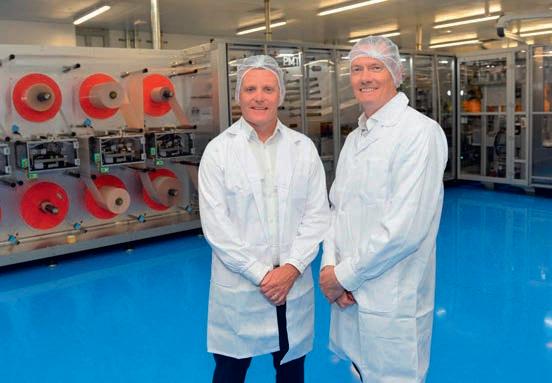















Sensata Technologies welcomed the Deputy First Minister to open its new research and development centre in Newtownabbey.The opening of the new Northern Ireland Technology Centre (NITC) is the culmination of a five-year project to bring together Sensata’s 360 highly skilled engineering and support staff. The NITC is made up of two sustainability accredited buildings, totalling 67,000 sq ft, which house testing and research labs for Sensata’s engineering teams, a garage which accommodates both Heavy Goods Vehicles (HGV) and automotive vehicles, a customer demonstration room and flex desks, bookable offices and meeting spaces.
Stephan von Schuckmann, CEO of Sensata Technologies, said: “The opening of the Northern Ireland Technology Centre marks a major milestone for Sensata Technologies – both locally and globally. Designed by our teams, for our teams, this facility brings together colleagues who were previously spread across five separate sites, creating a single hub to foster creativity, collaboration, and innovation.”
Sensata’s new facility has been designed to meet BREEAM sustainability standards to minimise impact on the local area. It was built by JH Turkington & Sons Ltd over a two-year construction phase that supported 150 jobs for suppliers and subcontractors.
Morrow Communications crowned as ‘Large Consultancy of the Year’
Morrow Communications has been crowned the 2025 ‘Large Consultancy of the Year’ at the PRCA DARE Awards held at The Merchant Hotel, Belfast.
Morrow also picked up five category trophies recognising outstanding client work including Best Business-to-Business Campaign, Best Public Sector Project, Best Digital and Social Media Campaign, Best Low Budget Campaign and the Diversity, Inclusion and Purpose Award. Speaking about the achievements Kieran Donnelly, managing director, Morrow Communications said: “We are so grateful to our amazingly talented and committed team and our fabulous clients who trust us with their communications. Winning these accolades and having this creativity and hard work recognised by our peers across the UK is hugely satisfying and feels even more special as we mark 40 years of business this year.”
Catalyst has secured funding under the PEACEPLUS Innovation Challenge Fund to lead NWCAM2 – the North West Centre for Advanced Manufacturing 2, which will work with businesses in Northern Ireland and the border counties of Ireland.
The project, which is supported by PEACEPLUS, has received funding of €9,981,033 and will be led by Catalyst, in partnership with Atlantic Technology University (ATU), North West Regional College, Ulster University, Trinity College Dublin and Irish Manufacturing Research Centre.
NWCAM2 will address crucial challenges in the life and health sciences sector by supporting SMEs in the development of environmentally sustainable manufacturing processes and products, enabling them to innovate, reduce emissions and compete on a global scale.

we create trusted connections with communities across Northern Ireland.




















Creagh Concrete has signed a three-year agreement with the Budget Energy SuperCupNI, to become an Official Partner of the worldrenowned international youth football tournament.
The long-term agreement strengthens Creagh Concrete’s long-standing commitment to elite and grassroots sport across Northern Ireland and supports the tournament’s continued mission to deliver a world-class platform for emerging football talent. Seamus McKeague, CEO of Creagh Concrete, said: “We’re proud to support the Budget Energy SuperCupNI as an Official Partner. This partnership reflects Creagh’s long-standing commitment to youth sport, community engagement and helping young people realise their potential.
“The tournament offers a unique opportunity for local talent to test themselves against some of the world’s top academies, building confidence, resilience and ambition in the process. Beyond the pitch, it creates unforgettable memories for players, their families and the communities they represent. That lasting impact is what makes the Budget Energy SuperCupNI so special, and we’re delighted to play our part in making it happen.”
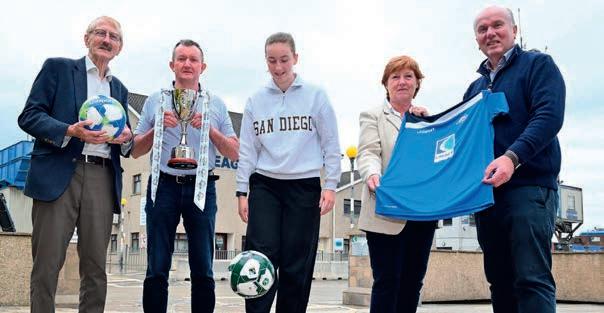
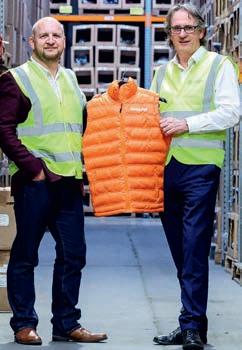
Dungannon-headquartered Tailored Image is enjoying a sustained period of growth in its sector whilst committing to significant investment to support its ongoing fast growth. With major contracts signed, the company has extended its market share in the UK and Ireland and developed its remit into 15 European countries, with the inclusion of easyJet and Enterprise Rent-a-Car amongst its many high-profile customers. The locally-owned company which designs, manufacturers and fulfils corporate uniform requirements for large organisations, has committed to significant investment to support its ongoing fast growth.
It has also partnered with GCD Technologies, which provides custom software to many of Northern Ireland’s most ambitious companies, to invest further in its market-leading technology platform that has been key to winning the new business. Brendan Birt, operations director at Tailored Image, commented: “Tailored Image’s innovative technology platform is one of its key differentiators in the market and this partnership with GCD will enable us to continue to enhance and expand the offering to support our ambitious growth plans.”
SistersIN empowers over 650 young women across NI to become leaders of
SistersIN, the pioneering leadership programme for sixth-form girls across Northern Ireland, has revealed that over the past year it has supported 659 young women from 49 schools in their journey to become leaders of tomorrow. Since launching in 2022, the programme has dramatically increased its reach with the number of girls taking part rising by 250% and the number of participating schools increasing fivefold.
The report reveals a 101% rise in mentors and a 91% increase in organisational involvement in the past year alone. Notably, 77% of participating schools now have medium to high levels of pupils receiving free school meals, reflecting SistersIN’s commitment to broadening access and opportunity.
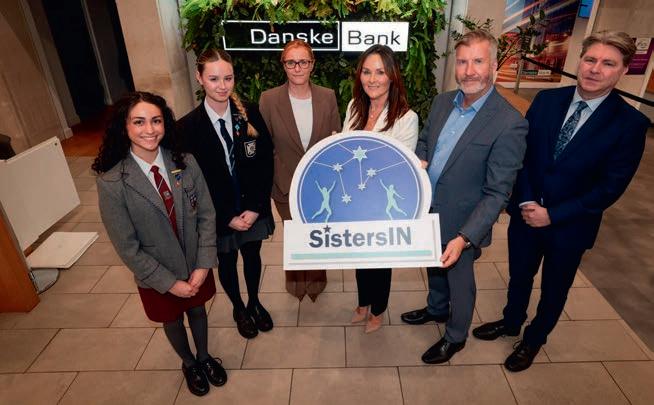
The 2025 report highlights the programme’s unique blend of leadership training, mentorship and real-world project experience. On average, each pupil impacted 20 people through their project, with this year’s cohort collectively affecting 13,475 people in Northern Ireland.
Peter Dobbin, chair of SistersIN, said: “What began as a bold idea to help address the gender gap in leadership roles is now a proven model, empowering almost 700 girls this year across 49 schools – each one inspired, equipped and ready to lead. The growth of this programme has been both remarkable and organic, fuelled by an unwavering belief in the potential of our young women and the power of meaningful mentorship. Together our mentors, partners, educators and supporters are shaping not just futures, but a more equal and inspiring society.”
The organisation is actively recruiting mentors and seeking new partnerships to support its mission of building a more equitable future through leadership and opportunity.




























































LumenStream, a climate tech company that is revolutionising energy efficiency through its “Lighting as a Service” model, has secured £1.2m in investment.
The funding round was led by a local angel investment syndicate, with significant participation from Co Fund III, managed by Clarendon Fund Managers. Techstart Ventures, the company’s initial first-cheque, lead investor, also played a pivotal role in the round.
This substantial capital injection will enable LumenStream to scale the deployment of its zero-upfront-cost smart lighting solutions, empowering larger energy consumers to significantly reduce CO2 emissions and operational costs. LumenStream’s unique “Pay as you Save” offering allows businesses to upgrade to efficient lighting technology without capital expenditure, generating positive cash flow from day one.
The company has secured several high-profile customers, including Siemens, Wickes, Oxfam and Ryobi, and is currently in the process of expanding its team by hiring for roles in accounting, sales and technical support.
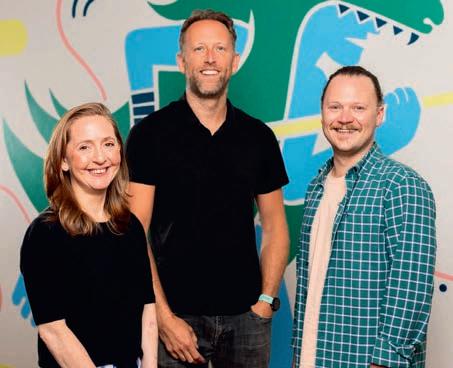
Alistair Brown, CEO of LumenStream, said: “This £1.2m investment marks a pivotal moment for LumenStream. We are incredibly grateful for the continued trust and support from our investors. This funding will accelerate our mission to make energy efficiency the ‘first fuel’ for businesses, expanding our reach and reinforcing Belfast’s position at the forefront of green innovation.”
Stephen McKeown, global vice president of Allstate and managing director of Allstate NI, has been accepted into the prestigious Forbes Technology Council, an invitation-only community for senior-level technology executives.
The Forbes Technology Council brings together the most accomplished leaders in technology from around the globe. Members are selected by a rigorous vetting process based on their deep expertise, career accomplishments and proven ability to drive measurable impact across their organisations.
Recognised as a leading voice in digital transformation, McKeown will gain access to a curated network of industry peers and opportunities to publish insights on Forbes.com, contributing to the global discourse on technology leadership and innovation.
Draperstown-headquartered Sperrin Metal Products Ltd has been acquired by Tierco Group, the owners of successful Limavady-based specialist therapeutic seating manufacturer Seating Matters.
One of the last independently owned storage manufacturers in the UK and Ireland, Sperrin Metal Products Ltd was established in 1963 by a committee of local businesspeople to provide employment in the Draperstown area.
The company employs over 100 people in its manufacturing facilities across the UK and Ireland, including its 150,000 sq ft site in Draperstown, specialising in the manufacture of storage systems such as racking, shelving, mezzanines, lockers and cubicles. It counts household names like Nissan, Coca Cola and the NHS amongst its customers. Tierco Group has acquired 100% of Sperrin Metal Products from its previous owner Peter Gormley for an undisclosed sum.
Following the acquisition Ryan Tierney, previously Operations Director at Seating Matters, becomes Managing Director of Sperrin Metal Products. Current Managing Director Peter Gormley will become the new Commercial Director of the business.
Ryan Tierney, Managing Director of Sperrin Metal Products said: “Sperrin Metal Products is a brand known to anyone in the manufacturing world and respected as a prestigious employer and key part of the local community. When we learned there was an opportunity to purchase the business from Peter, we were excited by the potential that existed to build on the fantastic legacy they have created. I believe that Sperrin Metal can achieve significant growth in future, and to achieve that goal we plan to invest in both new jobs and new plant and machinery.”
Cooper Parry (CP) has announced the acquisition of Northern Ireland powerhouse CavanaghKelly. This is the 15th deal in just over two years as CP’s unique challenger spirit drives big firm capability, boutique energy and people-first delivery. It is also the third deal since partnering with New York-based Lee Equity Partners in December 2024.
For 25 years, the seven partners and 100-strong CavanaghKelly team have built a reputation as one of the region’s most respected multi-service line accountancy and business advisory firms.
Des Kelly, CavanaghKelly founding partner, said, “In selecting the right partner for the next phase of our growth journey, we went through a thorough evaluation of our options. Immediately, Cooper Parry stood out, creating an incredibly strong first impression. Our alignment on values, vision and ambition couldn’t be stronger. The deeper our discussions became, the clearer it was that CP’s bold vision for service lines, tech, outsourcing and delivery models aligned perfectly with ours – challenging the norm, thinking differently and delivering quality service through quality people. We cannot wait to be part of this.”
Catherine Martin, CavanaghKelly managing partner, added, “Joining CP presents an exciting opportunity to accelerate our journey. It’s an exciting time for our staff and our clients, and we’re looking forward to what we can achieve together.”
Symptoms
• Pain, numbness, tingling, or weakness in the hand and fingers. Especially affects the thumb, index, and middle fingers.
• Symptoms often worsen at night.
• Can affect your ability to grip objects or perform tasks.


We use our hands and wrists every day for personal care, work, leisure and much more. When soreness, discomfort or stiffness occur in your hands and wrists, it can be incredibly inconvenient.
It’s important to get diagnosis and treatment of your hand and wrist pain and conditions from an experienced surgeon to ensure a quick and effective recovery.
Symptoms
• Pain, stiffness, and a clicking or popping sensation when moving the finger.
• Finger may become locked in a bent position and then suddenly pop straight.
• Symptoms often worsen in the morning.
• Can affect your ability to grip objects or perform tasks.





Stuart Lunn
Lugh Systems
Northern Ireland’s energy transition is stuck in a twospeed mindset. At the top, we’ve got ambitious targets, strategic documents, and grid investment plans that sometimes read more like a ten-year novel than action plans. At the bottom, households are being asked to swap out boilers, turn down thermostats, and stick solar panels on rooftops.
But in the middle? Silence. And that silence is costing us.
It’s time we acknowledged the gap – and started building the layer of the energy system that’s been hiding in plain sight: mid-scale, blended generation, designed by and for the businesses who actually use the energy.
Because when all you have is a hammer – a national grid and a onesize-fits-all approach – then every energy challenge starts to look like a nail. And that mindset is no longer fit for purpose.
Instead, we need systems that blend wind, solar, storage, and bioenergy at a local level. Systems that respond to realtime needs. Systems that can operate independently or support the wider grid flexibly. Not someday. Today.
Let’s be clear: this isn’t fringe thinking. It’s already happening – in logistics depots, food processors, and manufacturing hubs. But it’s happening slowly. Too slowly. Uptake is patchy. And one of the biggest reasons? Businesses assume it’s only for the big guys.
That couldn’t be further from the truth.
Modern systems are modular. Scalable. Fundable. Just as suitable for an agri-business in Fermanagh as a data centre in Antrim. And with grid-forming technology, these systems don’t just
feed into the grid – they set the pace. They can balance voltage and frequency locally, operate in island mode if needed, and put energy resilience back in the hands of the user.
And when you combine grid-forming capability with blended generation, the advantages multiply.
Diversity is strength. No single source of generation – not wind, not solar, not even battery – will win this alone. But together, they can deliver something the traditional grid is increasingly struggling to provide: energy independence and
“We need a shift in mindset – from energy as overhead to energy as opportunity. From passively waiting on upgrades to actively shaping local systems.”
security. A system that doesn’t fall over when the wind drops or the sun sets. A system that can flex with business needs. A system that doesn’t have to ask for permission to grow.
The infrastructure bottleneck is real – we see it every week. Connection offers that take years. Projects shelved because of substation limitations. Growth plans paused because power can’t be guaranteed. These aren’t theoretical risks – they’re boardroom blockers.
But here’s the thing: we don’t have to wait for someone else to fix it.
Many of the technologies that solve this are ready now. Off the shelf? No. Off the cuff? Definitely not. But designed, integrated, and deployed – absolutely. And with the right advice, many of these systems qualify for enhanced capital allowances or green finance support. The obstacle is rarely technical. It’s cultural.
We need a shift in mindset – from energy as overhead to energy as opportunity. From passively waiting on upgrades to actively shaping local systems.
Northern Ireland has always done well when it leans into complexity with creativity. We’ve built global businesses from barns and led renewables innovation with fewer resources than most. The tools are here. The talent is here. The urgency is undeniable.
So, let’s get serious about this missing middle. Let’s build systems that reflect the realities of doing business in Northern Ireland – not the assumptions of a centralised model.
Because energy transition isn’t a product you buy. It’s something you design. And business – not just policymakers – has a lead role in drawing the blueprint.





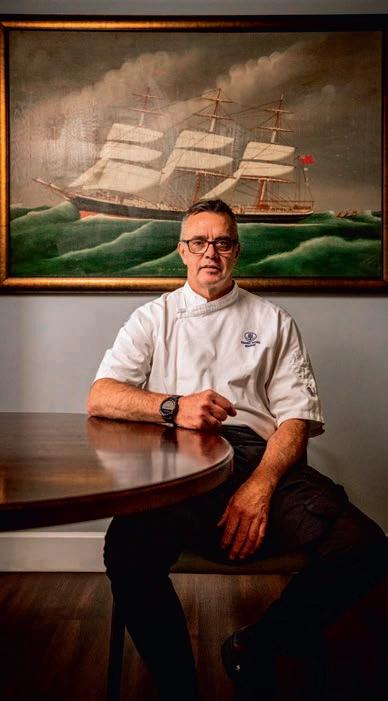





Brendan Gallen Strategy Director, The Foundation
Ok, so the headline might be a bit reductive, and those in leadership understand why sustainability matters.
But if we want to accelerate sustainability progress and make it a competitive advantage, we must acknowledge that the way we communicate it isn’t helping. It’s about much more than policies and reports; we need to bring clarity and tell a story to engage and move things forward.
Sustainability in business drives trust, opens access to finance, sharpens your employer brand and boosts performance. It’s a virtuous cycle. But what’s often missing is alignment... what does sustainability mean for our organisation? Where do we begin? And how do we get people on board?
Mind the Gap: Intent vs Impact
People are wise to greenwashing. It’s clear that broad, generic messages no longer cut through.
A Mintel report coined the term “ecospecificity” to describe the move from vague claims to tailored, tangible actions.
There’s a gap between intent and impact. Salesforce and GlobeScan found that while 93% of leaders say sustainability is critical, only 37% believe it’s well integrated in their operations.
Some interesting research from Bain & Company points to four enablers of effective sustainability strategy:
• Make a bold, public commitment;
• Ensure the CEO leads from the front;
• Build a clear business case; and
• Align processes and incentives to reshape behaviour.
These are all things that marketing can really help move the needle on.
Marketers are closest to the audiences, whether they’re customers, employees or stakeholders. They understand the importance of identity, clarity, and emotion in driving change.
Maybe what sustainability needs is its own “4Ps” model. Where marketing has Product, Price, Promotion and Place, let me suggest:
• People – focused on encouraging positive behaviours internally and externally.
• Product – reimagining operations, services and products.
• Promotion – focused on communicating with clarity, honesty and creativity.
• Programmes – building the structures and initiatives to deliver on our commitments.
Cutting Through with Clarity
In a noisy world, marketers get the power of a value proposition; a simple, honest articulation of what we offer and why it matters. So why not ask: what is our sustainability value proposition? What’s driving us? Who are we doing this for? What outcomes are we working toward and how do we deliver them?
“Salesforce and GlobeScan found that while 93% of leaders say sustainability is critical, only 37% believe it’s well integrated in their operations.”
Some Innovators are Already Showing us How...
Cisco has committed $100 million over 10 years to climate innovation. CEO Chuck Robbins is particularly vocal and they have a chief sustainability officer driving their strategy. The Cisco sustainability storytelling is exemplary – it’s worth checking out its Purpose Report and “Timeline of Impact”.
Closer to home, McLaughlin & Harvey has embedded sustainability in its refreshed brand strategy. It has backed its approach with a social value team and delivered highly visible public initiatives from YouMatter Communities to site-level climate action.
AIB is another great example. Sustainability isn’t a side project; it’s a core pillar of its business with CEO Colin Hunt leading from the front. It offers a range of green financial products, supports businesses on their sustainability journey and shares ESG progress regularly and transparently. Its mindset is clear; sustainability isn’t just about “doing good”, it makes for good business.
So, what do we do now?
We step back, take stock and ask, “how will our brand live in the future we’re trying to create?”
Let’s challenge our assumptions, involve our people and welcome outside perspectives.
Then we equip our leadership and marketers to tell the story; not just of where we are, but where we want to go, being bold in our ambitions and statements, but open and honest in our progress.
Ultimately, sustainability needs a story. And as someone once said, leadership is the art of inspiring others to make that story come true.

50,000 trees in partnership with We spend £240M on local food and drink annually
We will plant
We will plant 50,000 trees in partnership with We spend £240M on local food and drink annually work in. That’s why…
We will plant 50,000 trees in partnership with We spend £240M on local food and drink annually work in. That’s why…
We will plant 50,000 trees in We spend £240M on local food and drink annually farmers, makers and the communities we live and work in. That’s why…
We will plant 50,000 trees in partnership with We spend £240M on local food and drink annually makers and the communities we live and in. That’s why…
At Musgrave, we love supporting local suppliers, farmers, makers and the communities we live and work in. That’s why…
We’re supporting people with autism & learning difficulties
We’re supporting people with autism & learning difficulties
We’re supporting people with autism & learning difficulties
We’re supporting people with autism & learning difficulties


50,000 trees in partnership with We spend £240M on local food and drink annually

We’re supporting people with autism & learning difficulties
We’re supporting people with autism & learning difficulties


We’ve raised £4.4M for our charity partners
We’ve raised £4.4M for our charity partners
We’ve raised £4.4M for our charity partners

We’ve raised for our charity partners
We’ve raised £4.4M for our charity partners
We’ve raised £4.4M for our charity partners





By Blaithin Surgeoner
Blaithin Surgeoner, a Chartered Accountant with over 30 years experience and Partner at Endeavour Information Solutions, a Microsoft Solutions Partner based in Belfast, that specialises in bringing optimising customers systems with Microsoft Cloud solutions using a Cloud First approach.
Too often, accounting systems are viewed narrowly as tools to manage ledgers, process invoices, and generate financial statements. But in today’s fast-moving landscape, growing businesses need more than just bookkeeping. They need agility in order to react to change, integration with an organisation’s other systems and processes, and intelligent management reporting. That’s where Microsoft Dynamics 365 Business Central shines: a modern, cloud-based ERP solution that empowers businesses to go beyond accounting — and take control of their entire operation.
A Fully Integrated Business Platform: Business Central offers end-to-end business management in one unified solution. Designed for small and medium-sized organisations, it connects financial management with operations, sales, service, inventory, and projects. This seamless integration eliminates data silos and manual entry, providing one source of truth across the business.
From the moment a sales lead enters the system to when an invoice is paid and stock is replenished; Business Central keeps teams connected and processes streamlined.
Built-in dashboards and real-time reporting offering management instant visibility across departments, allowing for proactive, not reactive decision-making.

Feature-Rich Capabilities for Modern Businesses: Business Central comes loaded with intelligent features that extend far beyond the capabilities of traditional accounting software:
• Financial Management: Robust nominal ledger, multi-currency support, dimensional reporting, bank reconciliation, budgeting, and cash flow forecasting, all in one place.
• Customer Relationship Management: Track customer interactions, automate sales processes, manage pricing and discounts, and convert quotes to orders seamlessly.
• Inventory & Supply Chain: Gain full visibility into inventory levels, suppliers, warehouses, and product movements. Automate reordering and optimise stock to reduce costs and improve delivery times.
• Project Management: Monitor resources, track costs, manage time sheets, and ensure profitability for every project.
• Warehouse Management: Use bin and zone management, barcode scanning, and real-time stock updates to increase warehouse efficiency and accuracy.
• Manufacturing & Assembly: Plan production, manage BOMs (bills of materials), handle capacity, and track costs effectively, ideal for manufacturers and assemblers.
• Service Management: Schedule service calls, manage contracts, and provide customers with prompt, high-quality support.
Microsoft Integration: What truly sets Business Central apart is its native integration with the Microsoft 365 ecosystem. Users can generate quotes directly from Outlook, export data to Excel, and collaborate in Teams, all without switching context. It also connects seamlessly with Power BI for advanced analytics and Power Automate for process automation.
Secure, Scalable, and Always Up to Date: Running in the cloud, Business Central provides enterprise-grade security, data backups, and automatic updates — all managed by Microsoft. Whether your team is on-site or remote, Business Central lets your team work anytime, from any location or device, and can grow and adapt to meet any changes your business needs without expensive upgrades.
Partnering for Your Success: As a certified Microsoft Solution Partner, we don’t just implement software, we work alongside businesses to tailor Business Central to their specific needs. Whether you’re transitioning from legacy systems or scaling for new markets, we bring deep product knowledge, industry expertise, and a commitment to delivering value at every stage.
A Strategic Investment: Microsoft Business Central provides agility and intelligence to your business that not only manages the numbers, but also helps drive growth, improve service, and future-proof operations.
Summary: If you would like to find out more, why not contact us to arrange a free, no commitment consultation, by visiting https:// bit.ly/lets-talk-businesscentral or calling us on 028 9031 1010 and let’s talk.

Connects sales, service, finance, and operations teams in a single solution to help them adapt faster, work smarter, and deliver results.

Management

Management

Sales Service

Management


Project

Management


Operations
Management


Supply Chain

Management

Using the latest Microsoft Cloud applications and services, we help our customers overcome their challenges and make their visions a reality. With Dynamics 365 Business Central we provide a business management solution that enables you to adapt faster, work smarter, and perform better, bringing together your finance, sales, services, and operations within a single, easy-to-use application to get the insights needed to drive your business forward and be prepared for what’s next.
Contact us for more information and a demonstration of how Dymanics 365 Business Central can help deliver the right results for your business.
Northern Ireland
Units 2 & 3 Hawthorne House, 6 Wildflower Way, Belfast, BT12 6TA
Scotland
England
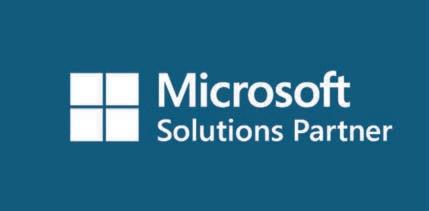

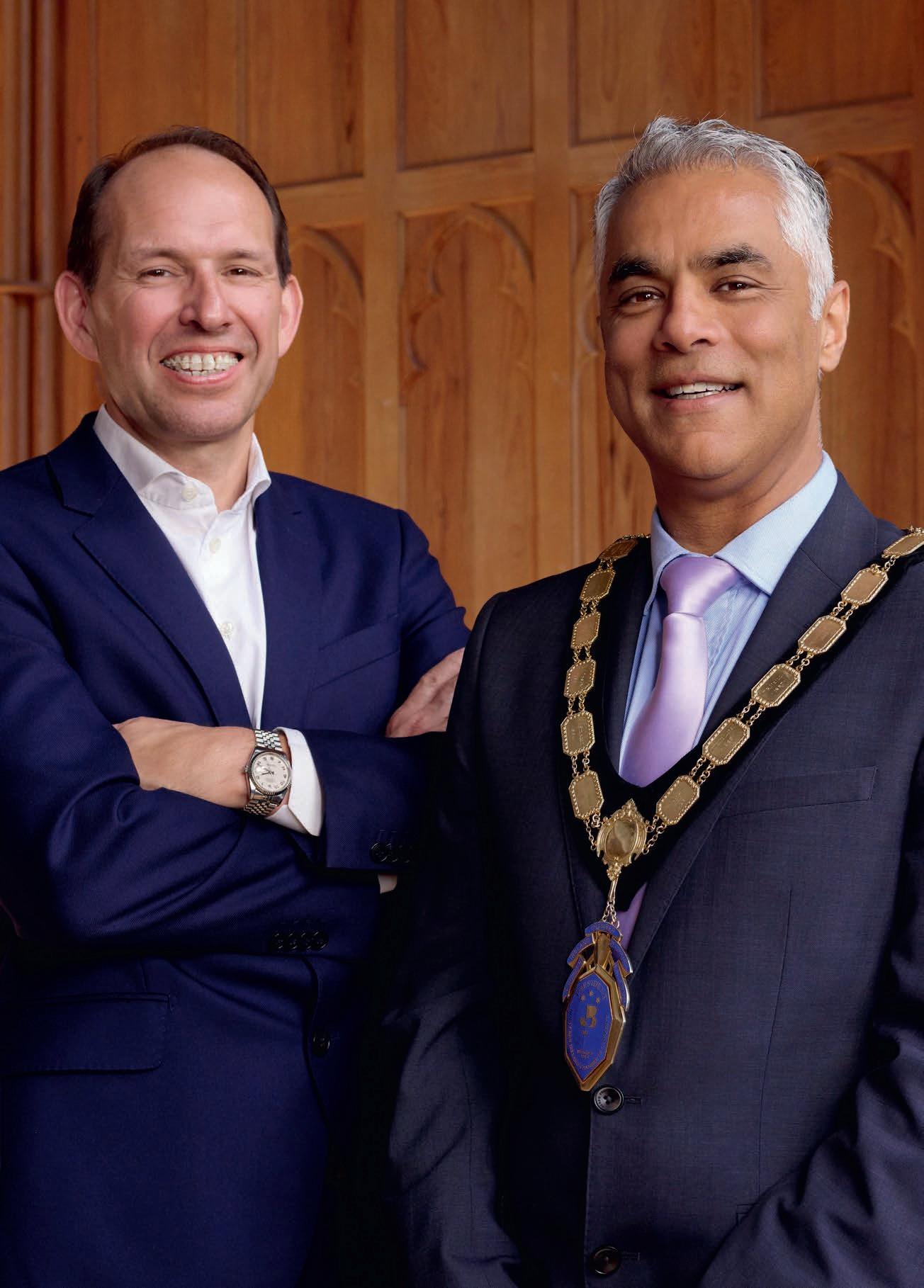




As NI Chamber welcomes its new President, Kailash Chada, his message is clear: Now is the time to be bold, to think big and turn ambition into action.

“
Iwant us to be brave and get on with making things happen,” he begins.
“Because despite the well-known challenges we face, I believe that Northern Ireland is on the brink of something remarkable. We must believe in ourselves and be optimistic about outcomes. We need to raise our sights and challenge what we believe is possible.”
The newly appointed president brings decades of leadership experience in finance and energy. Having returned to Northern Ireland from London in 2013, he believes passionately in the scale of opportunity before it. “This region is bursting with potential – in our people, in our ideas, in our position in the world but now, we need to turn that potential into actual performance.”
Last year Northern Ireland was an outlier; the only part of the UK to see growth in goods exported. According to Kailash, “that is dual market access in action – a unique relative advantage that we hold here in NI. But we must be much more ambitious about using barrier-free market access and challenging all the unnecessary red tape that is holding our businesses back.”
Turning to other specific priorities during his tenure as president, he says: “Now is the time to position ourselves not just as fast followers, but as global leaders in innovation, trade and sustainability. So as president, I will be a vocal advocate for low-carbon growth, for sustainable business models and for investing in skills that prepare our workforce for a net-zero economy.
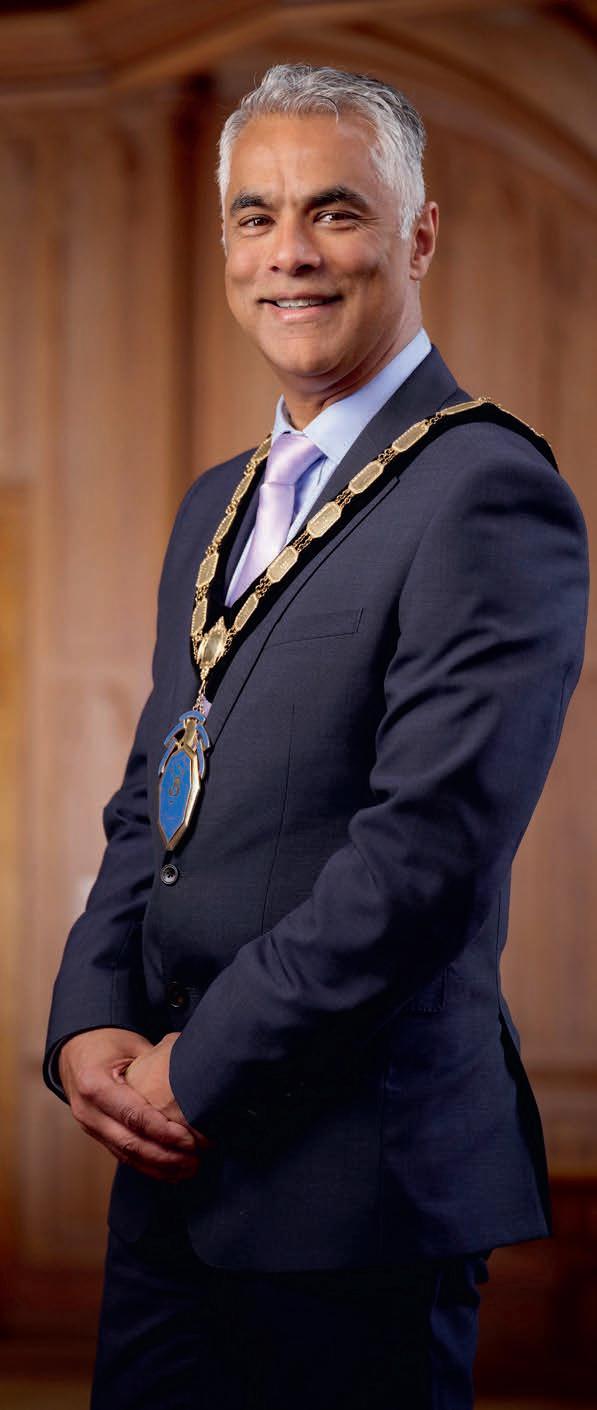
“When it comes to the UK government and NI Executive, we want to see investment materialise in our key sectors as a result of the Comprehensive Spending Review and the Investment Strategy. And of course, we want a new fiscal framework agreed that will enable business ambition to be realised.”
“There has been a lot of talk about Northern Ireland’s Corporation Tax rate – maybe too much talk. We need to make the region much more competitive and the cost of doing business is a fundamental element. Right now, our business taxes are not competitive. I believe we must be on a more level playing field with our neighbours.
“We know the challenges are real. Rising employer costs, skills shortages, the global uncertainty of tariffs and shifting alliances, and so much more all contribute to a really complex trading environment. But time and again, our businesses prove that resilience and reinvention are part of their DNA.
“There are huge opportunities in front of us – not least in the EU-UK reset, which has the potential to boost key industries like agrifood and remove impending complexity on emissions trading, critical for our energy intensive industries.
“And whilst the reset offers some sector-specific opportunity, there is still so much more to do. NI Chamber will continue to make the case for tackling the cumulative burden of customs and regulatory divergence between Northern Ireland and our biggest market in Great Britain.
“We have consistently called on the EU/UK for delivery on practical outcomes including less red tape, smarter regulation and more collaboration on shared challenges like energy, food security and healthcare. But we must move quickly and think strategically.
“And when it comes to the UK government and NI Executive, we want to see investment materialise in our key sectors as a result of the Comprehensive Spending Review and the Investment Strategy. And of course, we want a new fiscal framework agreed that will enable business ambition to be realised.”
Make it exist first
Stressing NI Chamber’s call for a long-term economic plan, he said:
“I want us to really think long term about our ambition for this place, which too often is beset by short-termism. Even a strategy on paper is not enough. It requires political will, policy bravery and sustained implementation. Business has a vital role to play – not only in shaping and co-designing the strategy, but crucially, in backing politicians willing to take bold, sometimes difficult decisions in order to deliver that strategy.
“We need to acknowledge that it is challenging to take risky decisions in government.
“In business, we encourage our teams to test, trial and innovate. It is not failure to try something new that doesn’t work first time; rather, it is just trial and error. The same must go for policymakers because progress comes from action, not perfection.
“As I often tell my own team ‘Just make it exist first, you can make it better later.’
“I strongly believe that we need our politicians and civil servants to be brave and in return, they should have our support. Brave politics needs business support. If we want stable institutions and a thriving economy, we must give the Executive the mandate to be visionary, not just to be pragmatic. The cost of inaction is just too high.”
His message is uncompromising: Northern Ireland must raise its sights, challenge what it believes possible, and make brave decisions.
“My vision for this year is centred around ambition and bravery but also delivering in partnership. Partnership between business and government. Between educators and employers. Between Northern Ireland and the world.”
Under his leadership, NI Chamber will work to be proactive, to help businesses find solutions to challenges and to advocate for a more ambitious, competitive and sustainable economic future.
“NI Chamber will continue to be a catalyst for collaboration – bringing together those with the ideas, the courage and the commitment to shape a more prosperous future,” he concludes.
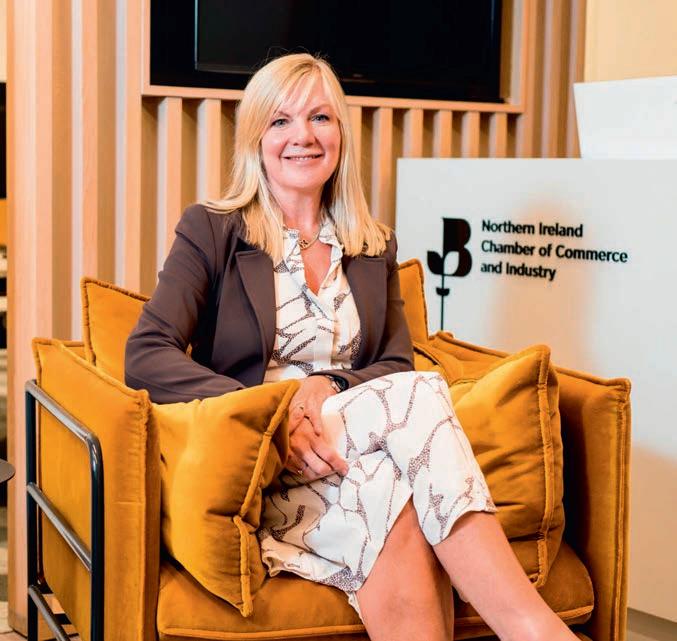

Suzanne Wylie, Chief Executive, NI Chamber

Abbey Medicare
Adapt GSE
AM Logistics Network
Amber River NI
AquAid Northern Ireland
Bi a Group
Bio Capital
Bouncy Square
Capitol Essentials
Clyde Shanks
CyberLab
David Henderson Design
Elizabeth Sands Beauty School
Firmus Energy (Supply)
Force 9 Energy
Iaso Solutions
Lunn’s Jewellers
Maxflow Power Products
McLanahan Aggregate Systems
Miller Hospitality
MIS Group Neurovalens
New Life Teeth
NI Precision
Nordica Design
Norso Medical
Northern Homes
Ortus Secured Finance
Route Media
Royal Hotel
Select Services NI
Share Energy
Ten Foundations
Tetra Tech
Titanic Distillers
Vikela
Zenith IT Solutions
* To become a member of NI Chamber join online at www.northernirelandchamber.com or phone the membership team on 028 9024 4113
It gives me great pleasure to welcome the many new members who have joined us in recent weeks. You and your colleagues have joined a vibrant and growing network of businesses with common purpose and ambition. So, whether you’re a new SME, an established global business or somewhere in between, your presence strengthens our business community and enriches NI Chamber’s reach, influence and impact. With summer in full swing, there is still plenty to get involved with. Our Summer Schedule contains a brilliant line-up of events and webinars designed to help you meet fellow members, gain fresh insight, and explore new ways of working. The team and I are especially looking forward to catching up in-person at our August Summer Social.
We have a packed schedule of events planned for the second half of the year too, including our flagship Festival of Business in September. The line-up for this year’s Festival is superb, making it a ‘mustattend,’ especially for anyone involved in sales and marketing.
Undoubtedly, one of the big outputs from recent weeks was the publication of our position paper on Northern Ireland’s waste water crisis. If you haven’t already, I would strongly encourage you to review that document on our website – you can read more in the following pages too. Suffice to say, our multifaceted solutions, developed in partnership with colleagues in the housing and construction sectors, have generated considerable debate and we intend to keep this momentum going in a drive to address this blocker to development of homes, factories, education and health facilities and our local towns.
And of course, a highlight has been the appointment of NI Chamber’s new President, Kailash Chada. Kailash brings a tremendous depth and breadth of experience to NI Chamber’s Board of Directors and as President, his leadership will be of immense benefit to our members. I know that he will continue to champion our collaborative approach and really look forward to seeing what we can achieve together.
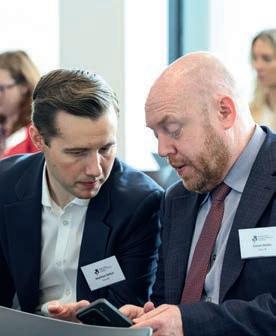
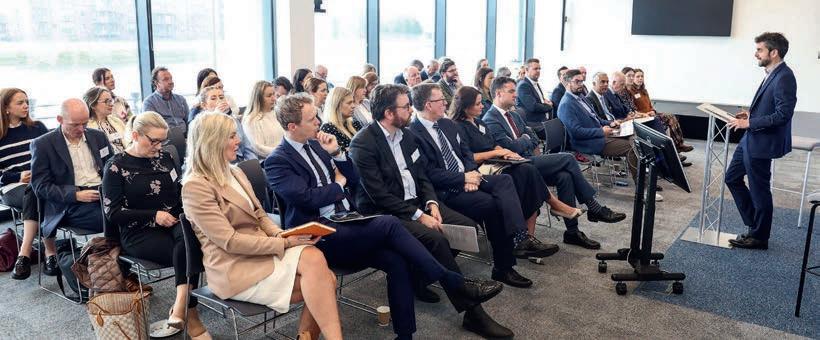


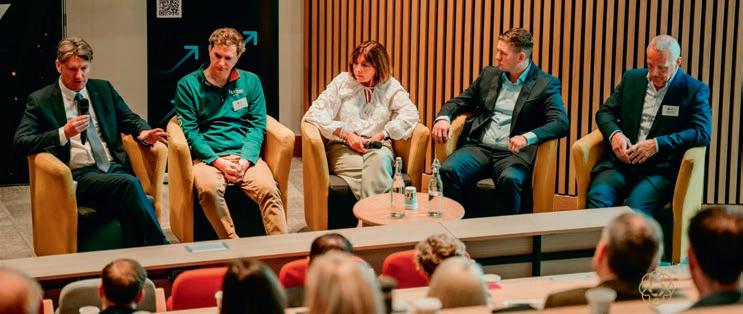
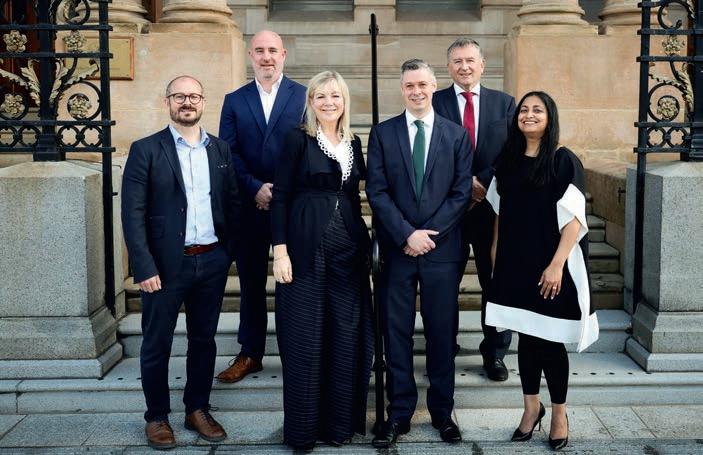
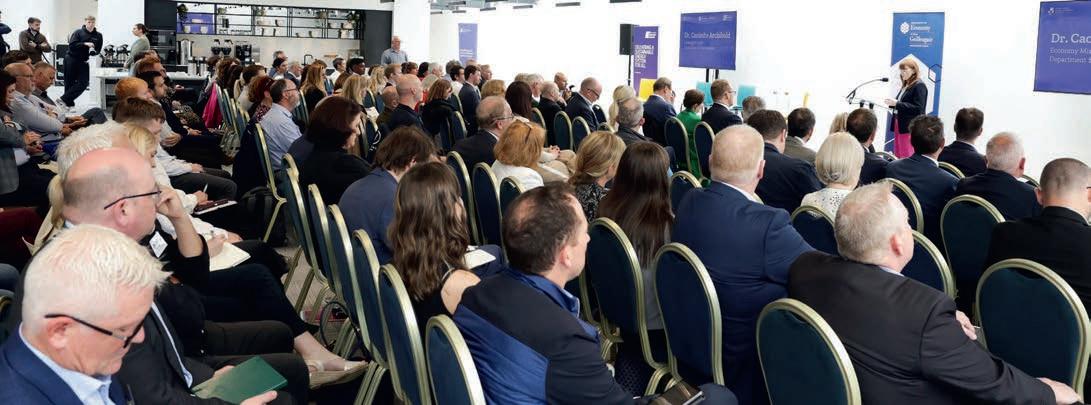

7. Minister for the Economy Dr Caoimhe Archibald launched the Green Skills Action Plan at an event in partnership with NIE Networks.
8. Jonathan Martindale (Phoenix Energy), Gordon Parkes (NIE Networks) and Moira Doherty (Department for the Economy) at the Future Workforce Series.
9. Alicia Kundel and Gillian McKee of Giraffe Associates attended a Successful Sustainability event.
10. Cathal Geoghegan (Henderson Foodservice) and Brendan Gribben (Greenfields Ireland).
11. Suzanne Wylie hosted a panel with Frances Ruane (National Competitiveness and Productivity Council) and Richard Ramsey (Queen’s University Belfast) at the NI Chamber’s annual general meeting in Queen’s University.
12. Jonathan Martindale (Phoenix Energy). Seamus McGuckin (AIB), Theresa Clarke (Encirc) and Duncan Emery (Smart Sustainability).
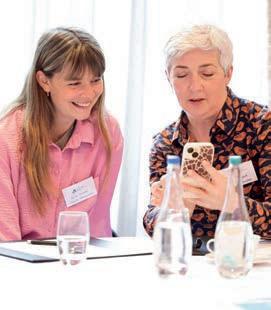
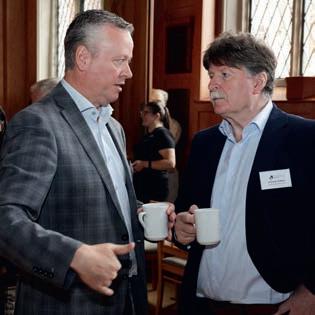

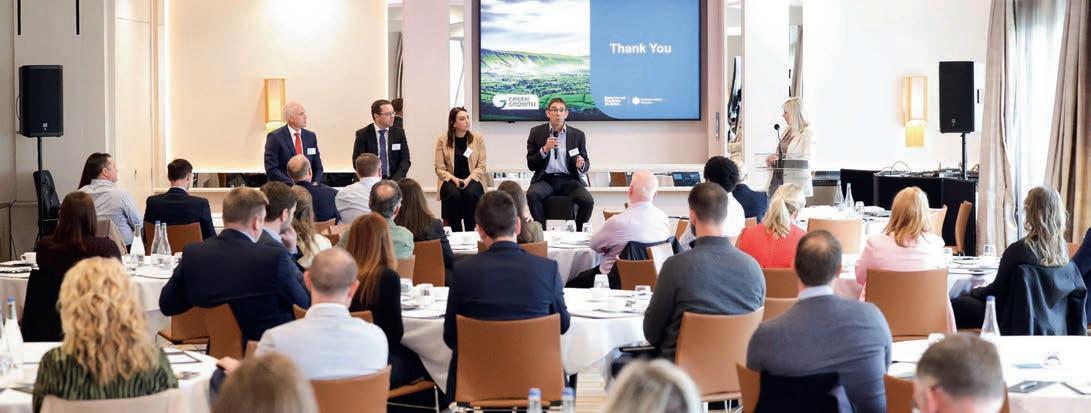
A joint position paper commissioned by NI Chamber, the Construction Employers Federation (CEF), and the Northern Ireland Federation of Housing Associations (NIFHA) has assessed the long-term impact of the wastewater crisis on housing and construction. It has proposed a potential way forward which includes the introduction of a low-cost Infrastructure Levy, along with other measures.
The summary paper combines the findings of two reports, undertaken jointly by Grant Thorton and Turley Economics, addressing both the economic impact of not delivering sufficient infrastructure to enable housing delivery, and proposals for a new fiscal model to ensure sufficient investment in wastewater infrastructure in the future.
The paper comes on the back of the NI Fiscal Council Report, published on 10 June, which also warned that Northern Ireland’s wastewater infrastructure is facing a critical funding crisis that threatens to undermine economic growth, housing delivery, and environmental protection for years to come. Although undertaken and commissioned independently, the paper published today aligns with the Fiscal Council’s assessment that the current governance structure and the financial model of NI Water is unsustainable, concluding that action must be taken now to implement more appropriate fiscal mechanisms.
In addition to suggesting a progressive and modest rates-based levy to meet the deficit over this Price Control and the PC28 period (estimated at £2bn), the report also calls on the UK government with support from the Irish government, to establish a Wastewater Infrastructure Transformation Fund. The purpose of the fund would be to ensure major capital programmes, such as the Living with Water Programme, are sufficiently funded to kick-start more home building and industrial development across Northern Ireland.
Suzanne Wylie, Chief Executive of NI Chamber, said:
“There is no doubt that our wastewater infrastructure is at a critical tipping point, and if the required investment is not realised, it will continue to have a highly detrimental impact on our economy, our loughs and shorelines, and how and where we live.
“NI Water’s current funding model means it is unable to effectively upgrade, replace, and build the new sewerage infrastructure needed for our towns and cities. Because
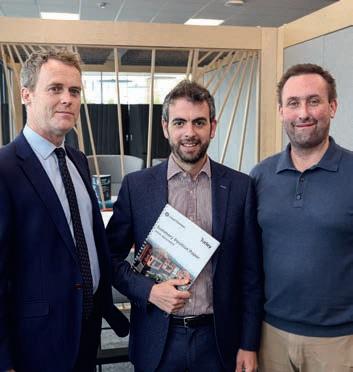
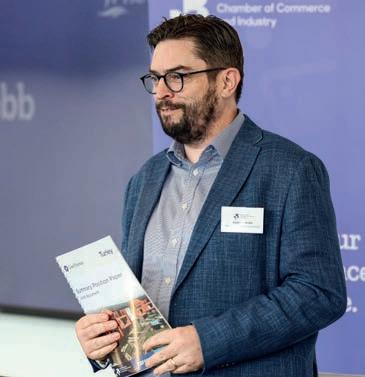

John
this has not been properly addressed for many years, the problem has escalated to a point that the system cannot take new connections in many areas, while much of the existing infrastructure is operating at over-capacity. We face a stark choice: continue to defer the inevitable or confront it with clarity and a commitment to longterm reform.”
Every report which has been undertaken to date has said that a solution needs to involve some form of revenue raising. The NI Executive has made it clear that to date, this is not part of its plan. However, this report sets out mechanisms for keeping any levy to an absolute minimum. One of the models suggests that the cost to the domestic ratepayer could be on average an additional £11.80 per month.
“Without such an investment it will be much more difficult to grow Northern Ireland’s economy, build enough homes to meet the needs of all our population, maintain and grow our construction sector, and prevent more pollution of our waterways.” Suzanne concluded.
Mark Spence, Chief Executive of the
Construction Employers Federation in Northern Ireland, commented:
“The wastewater capacity and housing crises we face have been years in the making, but recent weeks have brought the urgent need for action into sharp focus. While the Infrastructure Minister’s three-pronged approach has some merit, it’s clear that the Department for Infrastructure’s proposals on developer contributions and sustainable drainage fall far short of addressing the barriers to economic growth and environmental decline.
“Lack of investment in wastewater infrastructure is crippling Northern Ireland’s construction sector. We’re seeing the lowest new housing starts since the post-war era, delayed school projects, and factories opting to invest elsewhere. Turley Economics projects that without urgent investment, 6,150 essential new homes cannot be built in the next three years, exacerbating housing shortages and driving up rents. This stagnation would also result in 1,690 direct and 870 indirect job losses, costing the economy £1.3 billion in
lost construction investment, with farreaching consequences. The economic damage will only worsen each year we fail to strategically reform wastewater funding.
“The groundwork for a new approach has been laid, thanks to reports from the NI Audit Office and the NI Fiscal Council, the outcome of the UK Government’s Comprehensive Spending Review, and our own findings. Now is the moment for decisive action.
“Without concerted action, the legacy of this Executive will be just the latest in a long succession of direct and devolved administrations that have failed to fully grasp the scale of underinvestment in water infrastructure.”
The joint position paper presents a series of models which propose a progressive levy applied to rates to recoup the cost of borrowing over 40 years. The model applied the analysis, undertaken by Grant Thorton, illustrates how the shortfall in investment could be met by the average domestic rate bill increasing by just £101.15 per year. According to Turley Economics investing sufficiently in wastewater infrastructure could add an additional net £2.5 billion Gross Value Added (GVA) to our economy by building more homes.
Seamus Leheny, Chief Executive of the Northern Ireland Federation of Housing Associations, added:
“Housing is a human right, but the current funding model places our supply of much-needed housing in severe jeopardy. This is a clear ‘invest-to-save’ opportunity and doing nothing, risking huge societal,
economic, and environmental damage, is not an option. The prize of addressing the problem isn’t just a new fiscal model for wastewater infrastructure; it is essential to meeting the rising levels of critical housing need, reducing rising rents, and meeting the objectives of the NI Executive’s programme for government and the Department for Communities’ housing supply strategy. We know that this is not possible without upfront support from central government and action by our NI Executive.”
Speaking on behalf of Turley, John Davison, Head of Strategic Communications, said:
“As a multi-disciplinary consultancy, we have brought an array of skills and experience – led by our Economics team – to assess the impacts of shortfall in infrastructure funding. At Turley, we see every day the impact of Northern Ireland’s continued failure to address its wastewater funding issues. It is causing delay, uncertainty, or even a total block on new development in some parts of the region. At a time when the UK and Irish governments have prioritised housing building and removing barriers to development, Northern Ireland risks falling further behind. What this paper demonstrates, however, is that there are also solutions, and if we want to live in a functioning, thriving society with a healthy built environment, we need to urgently address this pressing issue. This is not simply about facilitating growth, much more importantly, it’s about meeting the
needs of our society now, before this issue becomes even worse. Every person in NI wants good public services and whilst the issue of wastewater is not as easy to get our heads around as our health or education services, it is fundamental to providing all the conditions for our towns, villages, cities, businesses, hospitals, schools, entertainment venues, waterways, etc. to work well and flourish.”
Speaking on behalf of Grant Thornton, Chief Economist Andrew Webb said:
“Grant Thornton is proud to have co-authored this report. Without urgent intervention, new housing, business development, and broader economic growth will be severely constrained, further damaging investment and impacting on workers directly and across supply chains. Earlier this month the Fiscal Council for Northern Ireland detailed similar strategies to address the shortfall in infrastructure spending. We have gone a step further in presenting models that illustrate the costs to rate payers to recoup the required borrowing. The environmental impact sewage pollution is having on the quality of Northern Ireland water bodies is already well documented. While it will not be easy to meaningfully address decades of underinvestment, the first step is to understand the scale of the challenge and responding – something we hope our report will help policymakers to do.”
To read a copy of the Summary Position Paper in full visit NI Chamber’s website.
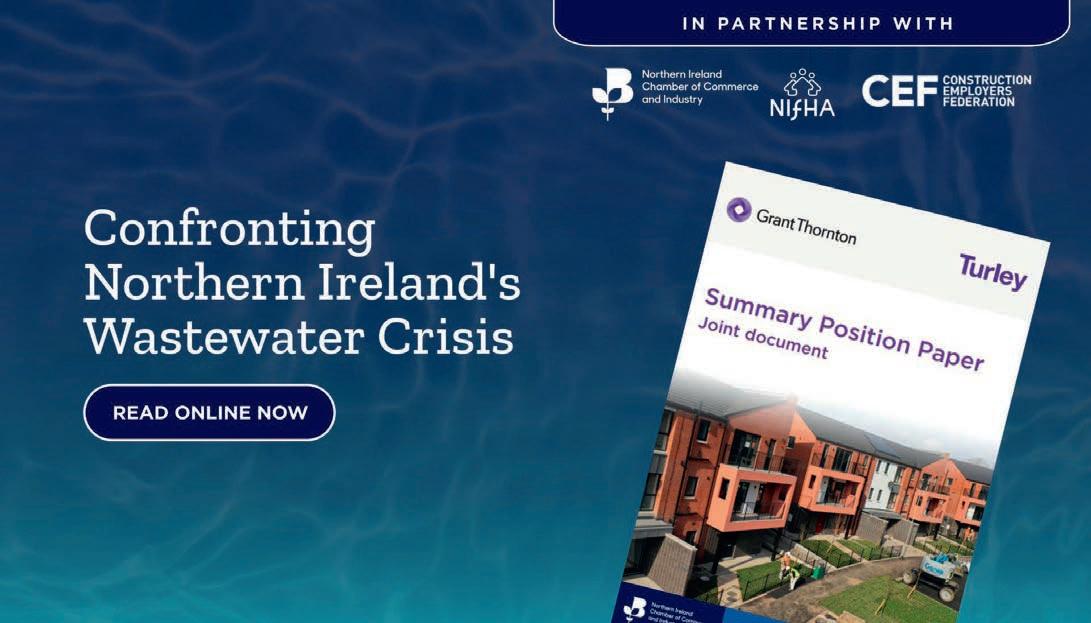
More than 500 business leaders attended NI Chamber’s Annual Lunch in Titanic Belfast. The event was hosted new President, Kailash Chada, Group CEO at Phoenix Energy. Guests at the sold-out lunch also heard from BBC Broadcaster Fiona Bruce, during an on-stage conversation with Claire McCollum. The event was supported by BT, as well as Cleaver Fulton Rankin, Budget Energy, Flogas, GMcG and DELL Technologies.

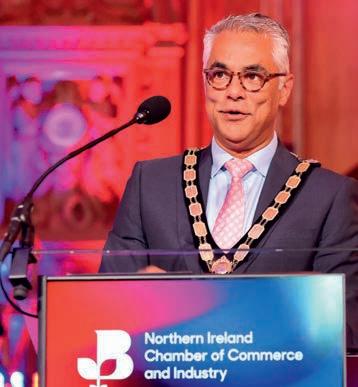

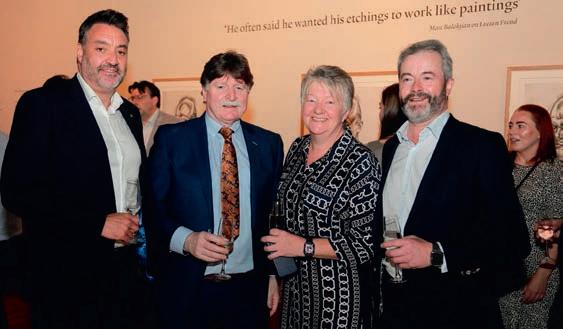
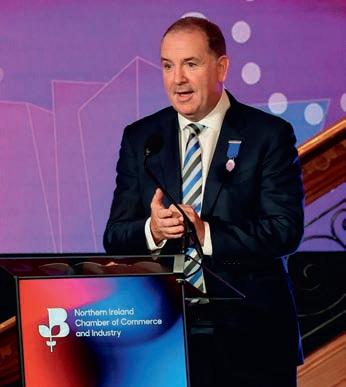

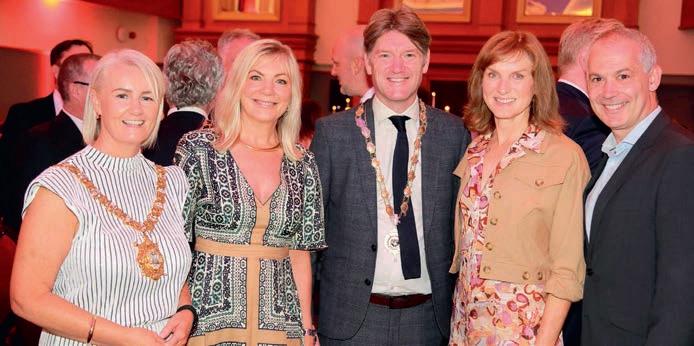
1.
2.
3.
4.
5.
6.
7.
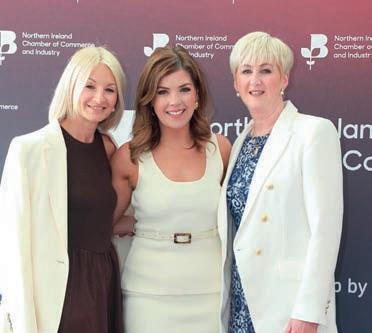

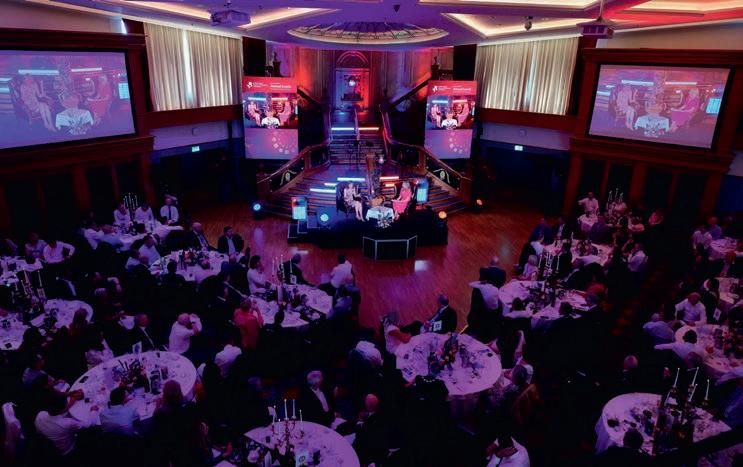
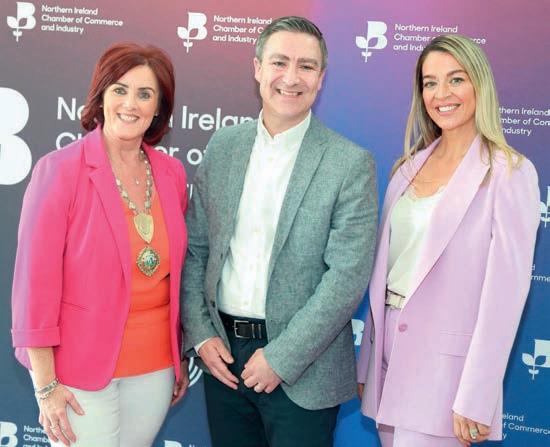
8. Kelly-Anne
and
9. From Ulster
10. More than 500 business leaders attended the lunch in Titanic Belfast.
11. Newry Chamber President Edwina Flynn, Stuart Hollinger (NI Chamber) and Jacqui Reid.
12. Stuart Anderson (NI Chamber), NI Chamber former president Cat McCusker and Ed Vernon.
13. John Metcalfe, Jemma Clarke, Judith Totten and Alastair Gracey.
14. Adrienne Volpe and Eimear Coll from FloGas.
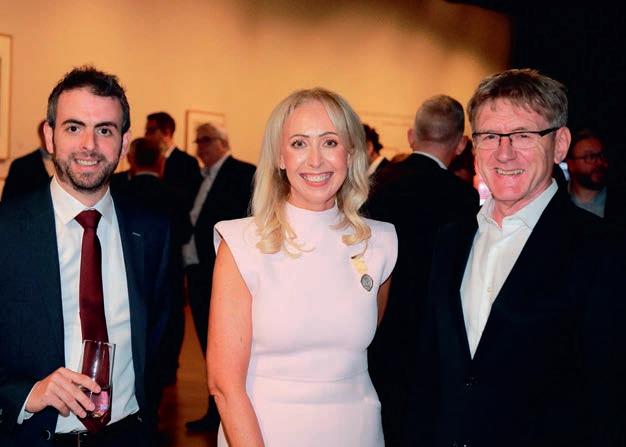


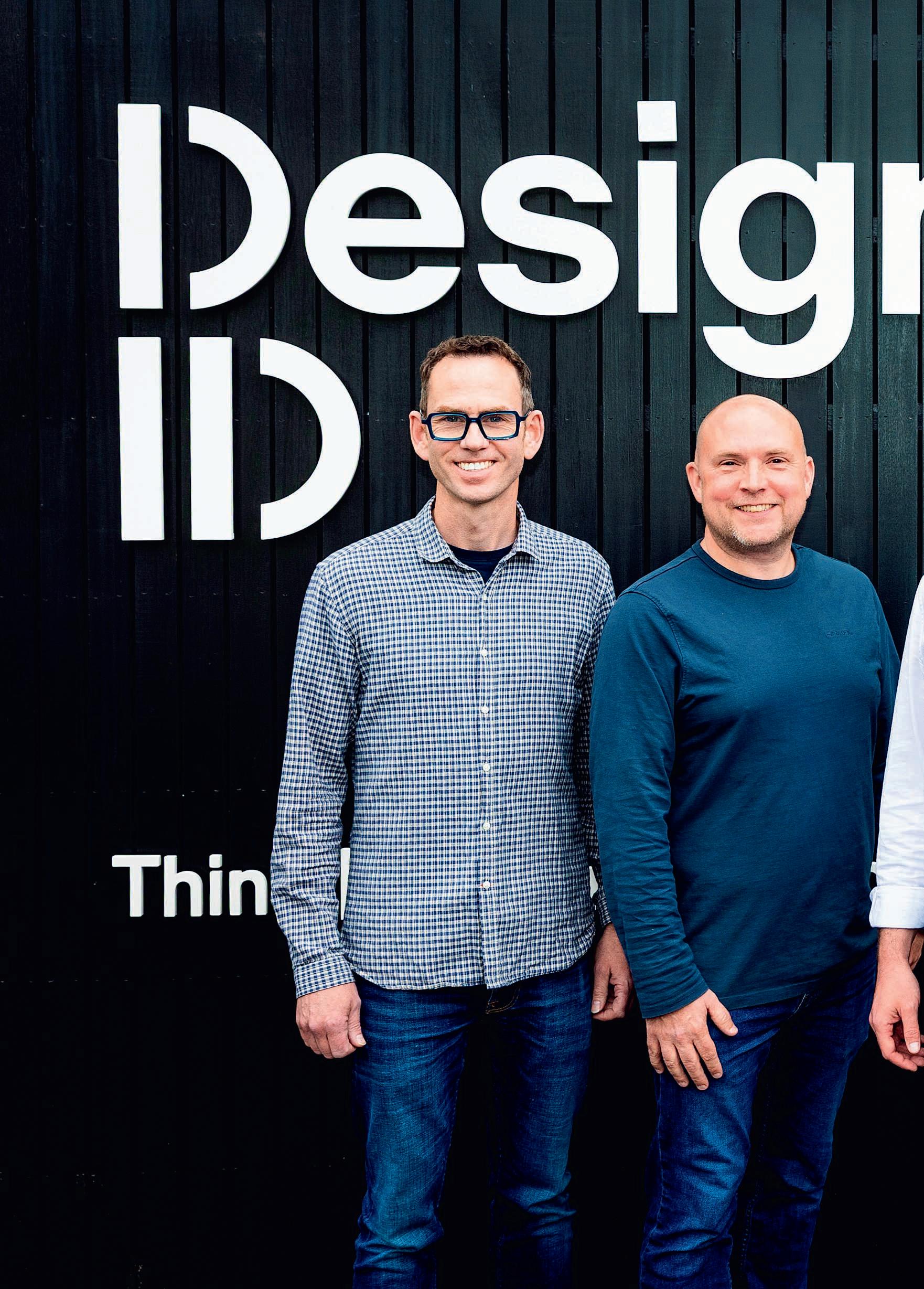
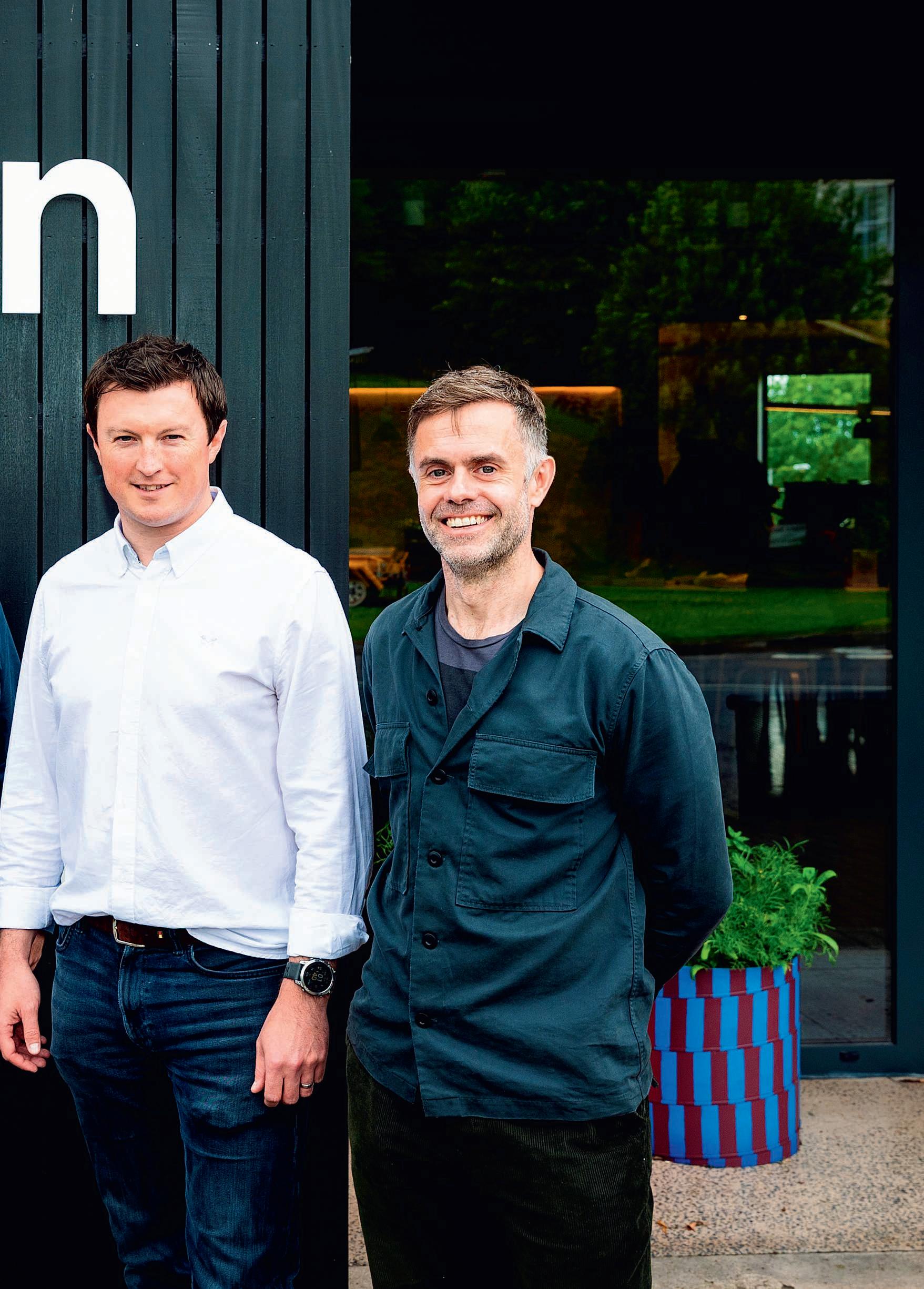

DESIGN ID HAS QUIETLY EVOLVED FROM A MODEST STRUCTURAL CONSULTANCY INTO ONE OF THE UK AND IRELAND’S FASTESTGROWING ENGINEERING FIRMS.
Based in Hillsborough, County Down, the Design ID team has delivered major infrastructure and conservation projects while staying largely under the radar. Now, with a bold five-year plan and landmark contracts underway, it’s time to be heard. We speak to Simon Lamont, director of civil infrastructure, about the journey so far, and what comes next.
From a team of seven to a 70-strong, multi-disciplinary practice with offices in Dublin and London, Design ID is now a serious player across both public and private sectors. Its growth has been largely organic, steered by deep expertise, clientfocused delivery and a culture of curiosity nurtured among its staff.
“We’re 20 years old this September,” says Simon Lamont, director of civil infrastructure. “When I joined ten years ago, there were only seven of us. It was a modest practice until the last five years or so. The growth has been fast, but very values-led.”
Simon says Design ID’s four core values have anchored the firm’s expansion: Drive, Initiative, Teamwork and Trust. “Drive is about always doing better, whether that’s our process or technical design. Engineering is problem-solving, and we believe we can always improve.”
He continues, “Initiative, or gumption as we call it, is about ownership. There’s a line in our ethos: ‘everything you see that is good happened because someone like you went and did it.’ If you see something that could be better, fix it. Be that person.”
Teamwork and Trust round out the ethos. “No engineer works in isolation,” Simon adds. “We rely on internal collaboration and a huge external network of design partners, contractors, suppliers and more. If you want to go fast, go alone. If you want to go far, go together.”
That team mindset applies across the business. Director Jonathan Macauley, who has a real passion for Structural Heritage projects, believes it has driven all divisions of the firm. “We have real depth in conservation engineering. We’re part of the Historic Environment Division of the Department for Communities and lead on several council frameworks. We’re one of only a handful of firms in Ireland with two registered conservation engineers.”
Design ID’s evolution from creative structural consultancy to multi-sector partner has been led by its people. “It was a natural shift,” says Simon. He adds, “When we bring people in to work here, we realise they have a passion for specific things, like sustainability, so if someone brings that, we back it rather than trying to keep them in our box. And when you do that, you naturally expand into new sectors. It’s all driven by the passion of the staff. As a business, we make sure we can support that and help it flourish, whether through partnerships or internal growth. You’ve got 70 people with different passions, skills and abilities, and that’s really what drives the business. Our service is our people, from director level down. We’re just trying to create the right environment for them to thrive, because they’re the ones pushing it forward.”
Now, the firm is entering a major new phase. “We have just launched our next five-year plan,” Simon shares. “Our core skill: being hands on, practical and getting things built, remains. But now we’re scaling that for bigger projects.”
Design ID is currently delivering €500m data centre projects in Europe and was recently appointed to a €200m Port Infrastructure Framework. These contracts reflect the firm’s upscaling mindset and ability to successfully compete with much larger competitors. “We’ve created a consortium of Irish SMEs that can compete with the multinationals,” Simon says. “Our USP is we have people on the ground. That’s personal service, backed by scale.” He notes that the firm’s ability to pivot quickly on site is one of its greatest strengths.
Today, the company is one of the largest independently owned consultancies of its type on the island with physical offices in
both Dublin and London, alongside its Hillsborough base. “That’s where we’re focusing growth,” says Simon. “We want to build those teams outside of Hillsborough to 15–25 people and embed our culture as we scale.”
Design ID’s portfolio is impressive. Its projects span bridge reconstructions, schools, modular buildings, railways, commercial, industrial projects and architecturally challenging projects, serving both private and public sector clients across the UK, Ireland and into Europe.
Simon highlights the Ballynameen Bridge project in Derry as a clear example of the team’s ability to think fast and deliver practical, design-led solutions under pressure. The bridge had partially collapsed during severe flooding, and most consultants recommended a full rebuild. But working closely with their contractor partner, Design ID took a different approach.
Jonathan notes the structural expertise the company can offer with over 10 years’ experience working on complex refurbishment and extension projects in the heart of Mayfair, London for highnet individuals. “Understanding how existing buildings were constructed 100, 200 and even 300 years ago is fundamental to being able to maximise their potential for their owners.
“We proposed retaining and refurbishing the structure,” says Simon. “Only the fallen arches needed replaced, with the rest being saved and restored to its original ~1850 construction. It was the most sustainable and cost-effective solution. That’s where we thrive: on the ground, solving real problems.”
Risk management is another differentiator. “That comes down to understanding risk and designing it out early. If you’re there at the coalface, you can pivot.”
Innovation is also embedded. “We expect everyone to innovate,” Simon explains. “Our R&D team exists to encourage that thinking across the business. One example is when one of our apprentices automated a script that turned months of work into a week. It saved tens of thousands of pounds in work hours. That’s what happens when you support your team’s passion.”
That family-centric culture is key to staff retention. “It’s very simple,” says Ian Douglas. “We talk to people. We find out what they need and create space for better ideas. That kind of communication is infectious. People want to stay.”
Looking ahead, Simon is keen to challenge the perception that being based in a small town limits the scale or ambition of the projects a business can deliver. “We’re still perceived as a small Hillsborough firm, but we’re delivering major infrastructure across the UK and Ireland. Power stations, railways, data centres; we’re solving the big problems now.”
And what excites him most about the future? “Seeing where we can get to. We’re going to have more exposure solving bigger societal challenges. We’re still doing what we love, solving problems. Just on a much bigger stage.”
“Drive is about always doing better, whether that’s our process or technical design. Engineering is problemsolving, and we believe we can always improve.”




1.0 to AI
Technology has always promised to make business easier, but for Andrew Gough, managing director of GCD Technologies, that promise has been the mission since 1999, long before AI was even on the radar.

GCD Technologies started out when its two founders took a year out of university to see if they could turn their side hustle into a real business. What began as a temporary pause quickly turned into a full-time venture. Today it is one of Northern Ireland’s most forward-thinking software solutions companies, helping firms from McCausland’s to major newspaper publishers embrace the digital age. It’s what co-founder and MD Andrew Gough calls an accidental success story. “My co-founder, Andrew Cuthbert, and I took a year out of university to build websites. You could say we’re still on our year out,” he begins.
At the time of its launch, the internet was still in its infancy. Google had just launched, Amazon was selling books and had only recently added DVDs, and business software was clunky and counterintuitive. “From the beginning, we started building software people actually wanted to use,” Andrew continues. “What was out there was hideous and made more work for people. We’ve always believed in creating tools that help.”
Today, GCD is a thriving software company based in Craigavon, with a growing team and client base across the UK and Ireland. The focus remains the same: to solve real business problems through custom software.
GCD’s journey began with a simple e-commerce project for a group of students and quickly evolved. One early client, Farmrite – a small farm shop in Portadown – tapped into e-commerce in 2000, well ahead of its time. The business boomed, with 5am traffic from farmers across the UK and Scotland. “That led us into software automation, including cattle tag production, which is still used today by Fane Valley Group, who purchased Farmrite,” Andrew adds.
But it wasn’t until a decade later that the company made a strategic shift into a business mindset. “We suddenly realised we were responsible for more than our own mortgages. We had 12 to 15 people depending on us,” he says. That realisation led to the formation of a board of advisors, including former clients and respected business figures. “That was instrumental in taking the business further. It marked the beginning of deliberate growth.”
The next major shift came last year, when Andrew and fellow director Andrew Cuthbert embarked on a vision-setting journey. “We stepped back and looked at the next 10 years,” says Andrew. “We even wrote our retirement speeches to imagine the future. It was an incredibly useful exercise. We wrote those speeches separately, and the alignment between
“We work hard but enjoy what we do. That’s our ‘No Limits’ value.”
them gave birth to our future direction.”
That future is rooted in a strong belief in the power of artificial intelligence. “I’ve lived through three major waves in tech: the internet, the iPhone, and now AI,” he says. “I believe AI will eclipse both of those in terms of impact. But it’s not about jumping on trends. We always start with the business problem, not the technology.
“One of the points I want to get across is that with new tech, people start by asking where they can use it. That’s the wrong question. They need to focus on the business challenges and opportunities. Once these are well understood, then we can find the right solution. Problems that weren’t practical to solve two years ago are now in the realms of possibility. The return on investment is there too,” he adds, referencing a perception for some that digital transitions can sometimes feel too costly or burdensome.
GCD’s Innovate Division, which helps businesses explore, test, and shape their ideas before anything is built, is at the core of what it does. “It’s about solving the right problem. With AI, it’ll become easier to build software, but the real challenge is building the right software,” Andrew explains.
Examples of that ethos in action include a digital transformation for Wilsons Auctions, where GCD built a cloud system covering everything from stock intake to online bidding. The solution not only streamlined operations across all of its branches but also positioned the business for future AI integration. “We’re now looking at client projects through an AI lens, not just building tools, but unlocking real benefits.”
Another example is McCausland Group’s airport car parking service. GCD completely transformed its operations through the development of two bespoke systems: a customer-facing booking platform and an internal car park management system. Replacing decades of manual processes, the new solution introduced real-time car tracking, automated task optimisation, and mobile check-in tools for staff. These features
significantly improved efficiency and customer experience. Tools like QR-coded keys, live vehicle mapping, and flight delay integrations now streamline operations around the clock. Launched with minimal downtime, the system saves thousands of staff hours annually and supports a modern, scalable valet parking service.
The business is also behind the Irish Independent and Belfast Telegraph’s custom built apps.
Many clients arrive overwhelmed by technology, Andrew admits, but the alternative is often a spreadsheet-heavy, arduous setup. “I’m constantly amazed at how many spreadsheets businesses still rely on. Even large firms with tech teams often have gaps. There are huge opportunities to automate and digitise core operations.”
He adds, “Well-designed software should work for you. You shouldn’t have to do the work. That’s especially true now, as AI becomes more embedded.”
GCD can help clients explore these possibilities through dedicated workshops. “We run product and AI discovery sessions that help businesses realise what’s possible, even if they think it doesn’t apply to them.”
Behind the scenes, GCD’s team is central to its success. “We work hard but enjoy what we do. That’s our ‘No Limits’ value,” says Andrew. A remote-first company since before COVID, GCD now has staff across Northern Ireland and England, with no expectation for everyone to return to the office. Twice a year, the team comes together for in-person collaboration and skills development.
“We’ve invested heavily in wellbeing, remote tech, and personal learning plans. We even run internal events where staff can share new tools they’ve discovered,” he adds. “That keeps us learning and adapting.”
Looking ahead, Andrew sees GCD playing an even greater role in helping clients harness new technology.
“Businesses will need partners who can help them focus on the right problems and make smart choices. That’s where we come in.”
Beyond client work, Andrew is actively involved in Software NI and sits on its sector’s future working group. “One of our long-term goals is to share our knowledge more broadly. We also want to support new ventures through our Nurture Division, helping start-ups shape and build the right products from day one.”
For Andrew and the team at GCD, the message is clear. Technology should make business easier, not harder. And if used well, it can unlock potential many businesses didn’t even know they had.























































































MOST BUSINESS OWNERS ARE FOCUSED ON GROWTH, PROFITABILITY, AND SERVING THEIR CUSTOMERS. LEGAL RISKS OFTEN TAKE A BACK SEAT. HOWEVER, PROTECTING YOUR BUSINESS AGAINST SUCH RISKS IS VITAL FOR LONG-TERM SUCCESS AND STABILITY, WRITES CIARA FULTON, PARTNER AND HEAD OF OFFICE AT LEWIS SILKIN, BELFAST.
At Lewis Silkin, we understand the importance of protecting both your existing assets such as products, services, know-how, and shareholder interests, as well as your future objectives. These include securing payment, achieving a fair balance of risk and reward, enabling growth, and ensuring a successful exit.
A key component of risk management is your people. Balancing the rights of individual employees with the broader interests of the business is a nuanced task, requiring careful consideration and robust policies.
Today’s legal and regulatory environment is increasingly complex and constantly evolving. Our role is to help clients manage these challenges effectively.
To break down protection areas into more detail, we recommend business owners regularly assess these critical areas:


“A key component of risk management is your people. Balancing the rights of individual employees with the broader interests of the business is a nuanced task, requiring careful consideration and robust policies.”
Investors, employees, and potential buyers expect transparency and wellplanned governance. Make sure your share structure is appropriate, employee incentives are in place, and company records are accurate and due diligence ready.
Are your supply contracts delivering what you need? Are your supplies on time, at the right price, and to standard? It’s vital that your commitments in your customer contracts don’t go further than the contractual promises you get from your suppliers.
Auditing your IP assets, like technology, branding, or business processes, is vital. Ensure you have the right contracts in place to secure ownership, especially where third parties are involved. Beyond protection, consider licensing IP to allow widespread customer use while retaining ownership and control.
Strong employment contracts are essential. These should cover confidentiality, notice periods, garden leave, and post-termination restrictions. Competitive pay, benefits, and sound policies are also vital to attract and retain talent. When issues arise, proper processes must be in place to manage disputes and mitigate risks.
Employers risk civil penalties of up to £60,000 per person if they inadvertently employ an illegal worker. If an employer knows (or should have known) they have employed an illegal worker, a criminal sanction of up to five years’ jail and/or an unlimited fine may be applied. The current government is focusing heavily on combatting illegal working, increasing announced and unannounced audits. More civil penalties are being issued following cross checks between the Home Office’s records and those of HMRC and other government departments. New legislation is also in the pipeline that will expand the illegal working regime to more businesses and business relationships, substantially increasing the risks of getting things wrong. Employers can reduce the financial and business risks of illegal working by keeping up to date with regulatory developments, having robust systems for checking right to work, and auditing these regularly.
With the Data Use and Access Act 2025, in addition to GDPR and the UK Data Protection Act 2018, businesses must lawfully process personal data and ensure transparency, minimisation, and security. Evidence of compliance is key via audits, policies, staff training, and robust systems. Is your organisation audit ready?
As technology evolves, so do business needs. Many off-the-shelf services (hosting, SaaS applications) won’t let you change their contract terms but for bespoke systems, ensure contracts grant you the IP rights and support needed for quality assurance (e.g., ISO 9001 or 27001). As AI becomes more prevalent in the workplace, through modernisation of practices or via unauthorised use by staff (“shadow AI”), new legal challenges arise. The UK and the EU are currently wrangling over the extension of the EU AI Act to become law in NI. Businesses should review AI use, assess risks, and strengthen governance, aligning with the Act’s standards to stay competitive and prepared for future regulations. Is your workforce AI literate?
Increasingly, regulations require business owners to demonstrate a thorough understanding of their risk profile and implement measures themselves. For example, GDPR mandates regular data audits and impact assessments, while
emerging AI regulations may require businesses to conduct risk-based analysis and maintain records. Employers may be required to comply with Fair Employment monitoring and review obligations and potentially gender pay gap and pay transparency reporting in the future.
At Lewis Silkin, our experienced team specialises in employment and business law. We work closely with clients across Northern Ireland, Ireland, and Great Britain to proactively manage risk. Our team’s breadth of expertise, including significant in-house experience across various industry sectors, enables us to provide holistic advice that reflects the interconnected nature of legal issues faced by businesses.
Our Belfast office is home to a multidisciplinary team of 68 people covering employment, corporate, immigration, IP, data protection, tech, and commercial contracts. Our lawyers support a wide range of organisations, from fast-growth start-ups to established market leaders, offering strategic and day-to-day legal guidance.
We don’t just solve legal problems – we help you understand and manage legal risk proactively, so your business remains resilient, compliant, and ready for future growth.
“Our lawyers support a wide range of organisations, from fast-growth startups to established market leaders, o ering strategic day-to-day legal guidance.”












































































































































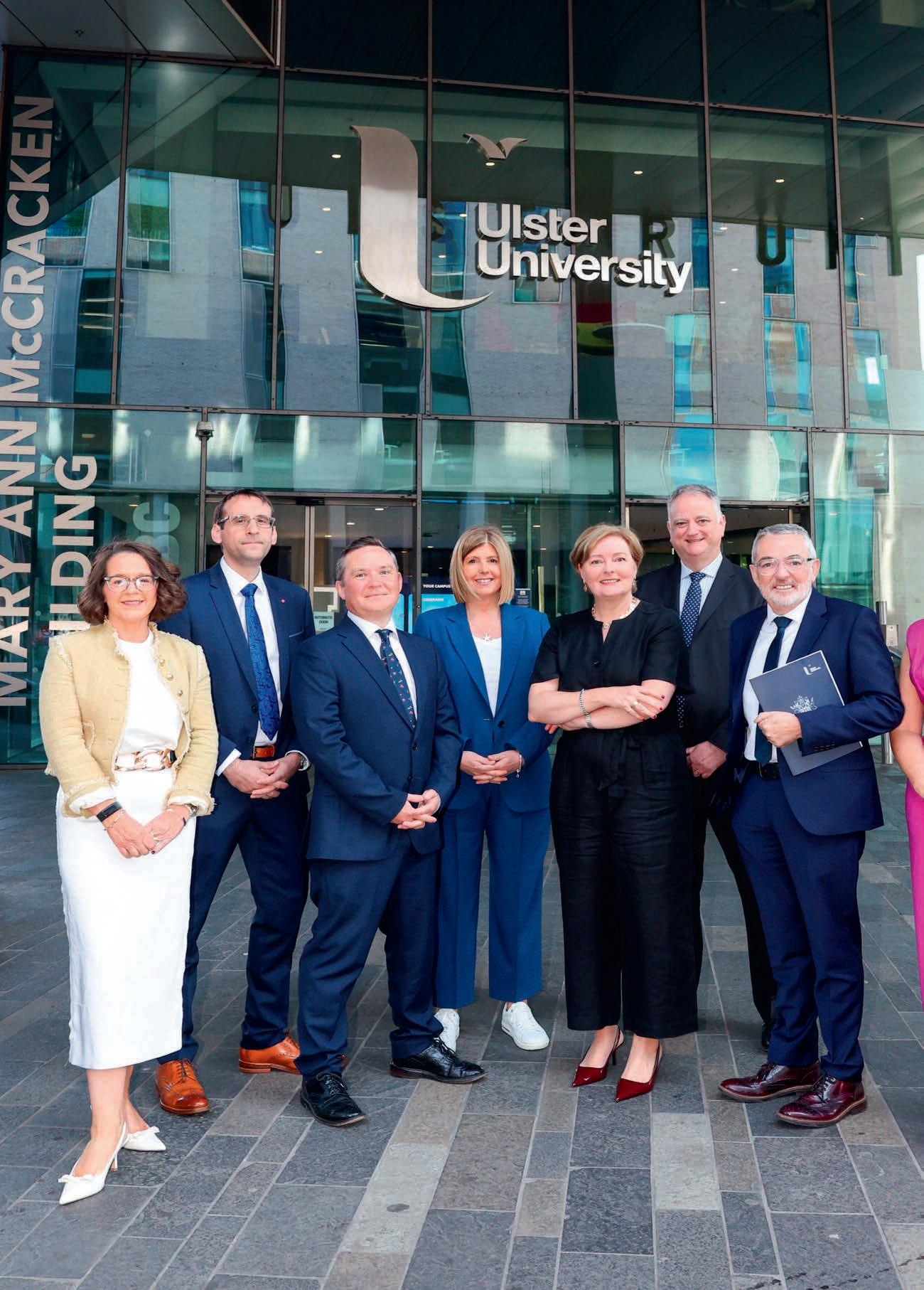




Ulster University has helped power Northern Ireland’s economy for 50 years through symbiotic business partnerships. In this feature, we speak with Professor Gillian Armstrong, Pro Vice Chancellor and Executive Dean of Ulster University Business School, about the School’s lasting impact and ambitious future.
As Ulster University Business School (UUBS) celebrates its 50th anniversary, the milestone reflects not only five decades of purposeful partnership with industry but also a renewed commitment to shaping a vibrant economic future for Northern Ireland and beyond. Rooted in a vision of people-centric partnering, UUBS strives to be an engaged, entrepreneurial business school that delivers transformational outcomes for students, sta and the wider business community.
For Professor Gillian Armstrong, Pro Vice Chancellor and Executive Dean, the anniversary is a moment of reflection. Fresh from the 50th Anniversary Launch event – attended by some of Northern Ireland’s top business leaders – she says: “This is our opportunity to reflect on the remarkable changes that have shaped our journey over the decades, whilst also celebrating the enduring core values that defined us 50 years ago and continue to inspire us today.
When the School launched in 1975, we had a reputation for being progressive and first to market with new courses and business support. The first full-time, specialist accounting degree in the UK was developed at Ulster, and that same year we launched the business studies degree. That culture of innovation is embedded in everything we do – curriculum design to student learning approaches.”
That commitment to anticipate and respond to evolving industry needs remains central.
“Staying relevant to our business community is key. We are embedding themes such as AI and Sustainable Development into our evolving course portfolio – areas that reflect both global priorities and local business needs. Organisational development continues to be an area where demand is growing rapidly. We take a flexible, partnership-driven approach, working with businesses to co-design customised programmes that deliver real value for clients. It’s how we stay connected, current and responsive to what matters most.”
Throughout the years, UUBS has become synonymous with a business-first approach to education – a clear differentiator, according to Gillian. “Some of the employers at the anniversary event openly said that their partnership with Ulster University was instrumental in enabling their growth and
expansion. We work on a variety of courses, from apprenticeships to degree, masters programmes and micro-credential short courses engaging with both local organisations and foreign direct investors.”
This responsiveness is particularly valuable in a region where economic resilience has been hard won. “We have an open-door policy and are market-driven – something that may not always be evident within academia,” she explains. “The ability to act fast is invaluable for partners like Invest NI. Many programmes need tailored context and authentic assessment, and our team delivers quickly – helping to make Northern Ireland an attractive place to do business.”
The University blends academic rigour and research excellence with commercial insight. “Many of our academics come from business and professional practice. They understand both the application of research and the realities of the business environment. We start by asking: where are the pain points? What do you need?”
That depth of engagement spans both public and private sectors. From global corporations to generational family firms, UUBS supports Northern Ireland’s diverse economic ecosystem. The Centre for Sustainable Family Enterprise, led by Dr Ian Smyth, is one such example.
“We do a lot through the UK Governmentfunded (CABS) Help to Grow programme,” Gillian adds. “We recently hosted an event in partnership with NI Chamber around generational leadership at our DerryLondonderry campus. It gave family firms a platform to share their experiences, challenges and growth journeys.”
This work underpins UUBS’s recognition as a holder of the Small Business Charter – a national accreditation highlighting its support for small businesses, local economies and student entrepreneurship.
UUBS’s new Strategic Plan reflects a contextual awareness, noting that over 80% of Northern Ireland’s businesses are family-owned and more than 89% are classed as microbusinesses. Supporting this landscape through tailored education, mentorship and research is a big part of the Business School’s mission. By empowering students and business leaders to develop an entrepreneurial mindset, UUBS is helping to build regional resilience and a skilled
talent pipeline for both local and global markets.
“It’s about theory and practice,” Gillian says. “Our degrees include an optional placement year, which is hugely valuable for students and for businesses too, giving them early access to fresh talent and new ideas.”
The Executive MBA is a prime example of a course designed for impact. “It’s a powerful programme that we continually refresh in collaboration with industry,” she says. “Many Northern Ireland business leaders are EMBA alumni – including Kerry Curran, now director of the Northern Ireland Bureau in Beijing. Kerry continues to apply the EMBA learning to complex international challenges.”
“The variety in the portfolio means we maintain strong relationships with businesses who keep coming back to us.” As the future of work evolves, so too must education. A key theme of the 50th anniversary panel discussion was how institutions can support lifelong learning in the age of AI and digital transformation.
“We integrate the Sustainable Development Goals across our curriculum, but digital skills are key. We actively encourage students to use and understand AI within their learning so they’ll be workplace-ready. But it’s about the right mix – technical proficiency combined with human skills like communication and emotional intelligence. You don’t need to be a technical expert, but you do need to understand how to work alongside AI to thrive in a fast-changing world.”
Flexibility is key. “It starts with a conversation. We’ll almost always have something that fits. And if not, we’ll create it.”
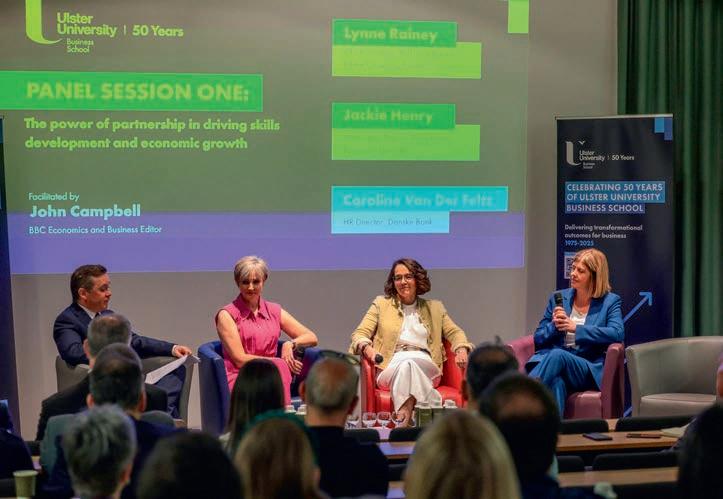
Looking ahead, Gillian frames the future of UUBS in terms of people, place and partnership – core pillars of Ulster University’s wider vision.
“Our staff are exceptional educators. But innovation often comes through partnership working – whether it’s in China, the Middle East or England. These global connections enrich Northern Ireland and vice versa. There’s a synergy, with benefits for all regions.”
The Business School Strategic Plan outlines five priorities: financial sustainability, campus development and good jobs, equality and inclusion, social impact, and international reputation via AACSB accreditation. A new Centre for Finance and Regulatory Technology is already in development (with the Faculty of Computing and Engineering), alongside expanded branch campuses and global partnership activity. UUBS is also a signatory to the UN’s Principles for Responsible Management Education (PRME) and aims to lead in family business research through the Chartered Association of Business Schools Small Business Charter.
Ultimately, Gillian believes UUBS’s impact is rooted in trust. “The quality of our students is exceptional. Many sectors will report on how people and skills are the challenge, but when you engage with us, you gain direct access to that talent. Whether it’s placements, graduate recruitment, live projects or just conversations with our staff, there’s huge value in those relationships.”
What stood out most from the 50th anniversary panel? For Gillian, it was the people and the relationships.
“From the many partnerships and stakeholders we work with, the same theme comes through regardless of location. It’s about the deep relationships they have with the staff at Ulster University and that approachability. That’s what makes the leap of faith possible. That’s what makes it work.”
And that, in essence, is UUBS’s formula for the next 50 years: trust-based collaboration, people-centric leadership and a shared commitment to economic transformation – growing a talented, skilled workforce to meet the evolving needs of business and society.
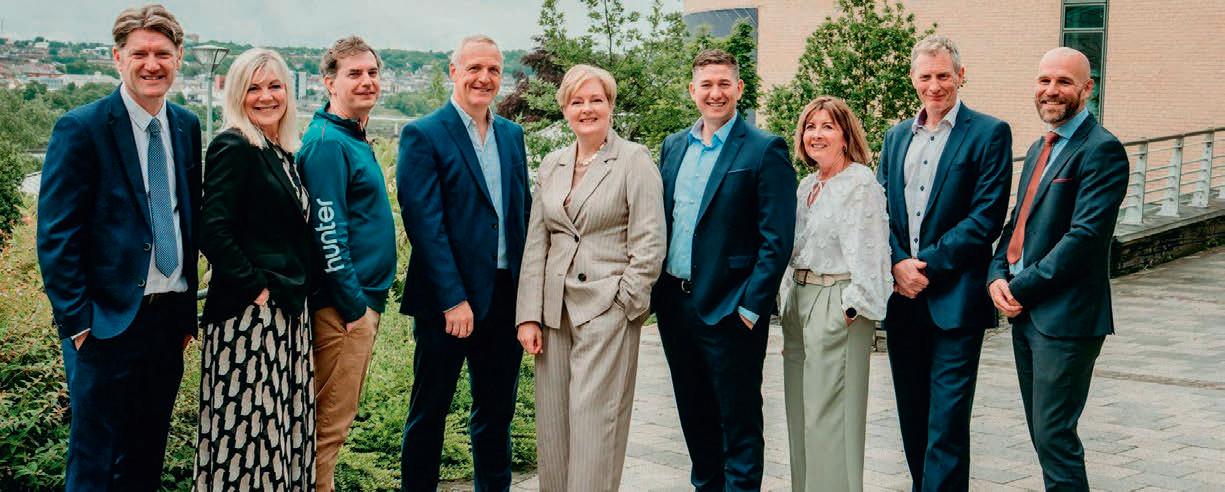
Telefónica Tech has reinforced its reputation as a forward-thinking, responsible business by taking home one of the most sought-after accolades at the Belfast Telegraph Business Awards 2025, thanks to its commitment to Environmental, Social, and Governance (ESG) excellence.
At a time when companies are increasingly being judged not only on financial performance but on their impact on people and the planet, Telefónica Tech has emerged as a leader in Northern Ireland when it comes to ESG. The company’s success at the awards underscores the critical role ESG plays in shaping a resilient, responsible, and future-ready business.
What makes Telefónica Tech’s ESG approach noteworthy is that it goes beyond ticking regulatory boxes and is a core part of their DNA as a company.
Telefónica Tech is a recognised leader in integrating ESG in Northern Ireland. It has a robust ESG strategy in place that focuses on sustainability, digital inclusion, and social impact. With a commitment to net zero by 2040, Telefónica Tech fosters community engagement through partnerships supporting disadvantaged youth, STEM education, and local charities, having raised or donated more than £40,000 in 2024 to charities.
Ellen Dickson, VP of Enterprise Health at Telefónica Tech UK&I, says that ESG is “vitally important” in order to “build relationships in our communities, give something back, and create a network where we can really reciprocate”.
Ellen continues: “At Telefónica Tech we are a community and a family. Social responsibility and community engagement are integral to a thriving workplace. A lot of our initiatives are driven by causes that are close to the hearts of our colleagues and it is important that we foster a culture of care and collaboration. Where we can help to support these initiatives in making a difference, we absolutely will and it is incredibly rewarding for us as an
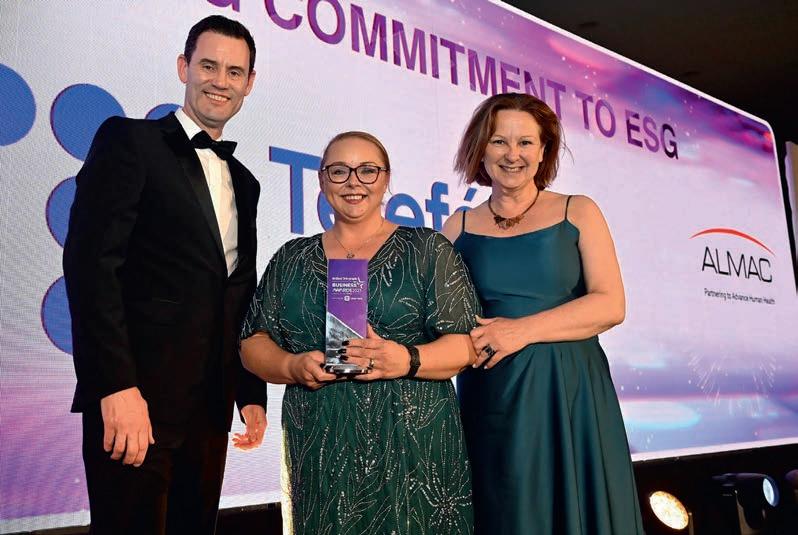
organisation to play even a small part in making a difference to local communities and charities across Northern Ireland. We are honoured to be recognised with this prestigious award highlighting our commitment to ESG.”
Janice Phayre, ESG manager at Telefónica Tech, said that the company’s approach to Environmental, Social, and Governance is “embedded in so many different areas of the business”. She explained that “each department contributes in different ways, but all departments get involved in volunteering and fundraising”.
“We’re reaching out to our communities, but we’re also thinking about staff wellbeing and the charities that we want to support.
“As an ESG manager, I’m very lucky to meet all the best people in the company. It naturally attracts those that want to give more and give back.”
From reducing their environmental footprint through cutting-edge energy solutions, to championing diversity and
inclusion in the workplace, and upholding the highest standards of governance, Telefónica Tech is setting a gold standard for ESG in the technology sector.
A key part of the company’s ESG success lies in its commitment to helping customers achieve their own sustainability goals. Through its tech solutions, Telefónica Tech empowers businesses to operate more efficiently, reduce their carbon emissions, and transition towards a greener future. This “multiplier effect” amplifies Telefónica Tech’s positive impact far beyond its own operations.
Winning this award is not just a milestone for Telefónica Tech, but a clear signal to the wider industry that ESG excellence is both a moral imperative and a business advantage.
In today’s fast-changing world, businesses that lead with purpose are the ones that thrive. Telefónica Tech’s success at the awards is a powerful reminder that doing good and doing well can go hand in hand.
By
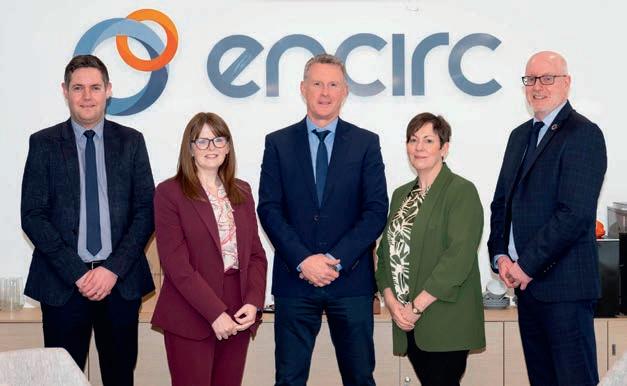
Encirc is proud to be one of the UK’s leading glass manufacturers, with a strong operational presence in Northern Ireland. As part of the Vidrala Group, Encirc employs around 2,000 people, including over 500 dedicated colleagues at our Derrylin, Fermanagh site. Our commitment to building a circular, sustainable economy is central to our business strategy.
Yet like many manufacturers, we are navigating a complex landscape: rising energy costs, evolving legislation such as Extended Producer Responsibility (EPR), the transition to carbon reduced fuels, and intensifying global competition from lowcost imports.
Despite these headwinds, we see clear opportunities to innovate and lead.
High Energy Costs – A Call for Action
Energy is fundamental to glass manufacturing. Our furnaces operate 24/7 at extremely high temperatures, making us particularly sensitive to industrial energy prices. Northern Ireland currently faces some of the highest industrial energy costs in Europe, placing local manufacturers at a significant disadvantage.
Encouragingly, reforms in England show what’s possible with the right policies: targeted support for energy-intensive industries, investment in renewables, and improved grid connectivity. These aren’t just cost-saving measures, they’re essential to building a cleaner, more resilient energy future.
Northern Ireland must not fall behind. We cannot accept a two-tier energy system within the UK. Fast-tracking investment in grid modernisation, renewables, and tailored support for manufacturers is essential. At Encirc, we’re ready to lead this transition by example.
The introduction of EPR represents a significant step forward in holding producers accountable for packaging waste. As longstanding advocates of the circular economy, Encirc supports this principle.
Glass is fully aligned with EPR’s sustainability goals as it is the only packaging material that is 100% and infinitely recyclable. Glass is truly inert ensuring that nothing transfers to the product it contains, guaranteeing purity, safety and peace of mind for both people and the planet. However, the recently announced EPR fees, based primarily on material weight, could have significant consequences. By incentivising a shift to lighter, less
recyclable packaging, they risk undermining the very goals they were designed to support.
Encirc urges policymakers to reconsider. A more balanced approach that factors in full environmental impact, not just weight, is essential to avoid material switching that harms long-term sustainability.
We believe the future of glass manufacturing lies in clean, renewable fuels. Biomethane is a strong candidate to replace natural gas, but the journey must be realistic. Infrastructure, affordability, and policy support are all critical to making biomethane scalable.
Encirc is playing an active role in this transition. I sit on the Community Decarbonisation Pathway committee, which is exploring how Fermanagh could become a regional hub for biomethane excellence. This initiative could provide a model for rollout across Northern Ireland.
Alongside biomethane, we are also working with alternative low-carbon solutions, renewable electricity, hydrogen, and biofuels, as part of our Net Zero 2030 roadmap. The journey is ongoing, but our commitment is clear.
Encirc holds itself to high environmental and social standards. However, we operate in a global marketplace where many competitors benefit from lower energy costs or weaker environmental regulations. This creates an uneven playing field. What’s needed is fairer trade policy, one that rewards sustainable practices and protects responsible manufacturers from unfair competition. With smart regulation and strong support for green innovation, producers like Encirc can continue to thrive without compromising on our values.
Encirc’s story is one of resilience and ambition, fully aligned with the Vidrala Group’s long-term vision. Being named Outstanding Business of the Year is a proud milestone but, more importantly, it reinforces our belief that Northern Ireland can lead in sustainable manufacturing.
We’re calling for joined-up action between government and industry to drive investment in cleaner energy, support circular innovation, and back domestic manufacturing. With the right infrastructure and policy support, the potential is immense.
We remain optimistic for our people, our place, and the future of glass; the truly sustainable material.



Ben Hayman Executive Director, Anthesis
In an era defined by constant and significant disruption, employees are looking to business leaders for guidance and clarity. Ben Hayman, executive director at global sustainability consultancy, Anthesis Group, reveals a crisis in leadership in its latest research and uncovers five core strategies for today’s business leaders.
President Trump’s return to office and implementation of protectionist economic policies has fuelled instability across global markets. Add to this the threat of a full-scale trade war, escalating conflicts, climate volatility, social inequality, and the rapid advance of AI – and it’s clear that today’s leaders are navigating a tumultuous global landscape.
Anthesis found that nearly threequarters of employees believe their leaders need to be better equipped to meet today’s challenges, revealing there is a distinct lack of confidence in the abilities of those in senior leadership teams to adequately meet the challenges of today’s world.
Our research also reveals the qualities employees value the most in their senior leaders – with two characteristics rising to the top: ‘clear communication’ and ‘a clear purpose, beyond just making money’, echoing a growing demand for leadership that is not only decisive, but also meaningful.
Five strategies for purposeful leadership in uncertain times
No compromise on performance
With the UN’s ‘Decade of Action’ at its halfway point, some organisations are already scaling back their ambition as the 2030 targets begin to draw closer. Business leaders who want to maintain a progressive, profitable long-term agenda will need to focus relentlessly on commercial performance. Sustainability and social responsibility cannot be an adjunct, a business cost or merely a campaign. Those who lead successfully in this arena do so by building strong business cases that remove any semblance of compromise.
Agility is often cited as essential to modern leadership – and with good reason. Today’s leaders are operating in a state of near-constant disruption, where the ability to adapt quickly is no longer a nice-to-have but a baseline expectation for C-suite members. But true agility goes beyond fast decisions. It requires continuous learning, humility and self-awareness. ‘Being open to learning’ ranks among the top five qualities employees value in senior leaders – a reminder that even those at the top must remain students of the world around them.
Enable followership
Leadership is a narrow concept: focused on individuals rather than the cultures they create. In our experience, ‘followership’ is just as critical in organisational outcomes. The concept of followership is not about passive obedience, but about engaged, valuesdriven people who actively support and shape the culture around them. To encourage followership, tools such as effective communication and seeking out diverse perspectives are key.
Stay close to the action
Leaders are often too far from the reality of day-to-day operations. The mandate for sustainability is often set from senior executives, fully bought in and incentivised to deliver. But their success hinges on mid-level executives. To meet that need, leaders must get closer –both to the work, and to the people delivering it, particularly in sustainability where complex regulation and reporting create layers between executives and the reality of the work going on in their businesses.
Own your legacy
As we hit the halfway mark in the 2020s, many leaders are thinking about what they will leave behind. Leaders who can understand and plan for a legacy will be better able to navigate the complexities of the changing environment with the courage required to make difficult choices and build something that outlasts their tenure and creates real, lasting change.
Responding to this moment
The road ahead requires more than charismatic figureheads or bold statements – it demands leaders who are present, open to learning, committed to sustainability and capable of creating meaningful followership. The next five years will be defined by how leaders respond to this moment – whether they retreat into the safety of familiar tactics or step forward with a renewed sense of purpose, clarity and courage.
“Our research also reveals the qualities employees value the most in their senior leaders – with two characteristics rising to the top: ‘clear communication’ and ‘a clear purpose, beyond just making money’...”
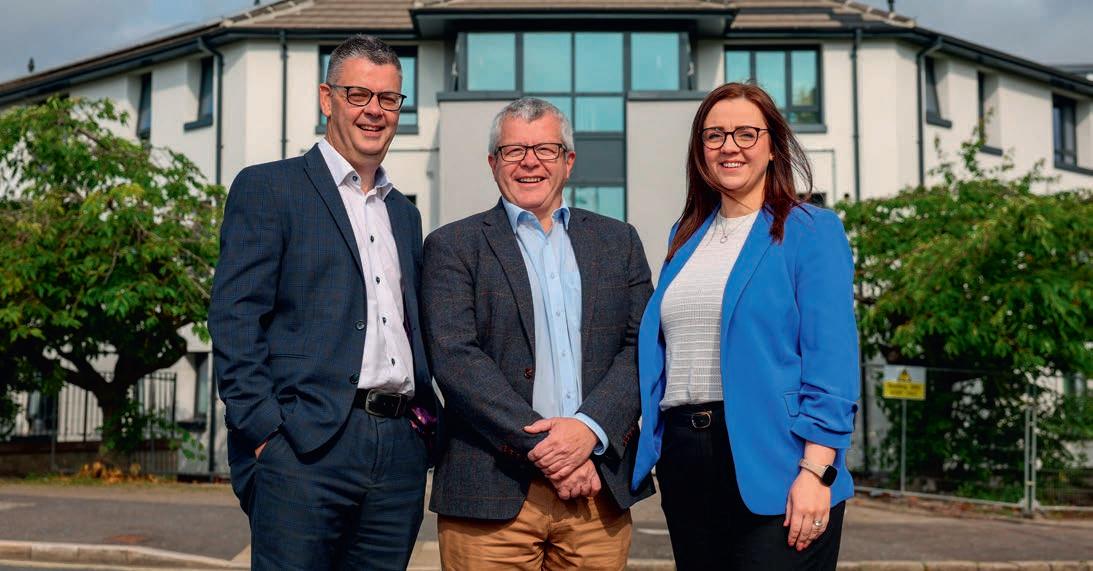

Danske Bank and Radius Housing Association have agreed a new £75m Sustainability Linked Loan package that will support the development of new social and a ordable homes across Northern Ireland in the next three years.
Radius Housing said the loan will be used to support investment in up to 500 new homes and to fund the retrofitting and refurbishment of 1,000 other homes to improve energy efficiency.
Radius Housing is a social enterprise which provides housing, care and support to over 33,000 homes throughout the island of Ireland. It employs around 1,000 people and manages 14,000 properties in 80 towns across Northern Ireland, with a presence in all 11 council areas.
The deal is one of the largest sustainability linked loans ever agreed by a Northern Ireland Housing Association. Sustainability linked lending links the debt costs of a business’s finance with its performance against pre-agreed sustainability objectives.
The funding is aligned with Radius’ sustainability ambitions, and incorporates targets focused on reducing greenhouse gas emissions intensity and improving property energy performance certificates (EPCs).
Alan Thomson, director of finance at Radius Housing, said: “Radius Housing is committed to improving the sustainability of our
business practices as part of our continual focus on improving the service we provide to our tenants. Agreeing this sustainability linked loan with Danske Bank is the next step on our journey and aligns with our strategy to ensure sustainability is embedded in all of our new and retrofitted homes, helping Radius become one of the most efficient and sustainable housing providers in the region.”
Claire McKeown, Corporate Relationship Banking at Danske Bank, said: “We are delighted to provide this significant financial package to Radius Housing to support them in their mission to become one of the most sustainable and efficient housing providers in Northern Ireland. Thanks to close collaboration with Savills Financial Consultants and the legal teams in Shoosmiths, TLT, Anthony Collins and Wilson Nesbitt, we were able to facilitate a quick completion on the funding.”
Dominic O’Neill, Senior Corporate Relationship Banking at Danske Bank, added:
“Danske Bank has been a lead provider of finance to the social housing sector in Northern Ireland for many years and we want to continue to help the sector to thrive and meet the needs of people across Northern Ireland. The funding underscores our commitment to sustainable development and supporting communities across Northern Ireland.”

A call to action for workplaces, by Dan Pyrah, Senior Associate – Consultant, Workplace Health Consulting at Mercer Marsh Benefits.
At Mercer, more and more we are asked to address a critical issue that affects not only individual employees but also the overall health of our clients’ business environment: mental health in the workplace. In today’s fastpaced and often stressful work environment, the mental wellbeing of employees has emerged as a paramount concern that cannot be overlooked.
Mental health is not just a personal issue; it is a significant people risk that can impact productivity, employee engagement, and ultimately, the bottom line. When employees struggle with mental health challenges, the effects ripple through the
organisation, leading to increased absenteeism, decreased morale, and higher turnover rates. This is a reality that every business leader should take seriously.
The workplace is where many individuals spend a significant portion of their lives, and it is essential that we foster an environment that supports mental well-being. By prioritising mental health, businesses can create a culture of openness and support, encouraging employees to seek help when needed without fear of stigma. This not only enhances individual wellbeing but also cultivates a more resilient workforce.

The statistics surrounding mental health in the workplace are alarming. According to recent studies, one in four people will experience a mental health issue at some point in their lives. This statistic highlights the prevalence of mental health challenges and underscores the importance of addressing them within our organisations. Furthermore, the World Health Organisation has reported that depression and anxiety alone cost the global economy approximately £1 trillion each year in lost productivity. These figures should serve as a wake-up call for business leaders. The financial implications of neglecting mental health are significant, and the cost of inaction far outweighs the investment required to implement effective mental health strategies. By fostering a mentally healthy workplace, organisations can not only reduce absenteeism and presenteeism but also enhance overall employee performance and satisfaction.
To effectively address mental health in the workplace, businesses should consider implementing comprehensive mental health programmes that include training for managers, access to mental health resources, and regular assessments of employee well-being. Training for managers is particularly crucial, as they play a pivotal role in shaping workplace culture. By equipping managers with the skills to recognise signs of mental distress and to approach conversations about mental health with sensitivity, organisations can create an environment where employees feel safe to discuss their challenges.
Access to mental health resources is another vital component of a supportive workplace. This can include Employee Assistance Programmes (EAPs), counselling services, and mental health days. Providing employees with the tools they need to manage their mental health not only demonstrates that the organisation cares but also empowers individuals to take charge of their well-being.
Regular assessments of employee well-being can help organisations identify trends and areas for
improvement. Surveys and feedback mechanisms can provide valuable insights into the mental health landscape of the workplace, allowing leaders to make informed decisions about the support and resources needed.
Leadership plays a crucial role in prioritising mental health within an organisation. When leaders openly discuss mental health and share their own experiences, it helps to normalise the conversation and reduce stigma. This can be achieved through initiatives such as mental health awareness campaigns, workshops, and open forums where employees can share their thoughts and experiences. Moreover, leaders should model healthy behaviours themselves. This includes demonstrating worklife balance, taking breaks, and encouraging employees to do the same. When leaders prioritise their own mental health, it sends a powerful message to the rest of the organisation that mental well-being is valued and important.
Investing in mental health initiatives is not merely a moral obligation; it is a strategic business decision. Organisations that prioritise mental health see tangible benefits, including improved employee performance, enhanced creativity, and a stronger sense of loyalty among staff.
Furthermore, a mentally healthy workplace can attract top talent, as prospective employees increasingly seek employers who value their wellbeing.
The return on investment for mental health initiatives can be substantial. Research has shown that for every £1 invested in mental health support, businesses can expect a return of £4 in improved productivity. This compelling statistic highlights the financial sense of prioritising mental health and reinforces the idea that a healthy workforce is a productive workforce.
As members of the local business community, we have a collective responsibility to champion mental
health in our workplaces. Let us work together to break the silence surrounding mental health issues and foster a culture of support and understanding. By doing so, we not only enhance the lives of our employees but also strengthen the fabric of our community.
It is essential to recognise that mental health is not a one-time initiative but an ongoing commitment. Regular training, open discussions, and continuous evaluation of mental health programmes are necessary to ensure that they remain effective and relevant.
In conclusion, mental health is an essential component of a thriving workplace. It is time for us to recognise its importance and take action. Together, we can create a healthier, more productive business environment that benefits everyone.
Let us commit to prioritising mental health in our organisations, fostering a culture of openness, and providing the necessary resources to support our employees. By doing so, we not only enhance individual well-being but also contribute to the overall success and sustainability of our businesses. The time for change is now, and it starts with us.
“By prioritising mental health, businesses can create a culture of openness and support, encouraging employees to seek help when needed.”

development of young people across Northern Ireland.”
The EA’s EdIS (Education Information Solutions) Programme, which is transforming the educational landscape through technological innovation, worked closely with BT in delivering the Immersive Classroom. This forms part of BT’s social value commitment as a result of being awarded the EdIS Wireless Project, which has brought best-in-class wireless connectivity to over 1,100 schools in Northern Ireland.
Frances Meehan, director of the Education Authority’s EdIS Programme, said:

The Education Authority (EA), BT and W5 have announced the opening of a brand-new Immersive Classroom designed to provide support and learning experiences for children and young people.
Education Minister Paul Givan cut the ribbon to formally open the Immersive Classroom, based at W5 Belfast, which is a 5G-enabled interactive simulation experience that uses a range of sensory and visual interactions.
The Classroom will have designated priority days for special schools (including Specialist Provisions) which will be free of charge, supporting those with additional needs. All NI schools can access this additional facility as part of their educational visit to W5.
The fully immersive room uses cameras and HD projectors to bring content to life across the room’s walls and floor. Inside the Classroom, users can experience real-life or imagined scenarios in detail and virtually transport themselves into simulated environments augmented with lights, sounds and smells.
The Classroom comes equipped with a content library which contains thousands of computer-generated scenarios, reallife environments, games and training experiences. It is also compatible with VR, AR and XR technologies to enhance the user experience.
Brian Morrissey, head of Government and Education, BT Northern Ireland, said:
“Immersive Classrooms offer a unique opportunity for people to have fully customisable interactive experience.
“This can be particularly impactful for supporting learning and experiences for schoolchildren and can be tailored to meet the requirements of those with additional needs.
“We are proud to work alongside EA and W5 to support the growing and vital use of technology to enhance the learning and
“The EA’s invaluable partnerships with BT and W5 have had a transformative impact on education delivery in Northern Ireland and together we have achieved remarkable milestones.
“We are thrilled to officially launch this new facility, which will be available to all. We are especially excited about the potential of the Immersive Classroom to enrich learning experiences for our SEN pupils, with three days each week dedicated exclusively to their use at no cost.”
The Immersive Classroom is housed in W5, Northern Ireland’s award-winning science and discovery centre which offers more than 250 STEM-based exhibits, interactive workshops and hands-on science shows for learners of all ages.
W5’s four floors explore everything from nature and climate change to optical illusions to film and television to how the human body works, offering thought-provoking fun for the whole family. Alongside its range of permanent exhibits, W5 also offers an extensive programme of seasonal exhibitions and events.
Victoria Denoon, head of W5, said: “W5 is proud to launch this Immersive Classroom, alongside the Education Authority and BT, representing an exciting step forward in the integration of technology and education.
“This state-of-the-art multi-sensory environment offers a dynamic and inclusive Classroom where pupils can engage with bespoke content tailored to their individual learning needs and styles. Importantly, it provides meaningful support for young people with special educational needs, creating opportunities for deeper engagement and more accessible learning experiences.”


Ranked as Northern Ireland’s top law firm for Planning & Environmental Law by The Legal 500 in:
…we're going to need a bigger page.


FROM APPRENTICE TO MD, KIERON MILLAR IS BEST PLACED TO OVERSEE THE GROWTH OF ONE OF OUR MOST SUCCESSFUL FACILITIES MANAGEMENT AND FIT OUT FIRMS.
When Kieron Millar started his career as an Apprentice Electrician, he didn’t foresee himself leading a multi-million pound business. And yet, fifteen years since joining H&J Martin Group, he had worked his way up to the position of Managing Director of the H&J Martin Group, overseeing close to 300 employees and leading expansion across the UK and the Republic of Ireland. His journey from the ground up has not only shaped his leadership but has also influenced the company’s direction.

“H&J Martin has been around for over a hundred years having been founded in 1840. The Facilities Management and Fit Out side of the business has really developed over the last two decades,” Kieron begins. “Since merging into the Lagan Specialist Contracting Group in 2015, we created the H&J Martin Group brand, which encompasses Facilities Management, Fit Out , and now new specialist services through our Rosewood Bespoke Joinery and Elmwood Protection Services businesses.”
Today, H&J Martin Group delivers high-spec Fit Out projects and comprehensive Facilities Management services to a wide range of sectors. Clients include high end retailers and numerous public service bodies. Offices span Northern Ireland, the Republic of Ireland and, more recently, London, with a new Whitechapel location just opened.
“Demand is different across our brands,” said Kieron. “For Fit Out, we’re seeing most of the growth outside Northern Ireland, which is why we have opened a new London office in Whitechapel. For Elmwood Protection Services, we’re taking an all-Ireland approach. We launched in April this year to separate out the Fire, Security, Doors and Gates services we already had internally to give it the autonomy to grow across the whole of Ireland. We see huge potential in our teams, who are experts in their field, to deliver excellence across this highly specialised service offering.”

Rosewood Bespoke Joinery, meanwhile, was created in 2022 in response to supply chain gaps during the pandemic. Housed in a 22,000 sq ft warehouse in Cookstown, the brand delivers high-end bespoke joinery for both internal projects and external clients, including world-renowned hotels in Mayfair, London.
“Rosewood Bespoke Joinery came about when we realised we couldn’t solely rely on supply chain for specialist joinery,” said Kieron. “Now we do it ourselves. We are laser focused on high end supply and quality. For Rosewood Bespoke Joinery, we want to see growth across all regions with a specific focus on the London market.”




“I believe that we’re never done learning. This is why apprenticeships are so integral to the strategy of our business as I truly believe in the potential to find the future leaders of businesses when they have worked from the ground up, understood the culture; it makes them better leaders.”
The pipeline across the group is strong, with 75 percent of next year’s workload already secured and 50 percent booked for the following year. This includes both public and private contracts, with growth projected across all business units.
From a Facilities Management perspective, our growth will focus on gaining more market share in the Republic of Ireland, moving slightly away from being primarily public-sector led in Northern Ireland,” said Kieron. “In London and Greater London, we’ll look to develop Facilities Management from 2028 onwards. That’s a longer-term strategy as part of a Strategic Growth Plan leading up to 2030.”
The Fit Out division continues to be driven by private sector work. “Around 65 percent of our Fit Out is high-end retail. We’re finishing up a high end retail Fit Out in Glasgow now, and we’ve already delivered sites in Edinburgh, Bristol and Birmingham, with Chester coming next.”
Projects closer to home include the transformation of the old BHS site on Belfast’s Castle Lane, as well as work on leisure brands such as Pure Gym in Dungannon.
Rosewood Bespoke Joinery is nearly at capacity,” added Kieron. “We’re starting to look at plans over the next 2 to 3 years relating to expansion such as weighing up lease versus purchase. With manufacturing, it’s important not to take on too much at once. But demand is definitely there.”
H&J Martin’s reputation for consistent delivery has led to contract extensions at some of Northern Ireland’s most iconic locations. “We recently resecured Facilities Management contracts at Belfast City Airport and the Clearer Twist National Stadium at Windsor Park ,” said Kieron. “Each of those is for three years. We’ve also had long-standing contracts with clients like Boots and IKEA, some of which stretch to eight years.”
For Kieron, these repeat wins are more meaningful than new contracts. “Winning back a client is a bigger achievement in my view. It shows you’ve delivered consistently and built a relationship based on trust. That longevity is something we’re known for.”
One of Kieron’s proudest achievements is the launch of the H&J Martin Academy. The Academy was created as a long-term strategy for staff development, succession planning, and talent attraction, and has become central to the company’s culture. We’re around 270 people now, and that fluctuates. About four years ago, we knew we needed a different direction in terms of growth. The Academy grew from a strategy group focused on attracting and developing new talent,” he said. It’s not just apprenticeships, although they are a key part. We use it to train staff across all areas including Quantity Surveyors, Human Resources, Trades and Commercial roles. It’s also a way to reach out to school leavers and grassroots programmes. We go into schools, we advertise the pathways, and we’ve made it a real part of how we prepare for growth.”
Kieron’s own experience has heavily influenced this approach. “I started my career out on construction sites. When I decided that I wanted to pursue a more office based role, I went back into education to get the qualifications I needed for that role and now I’m completing my Chartership with the Institute of Directors. So the education never stops, I believe that we’re never done learning. This is why apprenticeships are so integral to the strategy of our business as I truly believe in the potential to find the future leaders of businesses when they have worked from the ground up, understood the culture; it makes them better leaders.”
He believes his practical background gives him a unique perspective in
the boardroom. “It’s made me more savvy, more interpersonal. I try to be approachable and involved. We do regular staff briefings so people know how the business is performing. Engineers and office staff still pop in for a catch-up. I don’t think you should ever lose touch with that.”
Under his leadership, H&J Martin has shifted from subcontracting to selfdelivery. “In 2015 we were about 90 staff, now we’re 267. Around 70 percent of what we do is delivered directly. That gives us control, better outcomes, and a more competitive edge.”
Kieron acknowledges the pace of change across the group, especially in recent years. “The last 12 to 18 months have been transformative. We’re not stagnant. We’re innovating, looking at AI, upgrading systems. We review things every six months now. We’ve come a long way from where we were.”
As a Council member of the Chamber and an active member of the Institute of Directors, Kieron keeps close to wider industry conversations. He is optimistic about the market but realistic about the challenges. “Public procurement is still far too slow in Northern Ireland. I don’t see that changing any time soon,” he said.
“That’s why we’re focusing more on the GB market and seeing strong opportunity in the Republic of Ireland.”
Through it all, Kieron remains grounded in the ethos that shaped his journey.
“The goal is to keep building something sustainable, something better. I want to leave the business in a stronger position than when I started. That means more agile, more trusted, and ready for the future.”

Shauna Burns Managing Director, Beyond Business Travel
Over the past decade, Northern Ireland has transformed from a scenic backdrop to a strategic location of choice for global productions. This shift has had a significant economic impact, with the local industry generating over £330 million between 2018 and 2023, according to Northern Ireland Screen.
This figure has continued to rapidly rise over the last two years with big budget productions filming in Northern Ireland such as ‘The Death of Robin Hood’, HBO’s ‘A Knight of the Seven Kingdoms’ and Universal’s ‘How to Train your Dragon’, as well as recurring popular TV shows such as ‘Blue Lights’ and ‘Mastermind’ to name but a few.
While the spotlight shines on the stars and the stories, we at Beyond Business Travel have been working tirelessly behind the scenes with various television and film production teams to ensure everything runs smoothly. This role of corporate travel management is crucial in ensuring efficient logistics for these productions. In today’s high-expectation, environmentally conscious world, we must go beyond booking flights and hotels. We manage the entire travel logistics, ensuring that every aspect of the journey is seamless. Our team is available 24/7 to handle any last-minute changes or emergencies, ensuring that the production schedule is not disrupted.
The Unseen Production Behind the Scenes
When it comes to filming shoots across multiple geographic locations, fluid production schedules and daily roster changes for cast and crew, managing travel logistics becomes a high-pressure operation.
For instance, during a recent high-
end production, our team managed the travel logistics for over 300 cast and crew members, coordinating their movements across multiple locations. Our team’s expertise in travel management ensured that the production operated seamlessly allowing the filmmakers to focus on their creative work.
Similarly, we provided travel management services for another high-end production that was complex in nature involving filming in various geographical locations with different regulatory requirements.
And it’s not just the entertainment industry. Many other client sectors that we service include consulting, tech and pharma, and they face similarly unpredictable travel issues. Beyond Business Travel is a partner that delivers on risk mitigation, and rapid, real-time responsiveness to help our clients navigate a world of shifting expectations, evolving rules and environmental scrutiny.
In the end, every frame we see on screen is the result of thousands of decisions made behind it. And among the most important? How to get the right people in the right place at the right time.
Across both the creative industries and wider business sectors, travel now intersects with critical commercial priorities including financial efficiency, operational agility and environmental accountability.
So, what practical support can a Travel Management Company (TMC) like Beyond Business Travel provide?
One of the key aspects of our service is financial efficiency. We negotiate rates and consolidate travel reporting, which helps our clients maintain budgets amidst the unpredictability of the likes of production costs. By leveraging our industry relationships and expertise, we ensure that our clients get the best possible rates for their travel needs. In high-budget productions or corporate operations, this level of control is essential.
Environmental sustainability is also a priority for us. In today’s world, it is vital for companies to demonstrate their commitment to reducing carbon footprints whether they’re running a film shoot or a corporate conference. We offer carbon tracking, offsetting solutions and low-emission alternatives to help them meet their ESG goals.
We offer operational flexibility that meets today’s demands, whether that’s coordinating last-minute crew changes, urgent site visits or real-time re-routing across Ireland and the UK. Our team is dedicated to providing this personalised service, ensuring that every client receives the attention and support they need.
Ultimately, our goal at Beyond Business Travel is to establish a seamless travel management system that caters to businesses of all sizes, whether local or those that have chosen to invest in our region.
And while the stars and stories of Northern Ireland’s film and TV industry may capture the headlines, it is the behind-the-scenes work of Beyond Business Travel that plays a crucial role in bringing these productions to life.


From collapse to climate leadership, Ballymena-based Wrightbus has reinvented itself as a global pioneer in zeroemission transport. Now, with the appointment of ESG Director Sarah Schaefer, the company is embedding sustainability into every process – not just on the road, but behind the scenes.
When Sarah Schaefer joined Wrightbus as ESG director just three months ago, she brought with her an impressive track record in corporate sustainability, having held senior roles at Mars, Unilever, and Electrolux, as well as serving as a special advisor to David Miliband during the last Labour Government. Yet what drew her to the Ballymena-based bus manufacturer wasn’t just its products. “I’m purposedriven,” she says. “Apart from my children, I believe the best way to make a real difference is to change how businesses operate.”
She continues, “I spent 15 years working with large companies that were legacy businesses trying to minimise their negative impact. I wanted to focus on maximising positive impact. I was blown away by Wrightbus and how it has pivoted from over 95% diesel production to over

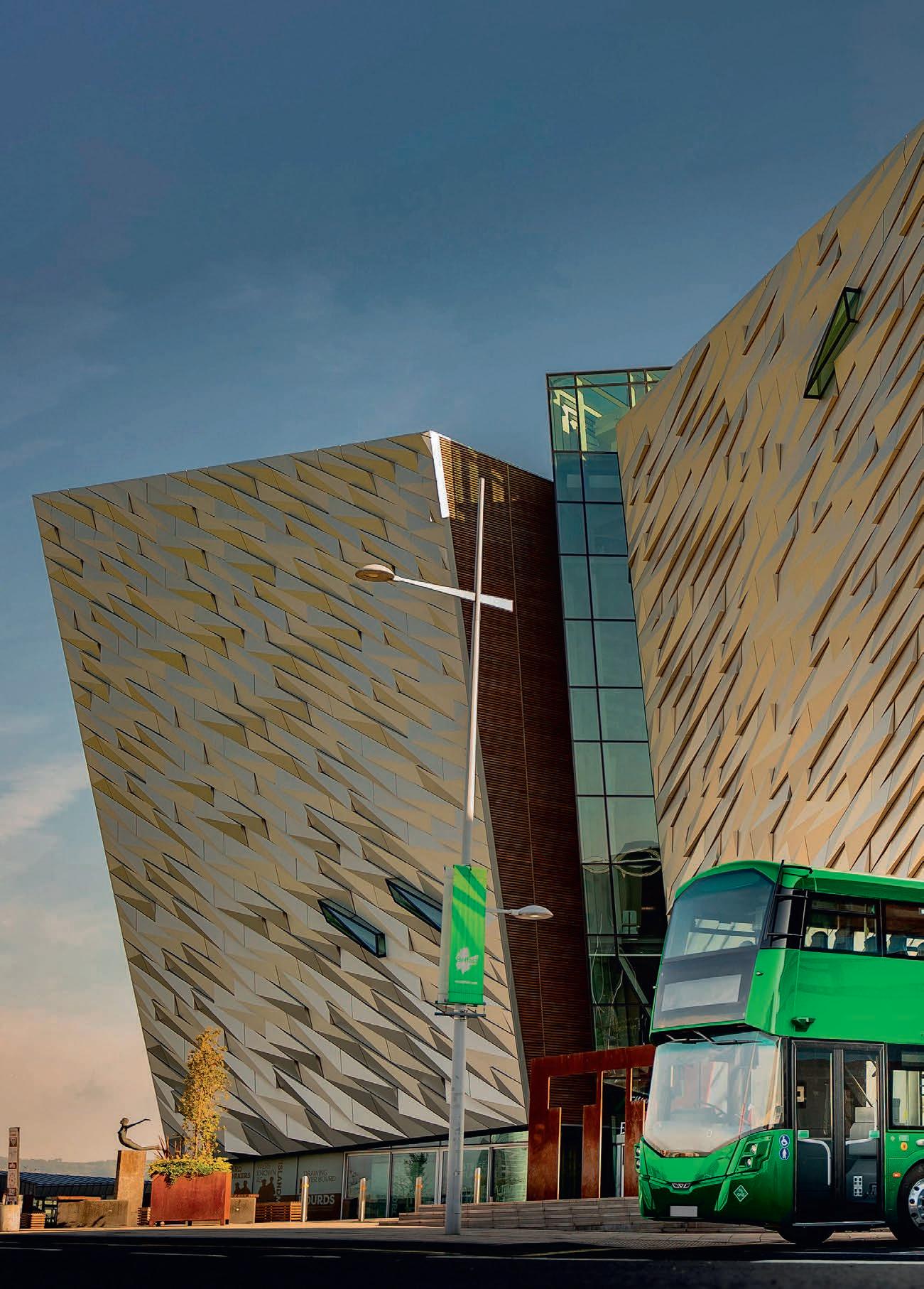



95% hydrogen and electric. It’s delivering better air quality and regional growth while contributing to decarbonisation in the UK.”
Under the leadership of CEO JeanMarc Gales, who moved to Wrightbus after rescuing Lotus, the firm is now recognised as Europe’s fastest-growing bus manufacturer, recently scooping Manufacturer of the Year at the Insider’s Made in the UK Awards and securing a £150 million deal with HSBC to scale production. The firm’s zero-emissions vehicles are rolling out across the UK, Germany, and beyond and Sarah’s appointment, alongside a suite of industry professionals from across the transport spectrum, signals a commitment to embedding ESG into every part of its operation, not just the vehicles it produces.
“We’ve already saved over 50 million CO2 miles,” she says. That’s equivalent to preventing about 85,000 tonnes of CO2 emissions. “But we mustn’t be complacent and the chief executive is rightly holding everyone to account. When you grow as quickly as we have, you need the right systems in place. We’re focusing heavily now on how we manufacture, on our scope one and two emissions, on sourcing raw materials responsibly, and on what we can replace to do better.”
While Wrightbus is best known for its hydrogen and electric buses, Sarah is keen to emphasise that ESG at the company goes far beyond the vehicles themselves.
“We want to quantify the positive impact we’re making. It’s becoming more important both commercially and societally. The environmental impact is clear, but the social side like community benefit, workforce wellbeing, and fair opportunity is equally important.”
Wrightbus is doubling apprenticeships year on year and actively working with Northern Regional College (NRC), Queen’s University, and Mid and East Antrim Council to attract local talent. “We’ve hosted 22 community engagement events this year alone,” says Sarah. “We’re engaging economically inactive communities, supporting skill changers, and making a strong case that green jobs are the future.”
Evidence of the company’s community impact is perhaps best illustrated by the 19 pairs of fathers and sons currently working across its operations. “In the past, manufacturing was seen as blue collar,” says Sarah. “Now, there’s a real mix of roles: green collar jobs in hydrogen, electrification, diagnostics, and beyond. We’re setting our own bar.”
Sarah sees education and training partnerships as vital to regional regeneration. “When people come through apprenticeships and end up in senior roles,
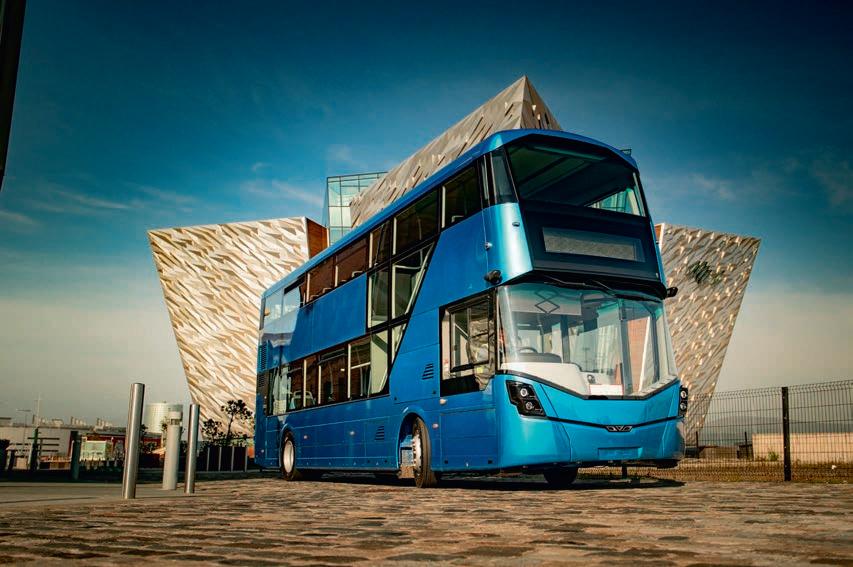
that’s real social value. We’re working with Queen’s and local schools to ensure clear routes into the business.”
Its other ESG efforts are visible through its W-Tech engineering research hub with QUB. The company employs 35 people who develop diagnostics tools, zero-emission models, and even work with sociologists to understand travel behaviour.
Wrightbus’ influence is also being felt beyond Ballymena. “Every job we create in Northern Ireland has a multiplier effect across the UK. We want to find ways to capture that and work with authorities and operators so that everyone is pulling toward the same goal.”
Wrightbus’ proprietary WB UPTIME 365 is a key part of its ESG strategy. “It tracks 5,000 signals in real time and integrates into smart city systems,” says Sarah. “It can even inform passengers whether vehicles are full or not. That level of transparency is vital.”
She sees tech as a great enabler for both environmental and equity goals. “We’re pushing ourselves on data, on measurement, on how to report value, not just carbon but also jobs and community impact.”
The company is expanding fast, delivering to Germany, Australia, and beyond. “We’re proud of our growth, but it brings responsibility. Our emissions could increase with scale, so we must adopt strategies that reduce the absolute impact of manufacturing a bus.
“We want to be a net zero business by 2050, preferably sooner. It’s not job done just because we make zero-emission buses. Every element of our operation, from how we build to how we engage, must contribute to that.”
Project HySpeed is just one way the firm is contributing to UK-wide decarbonisation. “We’re proud to be part of this £6.5 billion hydrogen initiative. It’s a sign that ESG is front and centre here.
In a world where the ESG agenda is under pressure, Wrightbus shows that you can be profitable, responsible, and innovative.”
Sarah is also helping shape wider ESG conversations across procurement and public transport. “When local authorities procure buses, the social and environmental value should be part of the deal. We’re working to influence how that gets measured. Carbon is easy to measure, but social impact isn’t and we’re determined to lead there too.”
She continues, “We’re backing local operators and giving them tools to decarbonise. What’s happening at Wrightbus is seeping into trucks, coaches, and wider mobility services. We’re becoming a service provider too, not just a manufacturer.”
Even internally, ESG isn’t just a function; it’s a mindset. “I go to every department to bring that extra sense of rigour. We’re growing fast, yes, but we’re also raising our internal standards to match the scale.”
Sarah acknowledges the challenge of operating in the UK manufacturing landscape, especially under cost pressures. “We have to be lean and commercially successful. But there’s a growing recognition that value comes from ESG integration. It’s an increasing part of public sector tenders.”
She points to Wrightbus’ story as proof that net zero doesn’t mean job losses. “We’ve gone from 43 employees in 2019 to over 2,300 today. We’re showing that green growth can be a national strength.
“It’s pretty amazing to wake up each morning and know that because of what we’re doing here, Northern Ireland, the UK, and the planet are better off. That keeps me motivated, even when the world is cynical, even when ESG is under fire. We show it can work.”
In Wrightbus, she’s found the perfect vehicle to drive that vision forward.

Chris Barton HM Trade Commissioner, Europe
Iam delighted to connect with Northern Ireland Chamber of Commerce members and share some thoughts on my recent visit to Belfast, exciting export opportunities in Europe and how DBT can enable more export-capable businesses across NI to find success there.
As my tenure as HM Trade Commissioner for Europe nears its end, I can say without hesitation that it has been my absolute privilege and pleasure over the last four years to lead the UK’s Department for Business and Trade teams across the continent working to promote a thriving trade and investment relationship with other European countries. This is the most important global region for UK & Northern Ireland’s trade; the opportunities are huge and they are growing.
Yes, there are challenges, and the last years haven’t been easy. But demand for UK goods and services remains high. In 2024 over 7,000 Northern Ireland businesses exported goods worth over £7bn to the EU, and over 63% of all goods exported from Northern Ireland were to the EU. Additionally, Northern Ireland services exports to EU are worth close to £2bn. There are major export opportunities in non-EU countries in Europe too. We have world-class trade deals across the continent, a rich tapestry of commercial and personal connections and brilliant businesses with world-class products to sell.
This was fully evident during my latest visit to Belfast. I saw more great examples of the world-leading creativity, innovation and entrepreneurial prowess that makes Northern Ireland such a big player in the global marketplace and a vital contributor to the UK economy. I was wowed by Studio Ulster’s cuttingedge digital and creative services and
Catagen’s impressive and important low carbon solutions for a wide range of industries. It was a timely reminder of the breadth, depth and vibrancy of business and trade activity in Northern Ireland.
A critical part of what I do when I visit UK regions and nations is to engage businesses on the front line of exporting. This is vitally important in informing our export support services model and creating the best possible trading conditions for UK businesses. It’s why, during my visit, I truly valued the insightful round table discussions with an eclectic, experienced and well-informed group of exporters and delegates from business representative organisations.
DBT does not, of course, work alone in supporting NI businesses. It is vital that we work in close partnership with other organisations such as NI Chamber of Commerce, Invest Northern Ireland, Inter Trade Ireland, IoD, CBI, FSB and Women in Business to name a few. We are truly grateful for these partnerships and the tremendous benefits that they have in promoting our offer of market knowledge and export knowhow through DBT’s Export Academy, Export Digital Enquiry Service, International Market Teams and advisors in Northern Ireland and across Europe.
Our drive for improvements is relentless. On 23 June the government launched its Modern Industrial Strategy a ten-year plan to drive up economic growth in key sectors and across the UK, developed with business and for business. We have also published a new Trade Strategy, underling our commitment to open and fair trade and the range of measures we are taking to deliver this. And we recently agreed a new Strategic Partnership with the
EU, paving the way to easier and larger trade links.
Finally, I got time during my visit to engage DBT’s Northern Ireland team. They are doing a tremendous job working day in, day out to ensure that Northern Ireland businesses have the best possible access to our export services and are fully enabled to take full advantage of the opportunities available to them across Europe and beyond.
Please see my LinkedIn post on my visit to Belfast and check out business. gov.uk to find out more about how we can help you to sell your goods and/or services in European markets.
“During my visit, I truly valued the insightful round table discussions with an eclectic, experienced and well-informed group of exporters and delegates.”

GLL marks 10 years of transforming leisure and sport in Belfast.
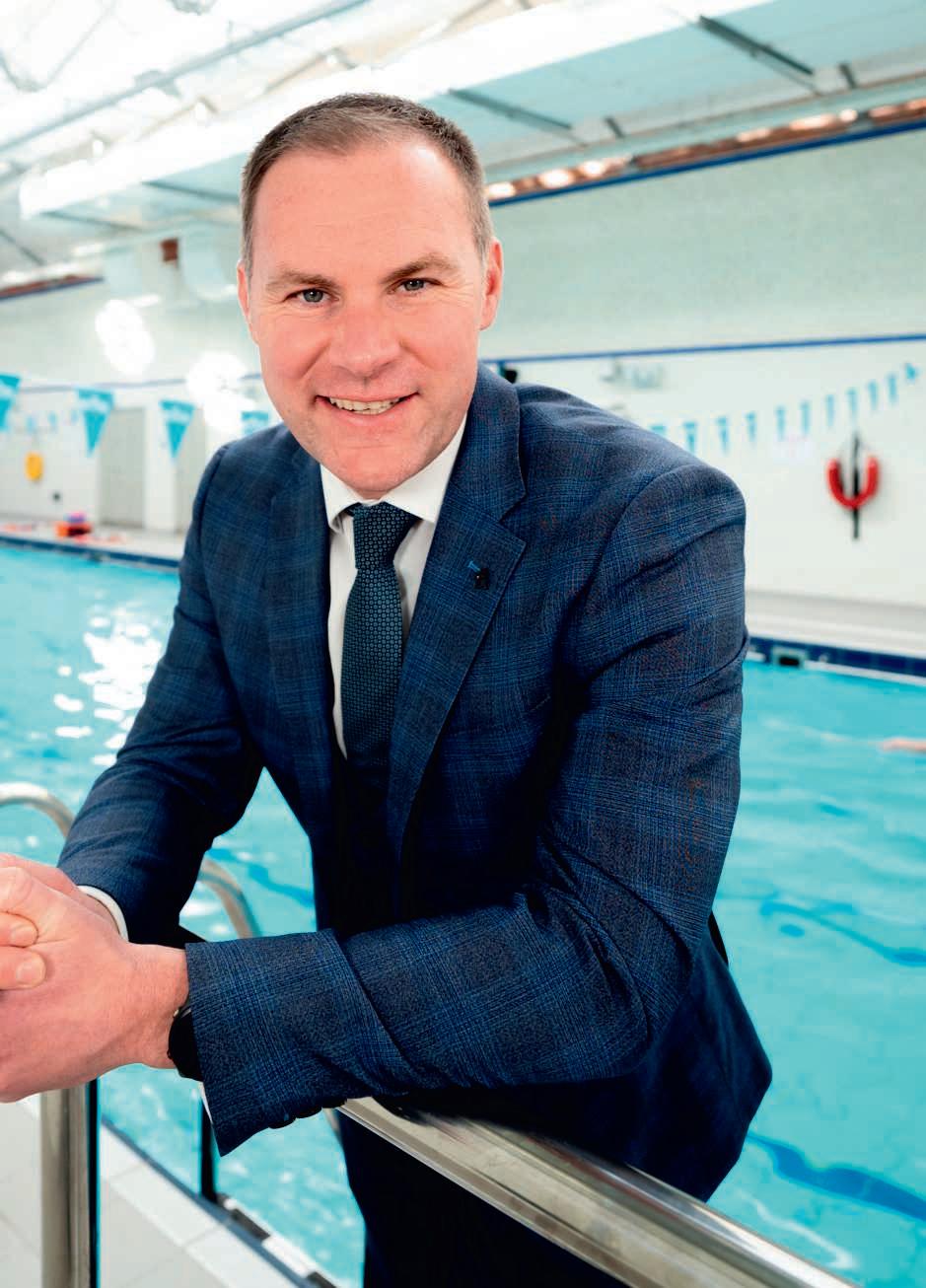
This year marks a milestone for GLL in Belfast - a full decade since it began operating the city’s 16 leisure centres under the Better brand. What began in 2015 as an ambitious partnership with Belfast City Council has since grown into a transformational force in the city’s health, wellbeing, and sporting landscape. Gareth Kirk, senior regional director at GLL, reflects proudly on GLL’s shared achievements, with a special spotlight on the people powering their work – including the dedicated sta behind the GLL Sport Foundation (GSF), which now supports more athletes in Belfast than any other city in the UK.
“From the outset, GLL’s mission has been clear: to improve access to affordable, high-quality leisure facilities for everyone in Belfast, and to foster a healthier, more active city. Thanks to our close collaboration with Belfast City Council and our social enterprise operating model, we’ve delivered significant investment into both infrastructure and communities. Over the past 10 years, Belfast has seen the revitalisation of leisure venues like Lisnasharragh, Andersonstown, Olympia, and Templemore Baths. These developments go far beyond buildings –they represent spaces where community spirit thrives, where fitness journeys begin, and where young athletes dream big.
At the heart of our work lies the GLL Sport Foundation – the UK’s largest independent athlete support programme. Launched in Belfast shortly after GLL took over operations, the Foundation has become a significant source of support for aspiring and elite athletes alike. Since 2015, over 1,200 athletes from or based in the city have received support totalling nearly £700,000. We marked a decade in Belfast in 2025 by taking in our largest GSF cohort yet; 158 athletes will benefit from support and investment – making Belfast the leading region of all 78 areas across the UK where GSF operates.
We’ve seen the results of this effort in the stories of athletes like Paralympic gold medallist Dr Michael McKillop, Irish international hockey legend Shirley McCay, and Olympian siblings Michaela and Aidan Walsh. Their achievements shine a light on what is possible with the right support, and they continue to inspire the next generation by acting as ambassadors and mentors within the GSF programme.
The numbers tell a story, but behind them are people – passionate, talented individuals working tirelessly behind the scenes to ensure our local athletes thrive.
None of this would be possible without the unwavering efforts of GLL’s Belfastbased team.
Jacqui Pope, our head of service in Belfast, has been instrumental in ensuring the smooth delivery of GSF support. Her leadership and connection to the local community ensure that athletes feel seen, heard, and supported – not only financially but emotionally and practically too. Having competed on the international stage in powerlifting, Jacqui is an award-winning leader in the sporting community. Jacqui’s team coordinates closely with schools, sports clubs, and the Mary Peters Trust to identify promising talent and guide them through the application and award process.
Jonathan Michael, regional business manager, and Dempsey Brown, community sports officer, also play vital roles on the ground. Their roots and relationships in Belfast have significantly contributed to making this city the programme’s flagship region. Jonny has been the driving force behind Futsal in Northern Ireland and Dempsey is a leading diver and coach. Both have transferred their passion for sport into supporting others across many disciplines. Their vision and focus ensure that every pound invested goes further, impacting real lives, and making every GSF athlete feel supported in more than monetary terms throughout.
Supporting our young stars is also a deeply collaborative effort. From leisure centre staff providing athletes with free access to state-of-the-art facilities, to administrators helping coordinate travel and equipment grants, every member of our team plays a role. The Foundation doesn’t just provide financial support – it removes barriers, unlocks potential, and creates opportunities.
The diversity of sporting disciplines supported by the GSF is also a point of pride. From weightlifting and badminton to football and BMX racing, Belfast athletes across 38 sports benefit from the programme. Nearly 60% of award
recipients are under the age of 21, with many still in their teens – a testament to the Foundation’s focus on nurturing talent early.
This decade of achievement was formally celebrated at a special event at Belfast City Hall, hosted by broadcaster Pete Snodden. It was a night of pride, emotion, and community, with appearances from then-Lord Mayor of Belfast Cllr Micky Murray and Belfast City Council Chief Executive John Walsh. We were also honoured to be joined by Lady Mary Peters, whose trust remains a key partner in the Foundation’s success.
John Walsh captured the essence of our work when he said: “We have invested £105 million in creating outstanding leisure facilities. I am delighted to celebrate 10 years of successful partnership with GLL, who have been a trusted partner in community health and wellbeing, and an organisation that shares our values.”
As we look forward to the next 10 years, our mission remains the same – to widen access to fitness, foster healthier communities, and support Belfast’s athletes as they chase their dreams. We know our work is never done, and that’s why GLL is committed to expanding the reach of the Sport Foundation and strengthening our community connections.
For aspiring athletes and everyone else in Belfast, the message is clear: GLL is here for you. Through our continued investment, dedicated staff, and passionate belief in your potential, we are building a future where no one is held back by circumstance.
And for our partners, supporters, and everyone who has been part of this 10-year journey – thank you. If you or your business would like to get involved in sponsoring GSF athletes in Belfast or learning more about the programme, please reach out to our team. Here’s to the next decade of making Belfast better, together.”
“We have invested £105 million in creating outstanding leisure facilities. I am delighted to celebrate 10 years of successful partnership with GLL, who have been a trusted partner in community health and wellbeing, and an organisation that shares our values.”

Ambition can mean di erent things at di erent stages. Early on, it might be about gaining experience and finding your place; later, it becomes more about creating something with purpose and longevity. For me, ambition has always been tied to building a business that delivers real value; to clients, to colleagues and to the wider community. That mindset has shaped my own career path, the evolution of Hub NI and how we approach the future of the contact centre industry.
My own journey began when I returned from university to join the family business, Message Pad, which later rebranded as MPL Contact. From the outset, we built a strong reputation for reliability and warmth, qualities synonymous with Northern Ireland’s service-led culture. We became a trusted name locally, working with a wide range of businesses in almost every industry sector who valued responsive communication and quality support.
In August last year, we took the next step in that journey by relaunching as Hub NI. This wasn’t just a change of name; it
marked a bold step forward – the same experienced team, the same location, but with enhanced technology, expanded services and a renewed ambition for growth.
Today, Hub NI supports a diverse client base ranging from SMEs to large organisations and public sector bodies across the UK, Ireland and beyond. We provide everything from overflow receptionist services, 24/7 helpdesk and escalation lines, lone worker monitoring, and customer service, sales and order lines. Our omni-channel capabilities now include voice, email, live chat, SMS, WhatsApp and AI integration. This enables us to support our clients’ customers wherever, whenever and however they want to.
I’ve always enjoyed working with businesses during times of change. Whether they’re scaling up, streamlining or adapting to new economic pressures. Right now, the most common challenge I hear from clients is the rising cost of staffing. Many are trying to balance high service expectations with tighter budgets. I take real satisfaction in sitting down with them, understanding their pressures and offering a solution that helps maintain service levels without the immediate need to hire more people. It’s not just about saving money; it’s about helping businesses remain agile, resilient and customer-focused, even in a challenging environment. Technology and pricing are only part of the story. We don’t believe in off-the-shelf solutions. Every engagement starts with a conversation. We sit down with our clients to understand where they’re struggling. Whether it’s a complete outsource, overflowing what would be missed calls, after-hours coverage or a surge in seasonal enquiries, we design bespoke solutions to fill those gaps.
This people-first ethos also guides how we approach technology. There’s no denying the contact centre industry is undergoing profound transformation. AI and automation are becoming core to service delivery. For many of our clients this is not suitable particularly for industries where human contact has long been central. For other clients and industries, we see these technical tools as enablers, not threats. By automating some of the more manual, repetitive or transactional tasks, we allow our people to focus on where they add real value: the complex, emotional or high-stakes conversations that demand empathy, judgement, experience and personality. This blended model of tech plus talent is the future of the industry, and we’re proud to be among the providers leading that change.
The vision for Hub NI is clear: to be a trusted, agile and ambitious partner to businesses navigating an increasingly complex communication landscape. Whether it’s helping a sole trader manage their daily calls or supporting a national helpdesk operation for a public sector body, we bring the same focus, professionalism and drive.
Personally, I’m incredibly excited about where we’re headed. The team’s depth of experience, our commitment to innovation and the trust we’ve earned in the market give me every confidence in our trajectory. At a time when many industries are grappling with change, we’re leaning into it, not just to survive, but to thrive. In our view, ambition is not just about getting bigger; it’s about getting better. Better at serving clients, better at supporting staff and better at adapting to the world around us. At Hub NI, we’re building a company that not only keeps pace with the industry’s evolution but helps to shape it, with integrity, innovation and Northern Irish resilience at its core.
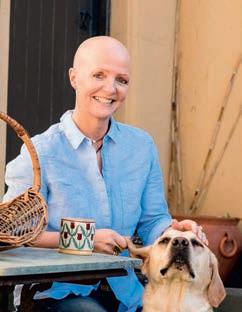
Jane Shaw Health Coach & Therapist
In today’s fast-paced business environment, innovation is a prized asset – and yet it is not just about ideas. Innovation is intimately linked with the wellbeing of individuals and teams. Increasingly, leaders are recognising that sustainable performance relies on more than just KPIs and output metrics; it depends on the human capacity to regulate stress, recover from setbacks, and maintain mental and emotional resilience. One of the most underused but powerful tools in this equation is creative practice.
From visual art and music to journalling and movement, engaging in creative activities is not simply a matter of self-expression or downtime. It is now understood, across neuroscience and psychology, to be a mechanism for enhancing emotional regulation, mental clarity, and even physiological resilience. For forward-thinking organisations, understanding this link is essential –not only for employee wellbeing but for fostering a more adaptive, highfunctioning culture.
At the neurological level, creative activities stimulate brain regions that support self-awareness, memory, emotional processing, and cognitive flexibility. Activities like drawing, writing,
or music-making activate what is known as the default mode network (DMN), which is associated with introspection, future planning, and personal meaning. This network allows individuals to process experience more deeply – key in an era where burnout and overwhelm are common.
Creativity also lights up the brain’s dopaminergic reward system, particularly the mesolimbic circuit. This is the same system responsible for motivation and positive reinforcement. When employees engage in creativity – either through formal programming or informal encouragement – there is a physiological release of pleasure and reward signals, which not only improve mood but enhance focus and motivation over time.
Moreover, creative engagement supports executive function by fostering prefrontal cortex regulation over emotional centres like the amygdala. This matters because under chronic stress, which can be a frequent condition in high-stakes industries, this regulatory balance often erodes. Creative tasks help restore it, improving decisionmaking and reducing reactivity.
The benefits of creative practice can also be seen through a polyvagal lens, the theory developed by Stephen Porges which gives us a blueprint for how human beings navigate stress and connection. For optimal health, performance, and creativity, we must spend most of our time in the ventral
vagal state, where we feel safe, connected, and mentally agile.
Creative practice can help activate this state. Whether it’s a group sketching session, a team drumming workshop, or even reflective writing exercises in leadership retreats, these structured creative activities encourage nervous system regulation. They create the kind of psychological safety that has been shown to be critical to high-performing teams.
In particular, non-verbal creative expression can be especially useful for diverse teams or during high-conflict periods, offering an outlet that bypasses intellectual defensiveness and opens new channels of understanding. Creating together, even in a light or playful way, can build trust faster than a dozen meetings.
Swiss psychologist Carl Jung considered creativity essential to psychological integration and personal growth. He believed that drawing, storytelling, and symbol-making were means of accessing deeper layers of the psyche. In the workplace, these insights can be surprisingly relevant.
Take the concept of individuation –Jung’s term for the process of becoming a whole and authentic self. In modern leadership language, this maps onto emotional intelligence, authenticity, and values-based leadership. Leaders
who engage with creative practices often report increased self-awareness and more nuanced perspectives on conflict and motivation. They are more resilient and less likely to lead reactively.
Jung also emphasised the power of symbols – images or expressions that encapsulate complex emotions or ideas.
In a business setting, encouraging symbolic expression, for example through vision boards, design thinking, or storytelling workshops, can help teams align on values and strategic vision in a more embodied, lasting way than slides or spreadsheets ever could.
The Business Case
Creative practice is not just a wellness initiative; it’s a strategic investment. Studies show that engaging employees
in creative activities improves morale, reduces burnout, increases productivity, and enhances problem-solving skills. A 2010 review in the American Journal of Public Health found that arts-based practices reduce stress, increase positive emotion, and even boost immune function – outcomes any HR department would welcome.
Moreover, creative practice supports cognitive diversity – the engine of innovation. When people are encouraged to think and express themselves differently, organisations benefit from broader perspectives, richer ideas, and more adaptive strategies.
Many forward-thinking companies already integrate creativity into their organisational DNA. Whether it’s through maker labs, creative sabbaticals, or
simply spaces that allow for unstructured exploration, these firms understand that creativity is not a luxury – it’s a core competency in the modern economy. Leading with Creativity
For businesses that want to thrive in complexity, foster wellbeing, and unlock human potential, creative practice offers a science-backed, psychologically rich pathway. It helps regulate the nervous system, deepen emotional intelligence, and cultivate a workplace culture of safety, innovation, and adaptability. Leaders don’t need to become artists. But they do need to recognise that creativity is not just an individual trait –it’s an organisational resource. When we make room for creativity, we make room for humans to flourish – and for business to do the same.
“When employees engage in creativity – either through formal programming or informal encouragement – there is a physiological release of pleasure and reward signals, which not only improve mood but enhance focus and motivation over time.”

REFLECTING ON THE SERIOUS AND SUSTAINED SKILLS SHORTAGE CURRENTLY IMPACTING THE CONSTRUCTION INDUSTRY ACROSS THE UK, JULIE MCKEOWN, HR DIRECTOR AT HENRY BROTHERS, SPOKE TO AMBITION ABOUT WHAT THE COMPANY IS DOING TO TACKLE THE ISSUE – AND HOW INTERVENTION FROM THE GOVERNMENT IS VITAL TO CREATE LONG-TERM SOLUTIONS THAT ALIGN EDUCATION AND TRAINING WITH THE REAL NEEDS OF THE SECTOR.
Driven by an ageing workforce, increased demand, and economic disruption, the construction industry is facing an acute and worsening crisis – a shortage of skilled workers required to deliver the growing number of building projects across the UK.
“Construction is a vital part of the UK economy,” says Julie McKeown, HR director at Magherafelt-based Henry Brothers, “yet attracting and retaining skilled workers has become one of our biggest challenges.”
Despite Henry Brothers’ longstanding reputation for being at the forefront of developing young talent – it offers a range of higher-level apprenticeships, ongoing training for employees, and partners with local schools to showcase the opportunities available in construction – the company continues to struggle with a shortage of skilled labour, particularly in key technical roles.
Of course, this is much more than a company issue; it reflects a wider industry crisis that requires coordinated action from government, educators, and industry leaders alike.
“A large portion of the workforce at all levels is reaching retirement age, and not enough young people are entering the industry to replace them,” Julie continues.
“We are doing everything we can internally, investing in training, offering higher-level apprenticeships, and working with local colleges and universities, but the scale of the problem is far greater than any one company can solve.”
Data from the Office for National Statistics shows that there are over 35,000 job vacancies in the construction sector in the UK and over half of the vacancies available can’t be filled – the highest rate of any sector.
“While there has been plenty of discussion around skills development in recent years, the reality is that progress has been slow and, in many ways, disconnected from the actual requirements of the industry,” Julie explains. “We need a coordinated, long-term approach to skills development across government, education, and industry, but there’s often a detachment between the education system and the realities of modern construction.
“We want schools, colleges, and universities to be in regular, meaningful conversations with businesses like ours. Too often, the curriculum doesn’t reflect the tools, technologies, or even the job roles that exist today.
“Without that alignment, students leave education unprepared for what we actually need on site or in our offices.”
The issue is further heightened in Northern Ireland, where businesses don’t see the same benefits from the Apprenticeship Levy – a tax on employers designed to ringfence funding for apprenticeships and skills development – as they don’t have the same guarantee that it will be reinvested where it’s needed most.
Employers still pay the levy, but they cannot access the service used in England to draw down funds and pay for apprenticeship training.
Julie continues: “It is difficult for employers in Northern Ireland to see a clear link with what they’re paying and how they benefit, leading many to feel discouraged from investing in apprenticeships.
“To a lot of businesses, it can seem like they are being penalised for growing their workforce without receiving proportional support for training and development.
“A reformed, regionally tailored approach would help tackle this issue, but it wouldn’t eradicate the immediate problem that the entire construction industry is facing.
“Collectively, we need to ensure that, from a young age, people understand that construction is a viable, skilled, and rewarding career path. That message needs to be heard in classrooms, in careers advice, and in the general narrative about this industry.
“To do that, we need collaboration. We need the education sector to actively engage with construction firms as a central part of shaping curriculum and careers planning. We need government to support and incentivise these partnerships, and we need the industry to be given a voice in shaping the future workforce.”
While bodies such as the Construction Employers Federation, Construction Industry Training Board NI, and Construction Futures NI are laying the groundwork in addressing the critical skills gap that exists, Julie believes that more can be done by policymakers.
“We urgently need policymakers to take this issue seriously with a real commitment to aligning education policy with the needs of UK industry.
“That means proper investment in skills programmes, targeted funding for construction-related education, and clear pathways into the trades and professions our economy so desperately needs.
“At Henry Brothers, we remain committed to doing everything we can to support skills development, from placement students to apprenticeships and providing employment for graduates with on-the-job upskilling and life-long learning, but without joined up thinking and bold action at a national level, we are fighting an uphill battle.
“The skills shortage is a national economic challenge. If we want to deliver the homes, schools, hospitals, and infrastructure this country needs, we must fix the pipeline of skilled workers. That starts with listening to industry, aligning education with demand, and ensuring the construction workforce of the future gets the support and recognition it deserves.”

“Collectively, we need to ensure that, from a young age, people understand that construction is a viable, skilled, and rewarding career path. That message needs to be heard in classrooms, in careers advice, and in the general narrative about this industry.”










Power NI has donated £1,000 to a rights-based charity that supports disadvantaged young people through recreational and physical activities.
Include Youth was established in 1979 to empower those aged between 16 and 21 who either risk coming to the attention of the local criminal justice system or are known to it.
The support from Power NI will go toward Include Youth’s Give and Take programme – an initiative designed to help care-experienced young people from across Northern Ireland.
It does this by offering education, employability skills and personal development support to those individuals over 16 who are not currently in education, employment or training.
The funding, in this case, will be used to provide a range of positive activities, including day trips, sports and art workshops, social events, visits to local attractions as well as one-to-one sessions
that will focus on physical, emotional, social and mental wellbeing.
Ashleigh O’Neill –the senior marketing and communications executive at Power NI – said: “We are proud to support Include Youth through our Brighter Communities initiative.
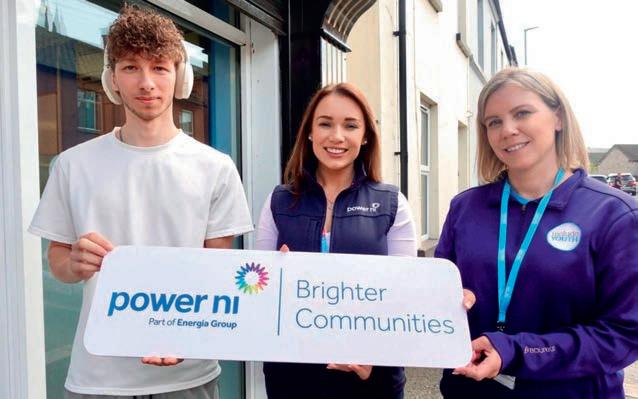
The Give and Take programme is a lifeline for many young people who need extra support, and we are delighted that our funding will help create fun – and meaningful – opportunities that support their wellbeing.”
Power NI’s Brighter Communities is a long-running programme designed to assist innovative and emerging community groups. Since the start of 2018, more than £95,000 in funding has been awarded to ensure the life-changing work of these organisations can continue.
By Ross Currie, Trade Finance Director, Ulster Bank
Effectively managing the trade cycle can often be a challenge for business owners. How do you pay regular suppliers or fund one-off contracts when your cash is tied up in stock or, as is often the case, you are waiting for payment from your customers?
Too often, problems with cash flow have held businesses back from achieving their growth ambitions, something Ulster Bank is keen to reverse with the launch of trade loan financing in Northern Ireland.
An additional stream of cash flow is an attractive offering to business owners and may even enable you to offer improved terms to your suppliers and customers, thus bringing benefits to each stage of the aforementioned trade cycle.
So, what exactly is an Ulster Bank trade loan? Firstly, it’s a tailored funding solution for any business with a turnover in advance of £2 million, designed to support business growth. To begin the application process, our team of experts will carefully assess your working capital needs before deciding which type of
trade loan is the most appropriate.
Some businesses will opt for a revolving facility to support with regular supplier payments, stock purchases or orders.
While others may benefit from a funding facility used to fund specific contracts. If approved, our teams will work closely with you to find a bespoke solution which aligns with your business goals and provide confidential financing that sits separately from any other debt you may have.
We will take the time to understand your trade cycle and identify opportunities where a trade loan could help. Often, this process discovers that a trade loan may be more cost effective and may generate higher amounts of working capital, compared with some other financing methods businesses may have traditionally relied on.
Already in Northern Ireland local businesses are being boosted by this funding solution. Recently Ulster Bank supported local company Maxflow with a trade loan finance package which

enabled the manufacturing firm to expand into new geographical markets.
Having a trade loan in place enabled Maxflow to seize this opportunity with the confidence that they were still in a strong position to manage cash flow effectively and maintain high stock levels across the board.
The company’s expansion showcases how effective strategic financial partnerships, infrastructure investments and a focus on customer-centric operations can all drive significant growth. Now, we want to see other businesses across Northern Ireland unlock this same level of growth and highlight what can be achieved when the right financial tools are put in place.
Introducing a simple funding solution tailored to your working capital needs could be the key to helping your business thrive. Contact your Ulster Bank Relationship Manager to find out more.
HMRC has reported Inheritance Tax (IHT) receipts of £7.6 billion between April 2024 to February 2025 – a striking £800 million increase compared to the same period last year.
This rise is partially attributed to inflation which in turn over the long run has pushed up asset valuations, including property values. In contrast, the thresholds at which IHT is chargeable at 0% are set to be fixed until at least 2030, meaning in real terms, the thresholds are having a diminishing impact over time.
Following the Autumn 2024 Budget, IHT receipts are projected to rise even more significantly in the future. Chancellor Rachel Reeves announced notable Inheritance Tax reforms, particularly for business owners, agricultural holders and those with pension assets. Key measures include, but are not limited to:
• Post April 2026, Business relief and Agricultural relief will be capped at £1m for an individual, with 50% relief thereafter i.e. IHT chargeable at 20% above £1 million
• Post April 2027, most unused pension benefits will be brought into scope for IHT purposes
Often, there is a common misconception that IHT only impacts super high net worth individuals. However, bearing in mind your home tends to be one of your largest assets, when coupled with the legislation changes mentioned above, more households are likely to exceed the frozen IHT thresholds in the future, potentially triggering a tax liability upon death.
Inheritance Tax is the tax levied on the value of an individual’s estate as at date of death. A UK domiciled individual’s estate will include all worldwide assets including cash, property, personal possession and investments minus any debt or liabilities. A notable exception is pension funds, which are excluded from the assessable estate and can be excluded from the calculation. However, as outlined earlier, this exemption will no longer apply from 6 April 2027.
IHT on death is charged at 40% but drops to 36% should 10% of the net estate be bequeathed to charity.
IHT is only chargeable on the value of the estate which exceeds unused tax-free thresholds (2025/26) as listed below:
• Each individual has a nil-rate band (NRB) of £325,000; and
• Each individual potentially has a residence nil-rate band (RNRB) of £175,000, subject to qualifying criteria*.
*Broadly speaking, the RNRB is available to individuals who leave their home to children or direct descendants, subject to the value of the property and subject to tapering should the assessable estate exceed £2,000,000.
Any transfers between spouses and civil partners are exempt from IHT. Furthermore, upon demise, the first spouse can pass on any unused NRB or RNRB to the surviving spouse, meaning an effective IHT threshold of up to £1,000,000 for a married couple.
Other intricacies include assets that qualify for business or agricultural reliefs,

which remain uncapped at present. However, as outlined earlier, these reliefs will be halved from 40% to 20% on assets above £1 million per individual from 6 April 2026.
At Davy, we can work with you to help you better understand your estate’s exposure to IHT.
It will be the executors of your estate that will be tasked with paying any IHT due to HMRC by the end of the sixth month after the person died before distributing your residual estate to your beneficiaries. This effectively means that any Inheritance Tax payable will be taken from the inheritance of your loved ones or beneficiaries.
Should you die intestate (with no will in place) this can complicate matters, as under intestacy rules not all assets will necessarily be transferred to a surviving spouse. Dying intestate can trigger an IHT liability on first death and furthermore use up valuable nil-rate band allowances of the first spouse.
It may be the case that you are not concerned with any potential IHT liability that may arise on your demise. Your philosophy may be laissez-faire; not my problem, let my beneficiaries deal with it!
You could also elevate your lifestyle with travel and experiences while gradually reducing your assessable estate over time. However, any capital assets purchased will still remain subject to IHT.
Alternatively, you may wish to consider the following options which can help achieve your Inheritance Tax planning

goals either by mitigating or planning for the liability:
• Gifting directly (losing control/ access) or gifting into a suitable trust (retaining control and/or access) – This will reduce the value of your estate on survival of seven years.
• Life insurance policy – Paying premiums now to meet the expected Inheritance Tax bill.
• IHT solutions – Investing in higher risk, specialist assets that may qualify for IHT exemption after two years.
It should be noted that individuals will have different circumstances and objectives and the “one shoe fits all” approach is not appropriate when considering the above strategies.
IHT can potentially be mitigated, or the liability provided for through careful estate planning unlike other personal taxes including Income Tax or National Insurance. However, with the changes in the 2024 Budget, the path to mitigation is becoming more complex and nuanced.

Craig Fitzpatrick, Forensics Partner at PwC UK
As anticipation builds for The Open in Northern Ireland this summer, the event promises not just a display of golfing prowess but also a lucrative stage for strategic media partnerships and branding opportunities. The tournament opens doors for golfers to leverage their success beyond the greens, transforming them into ambassadors for businesses, products or services.
In my role at PwC, I focus on ensuring sports brands align with the best partners and sponsors. Initially, my career in traditional forensic corporate intelligence gradually expanded as the market embraced the need for clarity, while also welcoming partnership opportunities in less traditional and higher risk sectors. This evolution has highlighted the strategic importance of aligning brand values, especially in the dynamic post-pandemic landscape.
Optimism has resurfaced within the sports industry, signalling a new era of potential and growth. Findings from PwC’s Global Sports Survey underscore a future of increased institutional investment, creating fertile ground for innovative collaborations. For golfers, this renewed energy translates into opportunities to forge influential brand and media partnerships.
Spectators often recognise the myriad of brands linked to their favourite athletes, whether golfers or football teams. From sportswear to luxury watches and beverages, aligning these brand partnerships with core values is paramount for both media appeal and integrity. Golfers now find themselves at
a pivotal moment, attracting attention from media giants keen to associate with their sporting achievements.
However, at The Open, the stakes transcend athletic accomplishment. Brand integrity is equally crucial, as immature companies might view partnering with high-profile golfers to boost their credibility. This juncture demands vigilance – complex ownership structures and higher risk business practices in less well known industries can expose brands to risks and tarnish their reputation.
Thus, the key to success posttournament lies in diligent vetting processes. This entails identifying potential partner risks early and ensuring alignment with established values. A proactive approach to partnership monitoring is vital to mitigate such risks effectively. Here, technology plays an indispensable role, offering real-time risk intelligence that captures nuances missed by traditional methods.
For golfers gearing up for any major tournament, a strategic approach to media partnerships is essential. Comprehensive evaluations of potential partners are crucial to determine value alignment. Strategies must be robust to maintain brand integrity across collaborations. Cutting-edge technology can empower golfers and sports teams more generally to identify and manage risks promptly. Regularly refreshing partnership risk profiles is vital to ensure alignment with the brand’s core values, safeguarding reputations while maximising media partnership potentials.
Success in sport is more than just a chance to make history; it is an entryway to profound branding opportunities. By engaging with media partnerships thoughtfully and strategically, golfers can cement their legacy while bridging the worlds of sport and business. In doing so, they ensure their triumphs resonate long after the final putt has been sunk.
“Optimism has resurfaced within the sports industry, signalling a new era of potential and growth. Findings from PwC’s Global Sports Survey underscore a future of increased institutional investment, creating fertile ground for innovative collaborations.”

MC DONALD
CEO, IntrinsicAI

GEORGIA MCKNIGHT
Group Marketing Manager, RTU

Associate Director, Tax Team, HNH

Senior Client Success Manager, Beyond Business Travel

MALLON Head of Corporate Affairs, SONI

Marketing and Communications Manager, Triterra

Head of Marketing, MAC

Commercial Lead, Sans Souci Consulting


Cleaver Fulton Rankin has welcomed three new appointments to its legal and business services teams.
The firm’s most recent recruits include Senior Solicitor Clodagh Rafferty, who joins the Private Client team and Niamh O’Connor, who joins the Marketing Department.
The new appointments also include newlyqualified Solicitor Kaitlyn Berryman, who recently completed the firm’s two-year Trainee Solicitor Programme, graduating from the Institute of Professional Legal Studies at Queen’s University Belfast. Kaitlyn has been appointed to the Dispute Resolution team.
Tourism Northern Ireland has announced the appointment of a new Chief Executive.
Laura McCorry MBE will take on the new role in September. Currently the Head of Hillsborough Castle, Mrs McCorry has held a variety of strategic leadership roles both locally and internationally. These include Public Engagement Director at National Museums Northern Ireland and Director of Product Development at Tourism NI. She is also a member of the Tourism Partnership Board as well as a Board member of Tourism Ireland. Speaking about her new role, Laura said: “I am delighted to have been appointed as Tourism NI’s new Chief Executive.
“Tourism NI is a fantastic organisation with a passionate team and I’m excited to work together to grow the tourism economy in a way that benefits communities, businesses and visitors alike.”

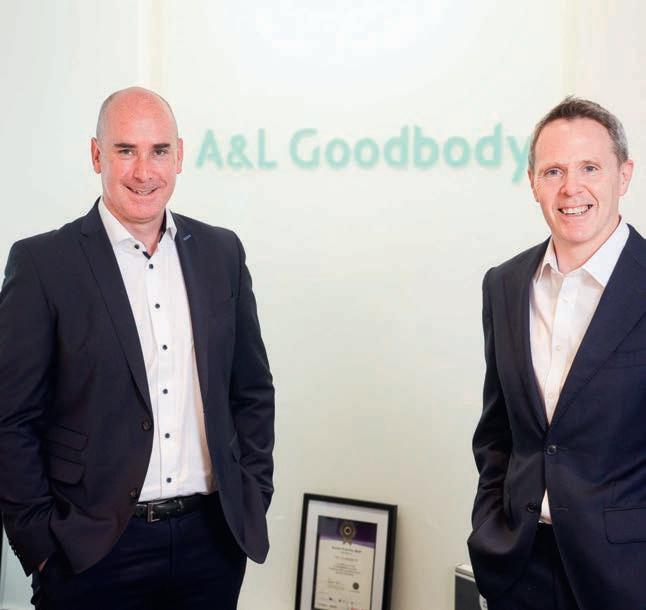
Kevin Murphy has been appointed as a new Partner and Head of Department in A&L Goodbody’s Real Estate team in Belfast. Kevin brings over 18 years of experience advising on all aspects of commercial property, with particular expertise in land acquisition and disposals particularly in renewable energy developments, as well as a focus on investment and development property. His appointment takes ALG’s partner team in Northern Ireland to 21, charged with leading a team of over 130 lawyers and business support professionals in its Belfast office.
Congratulating Kevin on his appointment, Michael Neill, Head of Office in Belfast, commented:
“We’re thrilled to have Kevin return to ALG to join the partnership. His deep sector knowledge and commercial approach are a great fit for our team and our clients. Kevin’s expertise, particularly in renewable energy, adds real strength to our growing Real Estate offering and reflects both the continued growth of our Real Estate practice and our commitment to supporting clients in this evolving sector”.
“Kevin’s appointment comes at a time of significant activity for our Real Estate team, with a number of high-profile transactions currently underway, including acting for NewRiver on the largest commercial property deal in Northern Ireland this year, with the recent £58.8m sale of the Abbey Centre to a local private investor.”

Chris Hylands Director, Deal Advisory, HNH Partners
There is no greater professional satisfaction than helping a local business reach its potential. For me, it’s never just about maximising value at exit; it’s about helping business owners scale with confidence.
Northern Ireland is home to a wealth of entrepreneurial talent with strong credentials in sectors including technology, advanced manufacturing, professional services and healthcare. We regularly see founders and management teams building globally relevant businesses – often with limited external capital and tough conditions.
And yet, historically, ambition has sometimes been tempered by modesty. For too long, success was seen as building a business and exiting with enough to buy the dream home and a holiday house. That’s a valid aspiration – but increasingly, we are working with clients who want more than that. They want to build lasting, scalable enterprises that create value over the long term. That’s the journey I get most excited about.
Since joining HNH at the end of 2018, I’ve advised on a wide range of transactions across a range of sectors including managed services and IT to facilities management, engineering and financial planning. As a firm, HNH is proudly sector-agnostic, but our track record has naturally concentrated in areas where we’ve delivered repeated success. That in turn creates a flywheel of new opportunity.
I didn’t plan to go into corporate finance. I studied law intending to pursue a legal career. But as training contracts became more competitive, I opted to strengthen my financial
credentials, joining a conversion programme at Ulster University towards chartered accountancy.
That decision ultimately led to me being offered a role at a Big Four firm, followed by time in their corporate restructuring practice post qualification. It was there, supporting businesses under pressure, that my conviction grew – I wanted to be on the front foot, advising companies through growth and change, not just recovery.
At that time, Brexit uncertainty still affected deal flow and then came the pandemic in 2020. Since this time, we have seen interest rates rise and significant geopolitical volatility. Northern Ireland proved resilient, navigating challenge after challenge.
What’s changed most in recent years is not just the volume of transactions, but the scale, complexity and profile of them. We’ve seen a notable rise in private equity participation in Northern Ireland. Investors now recognise the region’s potential.
According to Experian’s UK & Ireland M&A Review, Northern Ireland recorded 346 transactions in 2024, up 44% on the previous year – a striking figure against a more subdued national backdrop. Private equity was a driving force in that activity, introducing new structures and expectations, and a focus on scalable value.
Northern Ireland remains a place defined by hard work, pragmatism and entrepreneurial grit. The majority of our companies are still owner-managed, often family-run, and that brings a strong sense of responsibility – to people, place and legacy.
But what’s encouraging is the increasing sophistication among business leaders. We’re seeing second and third-generation owners upskilling to scale internationally, and founders embracing digital transformation and ESG to drive sustainable growth.
We’ve also seen local success stories that prove what’s possible. Take Kingsbridge, for example – a Northern Ireland-based healthcare provider that scaled significantly with backing from local private equity and ultimately exited in a landmark transaction for the region. That deal didn’t just generate a return; it shifted the narrative about what’s achievable here.
At HNH, we’re proud to have played a role in many of the region’s most transformative transactions. 2024 was a record year for us, with both our Belfast and Edinburgh offices ranked in the top ten most active advisors in the UK by Experian. And 2025 has continued in that vein, though deals take longer founders navigate factors such as national insurance reform and continued geopolitical uncertainty.
What matters most, though, is ambition. That’s what inspires me. I want to work with clients who are thinking not only about a transaction, but about a broader strategic vision – a story of growth, resilience and legacy. I want to help shape the next chapter for Northern Ireland’s private sector.
We have talent, innovation and resilience. Now it’s time to back ourselves – and deliver on the potential that’s always been here.















Nissan rediscovers its pioneering mojo with new Leaf, writes James Stinson.
omeone in Nissan dropped the ball around the middle of the last decade.
The Japanese brand was an electric car pioneer with the launch of the Nissan Leaf in 2010. It was given a refresh in 2017 but sales have disappointed in recent years. Chinese car makers and others like Kia now occupy the space once filled by the Leaf. In truth, Nissan was slow to recognise changing tastes…
Many pioneering electric cars, like the Leaf, were functional and a bit frumpy but buyers now expect their electric cars to look good too. Witness the dazzling new Renault 5.
So, this new third generation Nissan Leaf couldn’t be more timely. The Leaf now sits on the same platform as the larger Ariya EV and has a strong family resemblance to that model: it’s determinedly less frumpy than the Leafs of old.
With a drag coefficient of just 0.25, its sleek design optimises airflow to enhance both performance and range. Flush door handles, a flowing roofline, full under floor cover, and sculpted surfaces create a modern profile, while its signature front and rear lighting delivers a distinct, high-tech identity on the road.
“For the all-new LEAF, we’ve introduced a refined new expression of electric design – confident and modern, with unmistakable Nissan DNA,” said Giovanny Arroba, vice president, Nissan Design Europe. “Its aerodynamic silhouette, distinctive lighting signature, and carefully crafted interior details reflect a deep understanding of what modern European EV drivers value – not just in function, but also in form and feeling.”
Two battery options will be offered, with usable capacities of 52kWh and 75kWh, giving the car an official range of 271 or 375 miles.

But Nissan emphasises its efficiency at motorway speed, claiming it can cover more than 200 miles at an 80mph cruise. When you do reach your destination, it will charge at up to 150kW, recovering up to 260 miles of charge in just 30 minutes.
Mechanically, the Leaf has a new ‘three-in-one’ electric motor (meaning it combines the inverter, motor and reducer into a single package) that sends up to 214bhp and 261lb ft of torque to the front wheels. There’s MacPherson-strut suspension up front and a multilink arrangement at the rear, while wheel sizes range from 18 inch to 19 inch.
Despite the Leaf’s new fastback bodystyle, Nissan claims it has plenty of rear head room, while the boot capacity is put at 437 litres.
The interior has also been completely reinvented, with the dashboard built around a pair of 14.3-inch screens running a Googlebased infotainment system.
As you’d expect, the new Leaf comes with a comprehensive suite of driver aids including: ProPILOT Assist with Navi-link, which adapts to curves and changing speed limits for effortless highway driving; e-Pedal Step and adjustable regenerative braking that delivers onepedal driving in urban settings; 3D 8-point Around View Monitor and real-time road visualisation, which helps manage tight manoeuvres. Standard safety includes Intelligent Cruise Control, Lane Keep Assist, and Driver Monitor System.
Vehicle-to-Load (V2L) functionality enables external device charging directly from the car, powering a variety of small to mediumsized devices – such as kettles, portable lights, or electric grills – when camping or exploring the great outdoors.
Built at Nissan’s Sunderland plant, there’s a lot riding on this new Leaf. The marque has been in the wars recently after a recent failed merger with Honda. Still, it has a lot going for it… including experience gained from having sold more than 700,000 mark 1 and mark 2 Leafs.
Launch details suggest it could be a contender yet again in the EV space when the mark 3 Leaf goes on sale early next year.









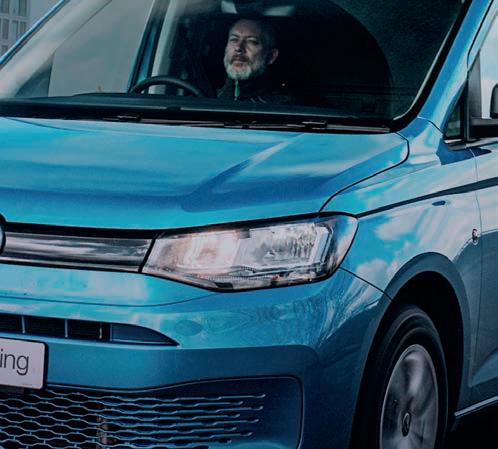




Kia has announced UK pricing and specifications for the new EV6 GT, the fastest accelerating car Kia has ever produced and a reimagination of the brand’s first dedicated high-performance EV model.
A significant mid-life upgrade makes the new model more dynamic, more refined, and more ‘GT’ than before, with a greater breadth of abilities and improved driver engagement.
As well as integrating several new technologies and upgrades over its predecessor; the new EV6 GT also benefits from the wealth of

design and interior updates seen most recently across the wider EV6 line-up.
Starting at £59,985 (a £2,690 reduction in its on-the-road price), the new EV6 GT brings with it more power, more kit, and improved driving dynamics, at a more affordable price point.
The revised model features a refreshed exterior design, with
The Golf GTI is one of the most successful compact sports cars in the world with more than 2.5 million sold to date.
In time for its 50th birthday next year, Volkswagen is launching a special model with a focus on driving pleasure in the form of the Golf GTI EDITION 50.
“For 50 years, the GTI has stood for more than just performance, precision, and driving pleasure at Volkswagen: it is a way of life that unites our fans all over the world – and an essential element of what makes us so strong as a brand,” said Thomas Schäfer, CEO of the Volkswagen brand.
“With the fastest and most powerful production model to date, we are celebrating half a century of GTI passion.”
Volkswagen is equipping the special model with a 2.0-litre turbocharged engine – a modification of the drive unit from the Golf GTI Clubsport with 296 bhp.
Thanks to internal engine measures, the Volkswagen engine team
a striking new light signature and dynamic aesthetic, improved battery performance and driving dynamics, and a broader range of convenience features. Powered by a new 84kWh battery pack (8.5% bigger than the previous generation EV6 GT battery), it boasts a range of up to 279 miles on a charge based on the WLTP ‘combined’ standard.
Flexing its muscles as a performance-oriented grand tourer, the EV6 GT adopts wide-ranging powertrain improvements over its predecessor. Powered by an all-wheel drive, dual-motor drivetrain, the GT is now capable of producing up to 641bhp and 770Nm of torque – an increase of 64bhp (+11%) and 30Nm (+4%) over its predecessor. This allows the GT to complete the 0-62mph sprint in just 3.5 seconds, on to a top speed of 161mph. Along with conspicuous neon green brake callipers front and rear, neon green piping throughout the interior, and a neon green ‘GT’ button on the steering wheel, the new model boasts various premium and performance-focused improvements.
A first for Kia, the EV6 GT now features Virtual Gear Shift technology, simulating a six-speed paddle-operated transmission. When activated, this provides drivers with new visual, audible, and tactile cues to make the car more engaging and enjoyable to drive, and its performance capabilities more approachable.
The upgraded model also features an enhanced ‘GT Mode’, a dedicated drive mode activated using the neon green button on the steering wheel. This sharpens up steering responses and unleashes the full, untapped potential of the EV6, with maximum power and torque at the driver’s disposal. GT Mode also changes the theme of the 12.3-inch driver display screen, with exclusive neon green details and a new font for the speed and range readouts.
The EV6, first launched in 2021, was the first Kia EV built on the brand’s industry-changing E-GMP (Electric-Global Modular Platform), which allowed for 800-volt ultra-rapid charging capability. At a 350kW charging station, the new EV6 GT will be able to top up from 10 to 80% in just 18 minutes.
The EV6 GT is also covered by Kia’s seven-year/100,000-mile warranty, with battery pack and motors covered for eight years.




has succeeded in increasing the output of the Golf GTI EDITION 50 to 321 bhp – compared with the classic Golf GTI in the basic configuration with 261 bhp. Maximum torque of the EDITION 50 has been increased to 420 Nm.
The chassis of the Golf GTI EDITION 50 has been further refined and adapted to the higher power. A MacPherson front axle and a four-link rear axle form the basic layout. Overall, the anniversary model is 15 mm lower than the basic configuration.
For those who like it even sportier, Volkswagen will offer the optional GTI Performance package with Performance chassis exclusively for the Golf GTI EDITION 50. Due to higher spring rates, the natural frequency at the front and rear axles has been increased by around 20%. This results in better support characteristics, a much more direct response, and a lower tendency to roll and pitch. With further lowering by 5 mm, the Golf GTI EDITION 50 is 20 mm lower than the standard Golf.
And to prove these tweaks work, professional racing driver Benjamin Leuchter recently rounded the 21km-long Nürburgring Nordschleife circuit in 7:46 minutes – the fastest lap ever completed in a production Golf on the circuit known as the ‘Green Hell’.
Production is expected to begin later this year, with first deliveries expected in early 2026. No pricing details yet but expect to pay around £45,000 and more to get your hands on this latest and perhaps last chapter in VW motoring history. With the rise of EVs, the days of petrol-powered hot hatches are surely numbered.
“With the fastest and most powerful production model to date, we are celebrating half a century of GTI passion.”
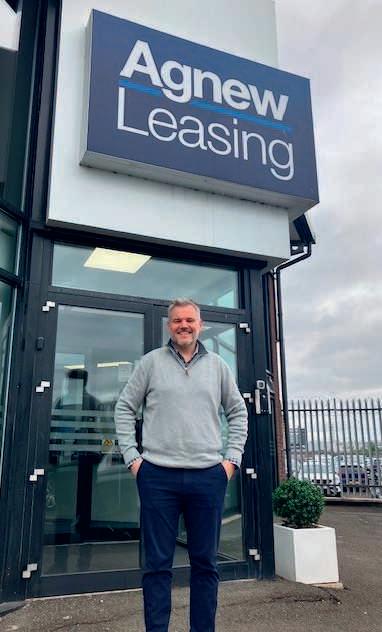
Volkswagen is equipping the special model with a 2.0-litre turbocharged engine – a modification of the drive unit from the Golf GTI Clubsport with 296 bhp.
Thanks to internal engine measures, the Volkswagen engine team has succeeded in increasing the output of the Golf GTI EDITION 50 to 321 bhp – compared with the classic Golf GTI in the basic configuration with 261 bhp. Maximum torque of the EDITION 50 has been increased to 420 Nm.
The chassis of the Golf GTI EDITION 50 has been further refined and adapted to the higher power. A MacPherson front axle and a four-link rear axle form the basic layout. Overall, the anniversary model is 15 mm lower than the basic configuration.
For those who like it even sportier, Volkswagen will offer the optional GTI Performance package with Performance chassis exclusively for the Golf GTI EDITION 50. Due to higher spring rates, the natural frequency at the front and rear axles has been increased by around 20%. This results in better support characteristics, a much more direct response, and a lower tendency to roll and pitch. With further lowering by 5 mm, the Golf GTI EDITION 50 is 20 mm lower than the standard Golf.
And to prove these tweaks work, professional racing driver Benjamin Leuchter recently rounded the 21km-long Nürburgring Nordschleife circuit in 7:46 minutes – the fastest lap ever completed in a production Golf on the circuit known as the ‘Green Hell’.
Production is expected to begin later this year, with first deliveries expected in early 2026. No pricing details yet but expect to pay around £45,000 and more to get your hands on this latest and perhaps last chapter in VW motoring history. With the rise of EVs, the days of petrol-powered hot hatches are surely numbered.
We at Agnew Leasing are incredibly proud of the work our maintenance team do to keep our customers motoring across the UK. At Agnew Leasing, our support doesn’t stop at delivery; it continues throughout the life of your lease.
Whether you’re leasing a single car or managing a complex fleet, we make motoring simple, seamless, and stress-free.
What we provide:
• Servicing & Maintenance
• All servicing covered throughout your contract
• Tyre replacement & repair with nationwide coverage
• 24/7 Breakdown & Recovery Support
• A member of staff will be on hand 24 hours a day to assist you if your vehicle breaks down or has an accident. Our main priority is getting you back on the road
• Downtime Management
• Our team track the progress of your vehicle whilst off the road to get you moving again quickly. We keep in contact to update you during this time
• Fine Management
• All fines handled on your behalf with a bespoke approach
• Comprehensive Fleet Management Reporting & Oversight
• Our in-house system, Agnew Fleet Manager, gives you a full overview of your fleet including driver allocations, end dates and costs
• Expert advice whenever you need it
• You will have access to a dedicated account manager for any day-to-day queries. We review your fleet with you regularly to ensure you have access to the most up to date industry information.
All of this is underlined by the exceptional customer service provided by our team. We help businesses to operate their fleets efficiently, cost-effectively, and with minimal hassle so you can get on with your own business.
Dominic Felloni swapped selling custom carpets to cruise ships for a rowing machine as part of a marathon charity challenge.
The marine sales manager at Ulster Carpets took 3 hours and 26 minutes to row the equivalent of a marathon –42,195m – at Pure Gym Laganbank in Lisburn in aid of the Daniel Spargo-Mabbs (DSM) Foundation.

More importantly, he has raised over £1,800 for the drug education charity that has partnered with Ulster Carpets HR Business Partner, Sandra Larmour, to come to Northern Ireland to raise awareness among young people through Mark Wheeller’s powerful verbatim play, ‘I Love You, Mum – I Promise I Won’t Die’. “I hit the wall about 2 hours in but managed to battle through,” explained Dominic. “I received fantastic support from those in the gym, with people I’d never met before encouraging me along the way.”
The biggest challenge Dominic faced was a numb posterior, both during the row and for a few days afterwards.
“But it was all for a worthwhile cause,” he said. “I was lucky enough to see the play and that helped keep me focused. Drug education is so important for young people and this is a powerful way to get the message across.”
Sandra explained, “Following the death of my daughter Jeni during her first night of university I have launched this initiative
by partnering with DSM Foundation to bring much needed drug education to the young people of Northern Ireland. The response from schools and youth organisations has been overwhelmingly positive.
“The play ‘I Love You, Mum – I Promise I Won’t Die’ is highly emotive, using dramatics and music and most certainly grabs the young person’s attention while delivering a powerful message around planning and making safe choices. I am very grateful that Dominic chose to support this initiative. What a challenge he set himself, which I must say he smashed! Thank you, Dominic and all
those who contributed to a fantastic amount raised.”
All the money raised will be put towards the invaluable work done in Northern Ireland by DSM Foundation. It will also directly support vital initiatives such as school plays, workshops, and other educational programmes designed to inform and protect young people by giving them the tools to make safer choices. Plans are in place for DSM to also become an NI registered charity.
You can still donate to Dominic’s Marathon Row at https://fundraising. dsmfoundation.org.uk/fundraising/ dominicsmarathonrow

A new report from The Open University reveals a disconnect between Northern Ireland’s employers and the next generation of workers – a gap that could be holding back efforts to address the region’s persistent skills shortages.
The ‘Business Barometer 2025: Skills for today and tomorrow: how employers can plan for future skills’, based on a survey of over 2,000 UK business leaders and 1,000 Gen Z adults shows that:
• 48% of organisations in Northern Ireland are currently experiencing a skills shortage.
• Yet only 23% have initiatives in place to recruit, retain or train under-25s.
Michael Bower, Assistant Director (Student Success & External Engagement) at The Open University in Ireland said: “There’s a clear mismatch between employer intentions and practical action. By developing structured workforce plans, partnering with education providers and investing in flexible training, employers can unlock diverse talent and future-proof their workforce.”
For the first time, the Business Barometer also surveyed 18-24-year-olds – with encouraging results.
• 62% are actively considering careers in sectors with the greatest skills needs.
• 65% say they’ve never been told they lack specific skills –despite 39% of employers citing “work readiness” as a key barrier to hiring.



Employers also report reluctance to train younger staff due to concerns about retention – yet 79% of 18-24s in Northern Ireland say they would stay longer with an employer that invests in their development.
The message is clear – young people are eager to contribute –but need clear, supported pathways in.
To explore the full findings, download the Business Barometer report at: https://business.open.ac.uk/business-barometer
Joulen, a dynamic and fast-growing innovator in energy optimisation services, has entered a strategic partnership with Nimbus to enhance its cybersecurity posture and support its ambitious growth journey with strategic technology support and planning.
As Joulen expands its operations and forges new partnerships, the need for robust, demonstrable cybersecurity has become mission critical. “In today’s digital-first world, cybersecurity isn’t just a checkbox, it’s a competitive advantage,” said Jamie Rea, Business Operations Director at Joulen. “Nimbus gives us the confidence and capability to meet the highest standards our clients expect.”
Nimbus, a leading provider of Managed IT and Cybersecurity Services, brings deep expertise in cybersecurity strategies and aligning with UK government frameworks such as Cyber Essentials. Their approach ensures Joulen’s systems are not only secure and compliant, but also agile enough to support innovation and growth. For Nimbus, the partnership reflects its continued commitment to empowering high-growth organisations with secure, scalable IT foundations.
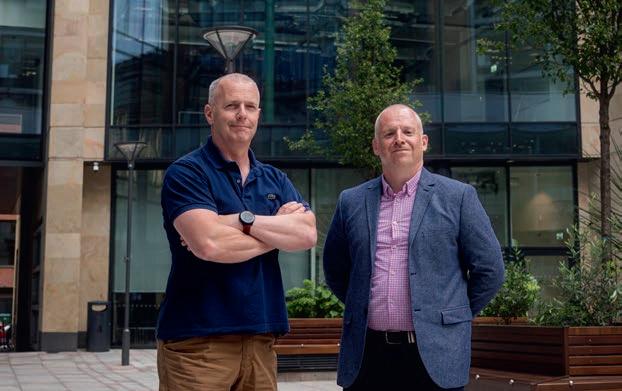
“We’re excited to partner with Joulen, a truly innovative local business. Our goal with all our clients is to provide the support, security, and guidance that turns technology into a driver of growth, not just a cost centre. We look forward to supporting Joulen’s continued success”, said Paul Mcshane Head of Growth and Development at Nimbus.

Ulster Tatler’s Fashion & Beauty Editor, Joanne Harkness, looks at the best summer fabric – linen!

Bria Lightweight Linen Jumpsuit, £132, Busby & Fox.







Andrew Turner Executive Head Chef

1. Preheat the oven to 200°C.
Ingredients : 6-700g halibut fillet or any meaty fish you prefer, cut in to 4 portions, 30g Sea purslane, 12 leaves Sea beet, 40g Samphire, 10 g chervil, 10g chives.
Ingredients: 600g Cumber earlies, 150g Salted butter 100g crème fresh, 20 ml white wine vinegar, Salt and pepper.
Method: Wash the potatoes, and boil in salted water until soft (approx. 15 mins), drain and break them with the back of a fork, add the salted butter, cream and vinegar, mix together until you have a soft crushed potato and season to taste, keep warm.
Ingredients: 150g Brown shrimp, 120g salted butter, Lemon cut into segment and juice, Parsley.
Ingredients: 200 ml distilled white vinegar, 50g sugar, 10g salt, 1 small bag dulse.
Method: Bring the vinegar, salt and sugar up to the boil, allow to cool and drop in the dulse allow to sit for 1 hour before using.


2. Heat a non-stick pan until smoking. Season the fish, add a splash of oil to the pan and place the fish in. Cook for one minute on each side to get a nice colour.
3. Transfer the fish to the oven and roast for approximately 4 minutes.
4. Once out of the oven, move the fish to a warm tray.


5. In a separate pan, add the salted butter and let it cook until golden brown. Add the shrimp, parsley, and lemon, then remove from the heat.
6. To plate up, place the warm crushed potatoes in the centre of the plate, gently lay the fish on top, spoon over the shrimp butter, and finish with sea herbs and pickled dulse.







John Campbell BBC NI’s Economic & Business Editor
The Labour government has ended its first year in office in something approaching disarray.
The plan to cut some disability benefits to help the Chancellor meet her self-imposed borrowing and taxation rules did not survive contact with Labour MPs.
The economic credibility of the Chancellor and the Prime Minister has been badly weakened as a result. More tax rises may be in the post.
However, that first year in office has also involved substantial progress towards the manifesto promise that mattered most to many Northern Ireland businesses: a new agrifood deal with the EU.
This deal should substantially reduce the impact of the post-Brexit Irish Sea border.
But things could actually get worse before they get better and the deal itself will not solve all the problems that businesses are experiencing.
The Labour manifesto commitment was to seek an agreement with the EU which would “eliminate most border checks created by the Tory Brexit deal”.
The manifesto did not spell out that the only practical way to achieve this was for the UK as a whole to realign with EU agrifood regulations.
Even in the weeks leading up to the deal in the middle of May ministers did not make explicit what was on the table, perhaps reflecting nervousness about being cast as “Brexit betrayers”.
In the event the deal was largely met with a shrug. Most of the media attention was focused on whether and when UK passport holders could start using e-gates at EU airports.
This reaction probably reflects how much of the political heat has gone out of the Brexit issue even as
businesses continue to grapple with the consequences.
The deal itself is at the heads of terms or “agreement to agree” stage. Negotiations are continuing to produce a legal text with hopes that can be done by the end of the year. There will also have to be an implementation plan. It is not yet clear if this will be a “big bang” with all the relevant sea border restrictions swept away in one go or whether they all be phased out over a period of months.
Whatever the timetable it will mean food and plants being shipped from GB to Northern Ireland will no longer need the regulatory paperwork and checks which have been in place since 2021.
The “Not for EU” labelling introduced in 2023 will be dropped.
The new Border Control Posts at our ports will largely be rendered redundant and the officials working there can be redeployed.
All this is good news for retailers, processors and producers.
The bad news is the government has agreed with the EU to continue to tighten existing rules while the new deal is finalised.
This is starkly illustrated by “Not for EU” labelling. It was extended to a broader range of products at the start of July, completing its rollout which started in 2023.
It may have seemed logical for the UK government to say: “Hold on, these labels could be entirely pointless within a matter of months; let’s agree to pause implementation in the meantime.”
The EU is following a different logic. It wants to see evidence that the UK can be trusted to implement existing deals. This means that NI businesses are, for now, carrying the burden of the broader UK-EU reset.
It is also important to realise that even when the reset is finalised it will still leave substantial issues for businesses navigating the sea border. The deal covers one broad area of regulation and does not touch on customs bureaucracy.
This became apparent to me in the run-up to and aftermath of the deal as businesses contacted me and BBC colleagues to outline their frustrations.
The food retailer who had prepared for new customs rules for parcels only to find a key GB supplier had decided the processes were now too onerous.
A supplier of security equipment facing a delay to get authorised for the UK Internal Market System.
A flooring importer feeling the cashflow squeeze as they wait for the government’s tariff reimbursement scheme to pay out, discouraging them from investing more in the NI part of their business.
One expert suggested to me that an emerging flaw in the customs element of the Windsor Framework is that it assumes a backdrop of global stability and predictability in customs and tariffs which is clearly not the case.
So, what are the prospects of easing the customs elements of the Irish Sea border?
At the time of writing Lord Murphy, the Labour peer, had just completed his review of the Windsor Framework.
The terms of reference for that piece of work allow him to make recommendations to address “issues or challenges” with the current arrangements.
However, those recommendations must give consideration to the wider EUUK trade relationship. In other words, the endless negotiation continues.
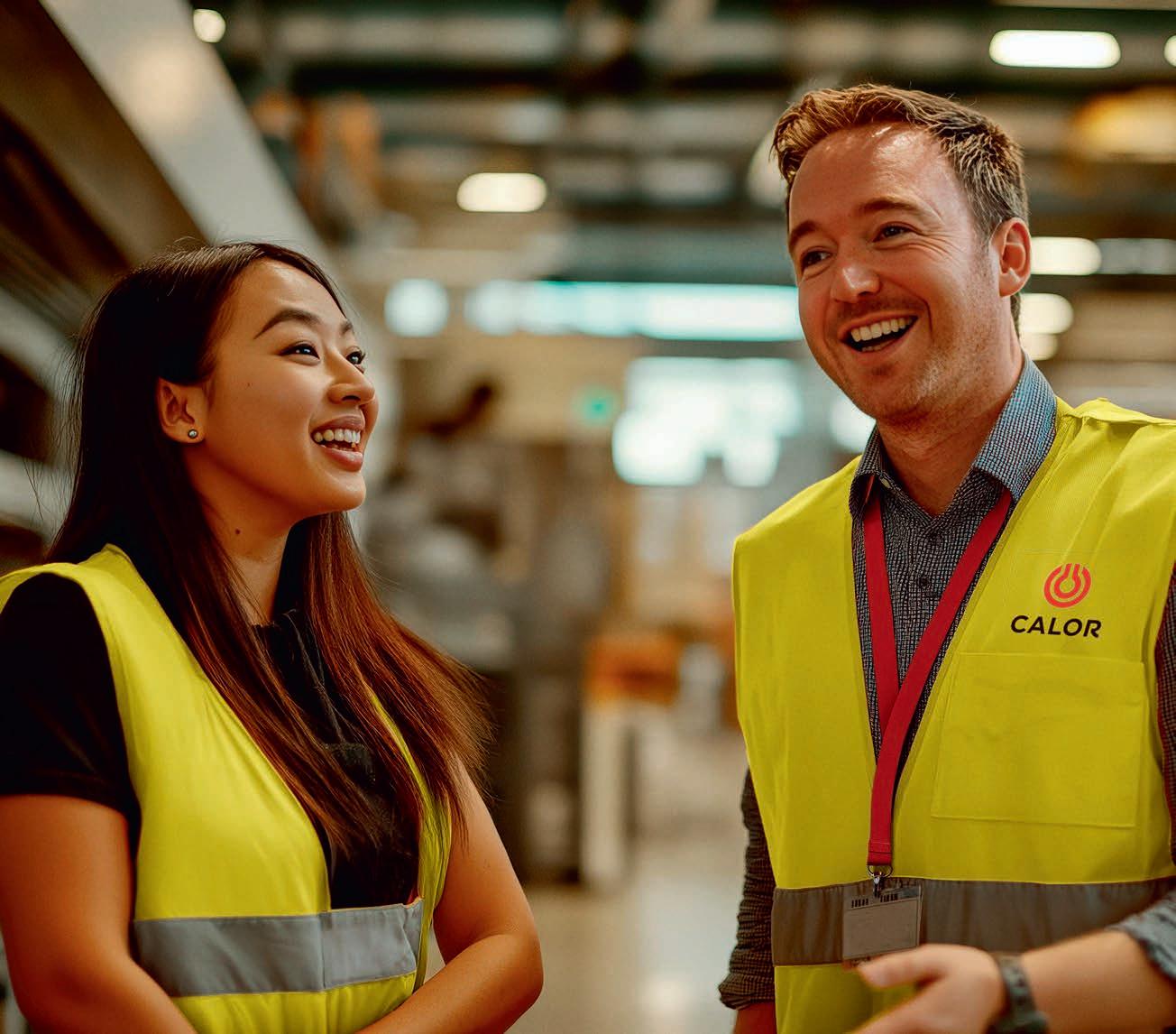
Take the first step on a cleaner, lower carbon journey with Calor’s renewable BioLPG energy. Calor offer a range of flexible energy solutions that can help businesses cut emissions by up to 80%*.
Find out more about BioLPG at calorgas.ie.
Convenient travel from the of Belfast to the UK, Europe, and beyond heart The energy that connects us.
